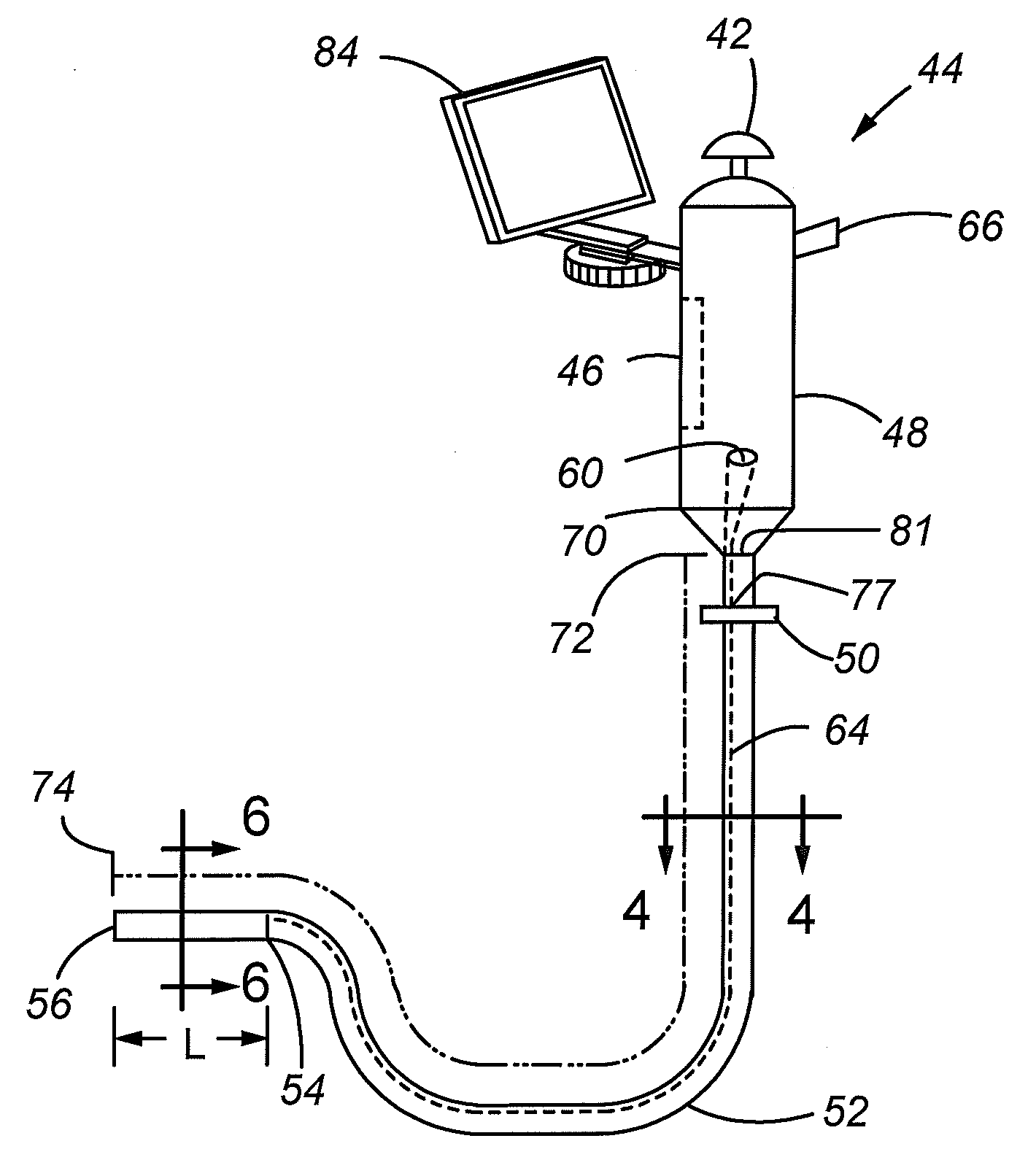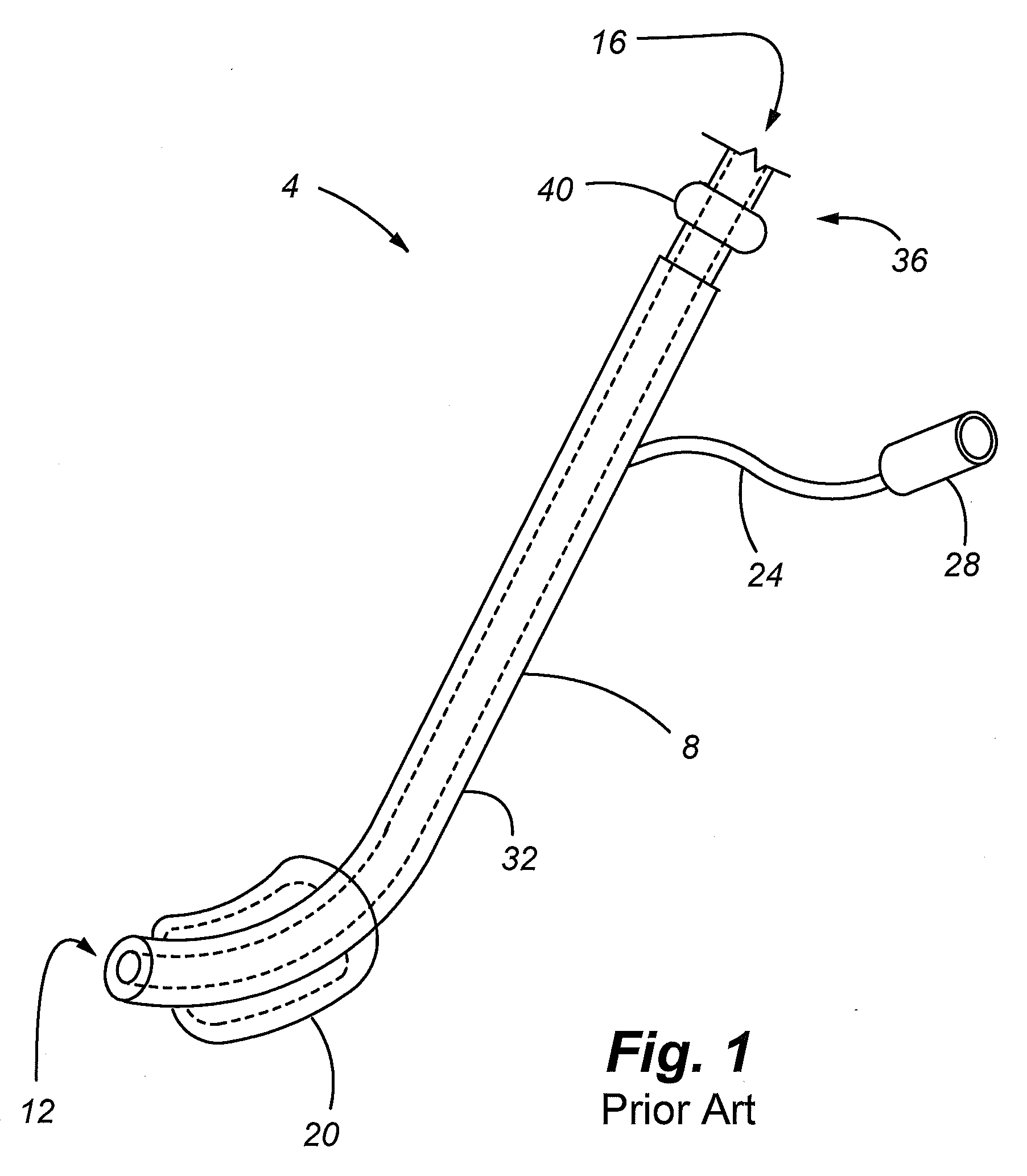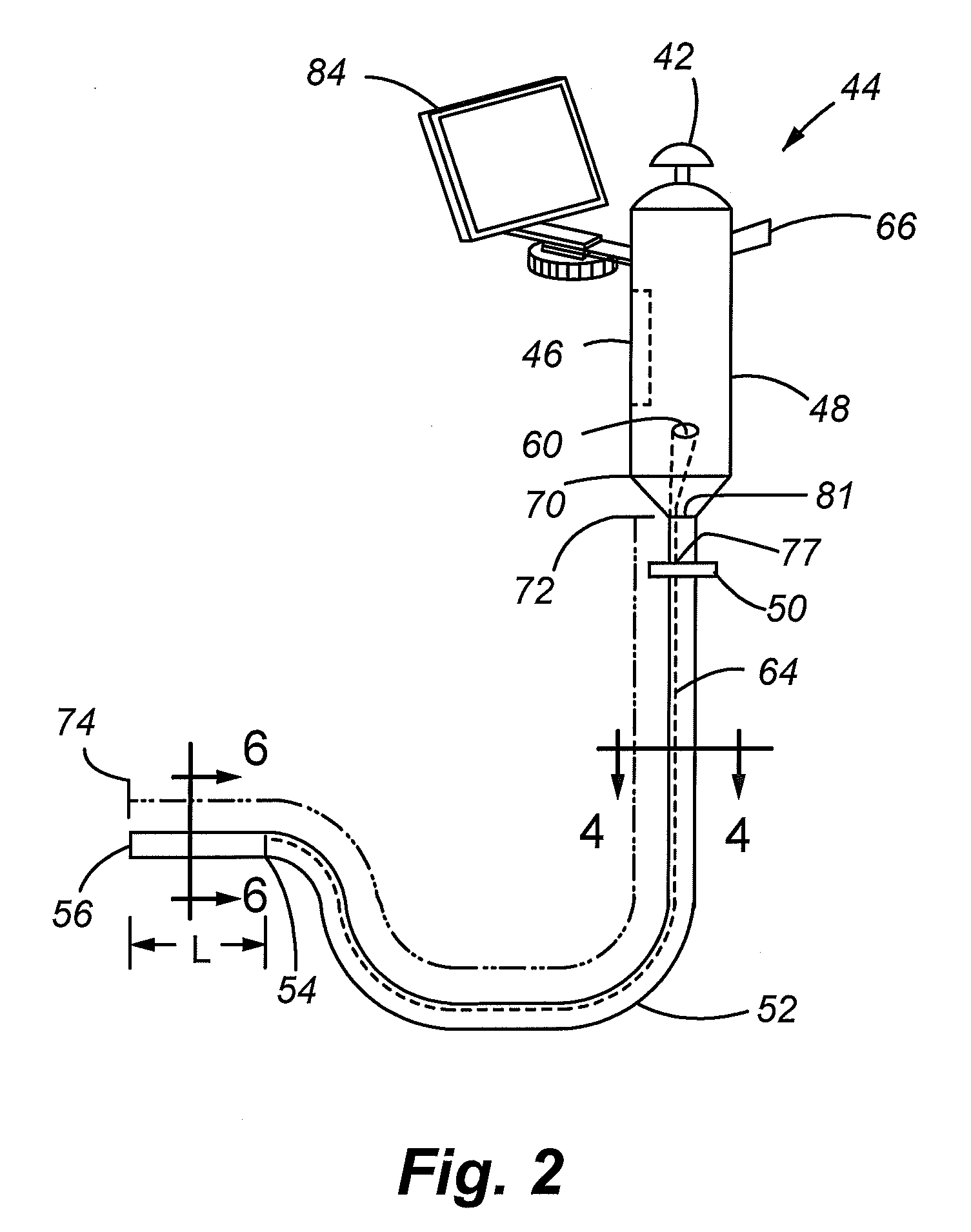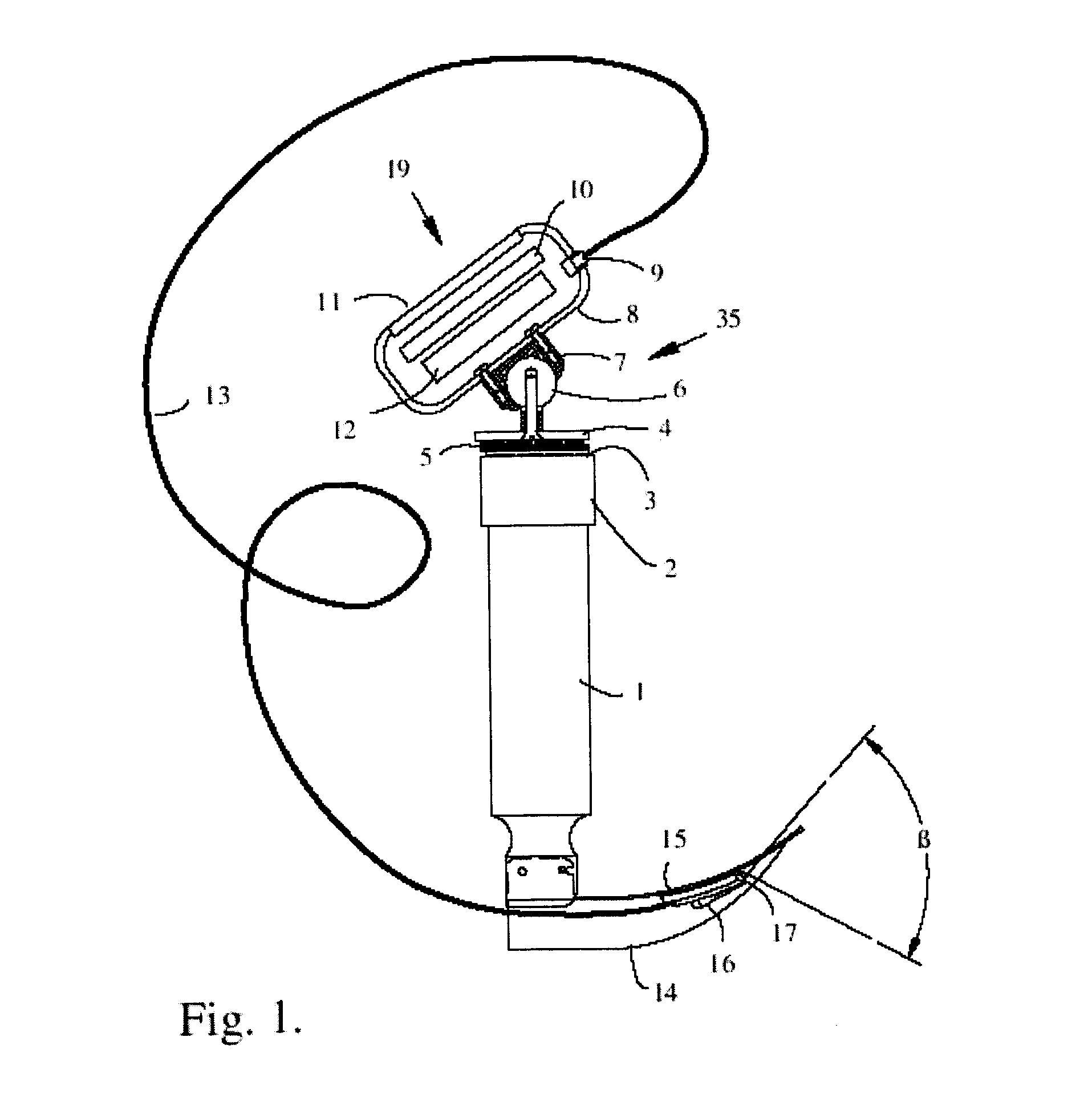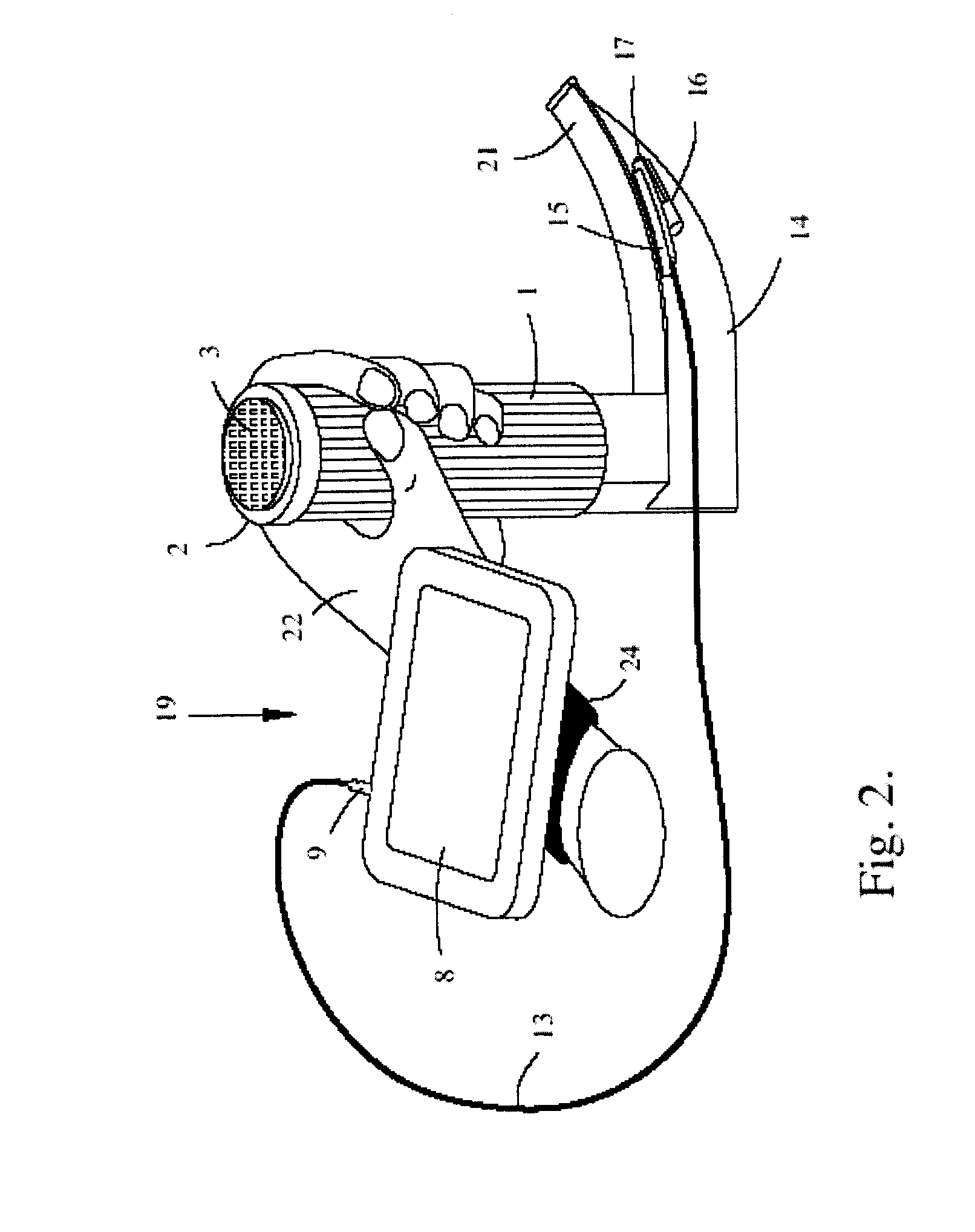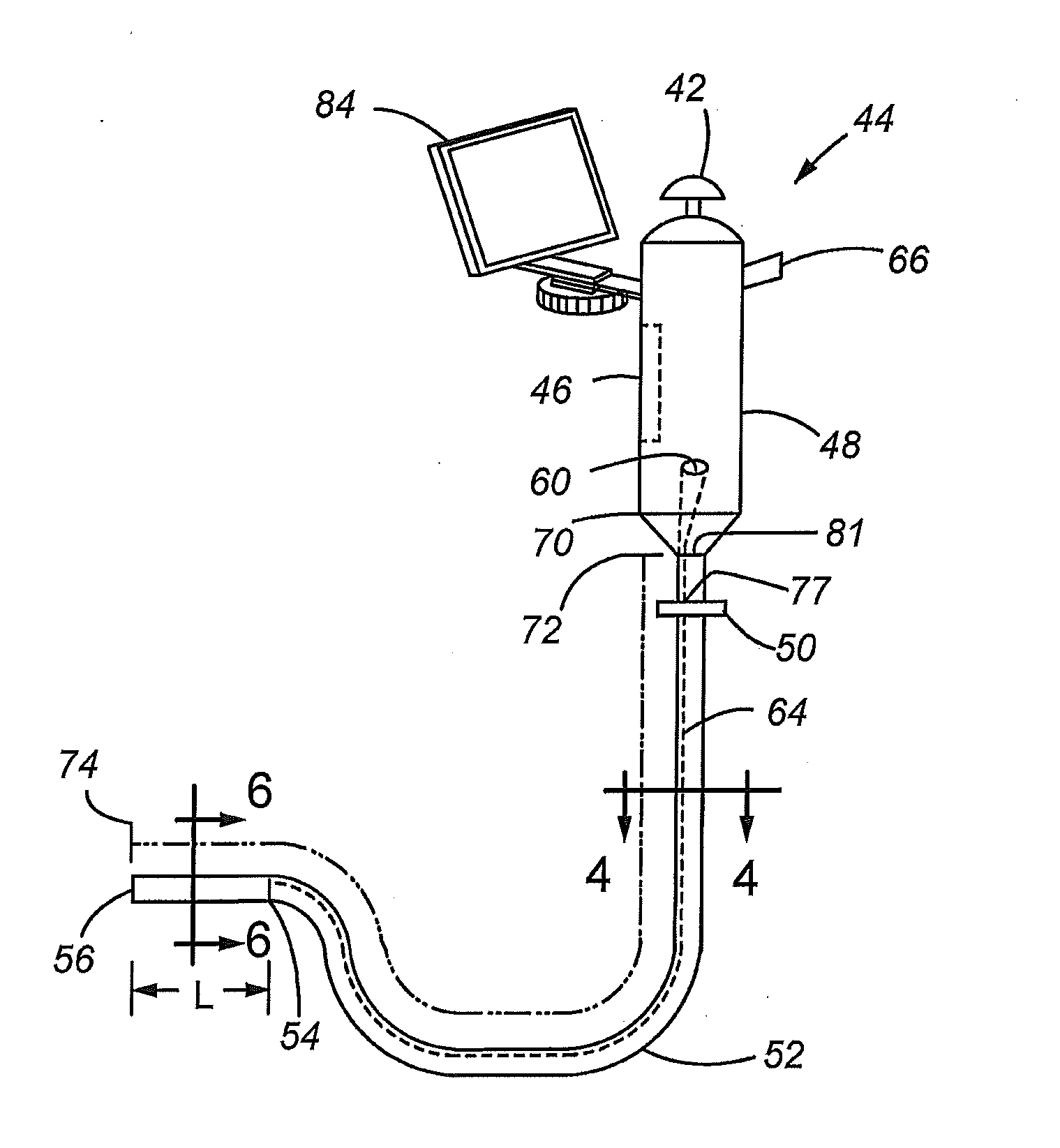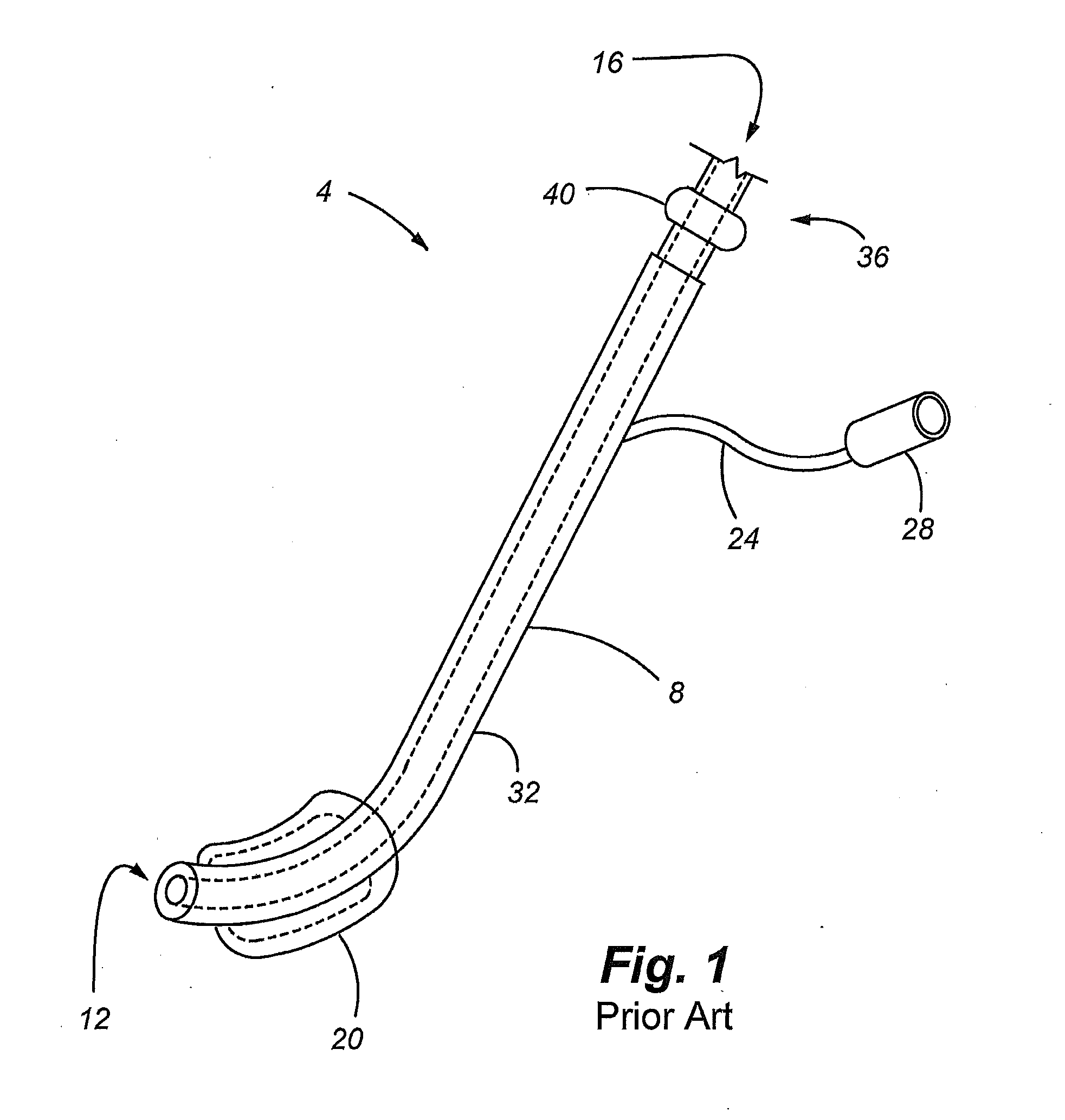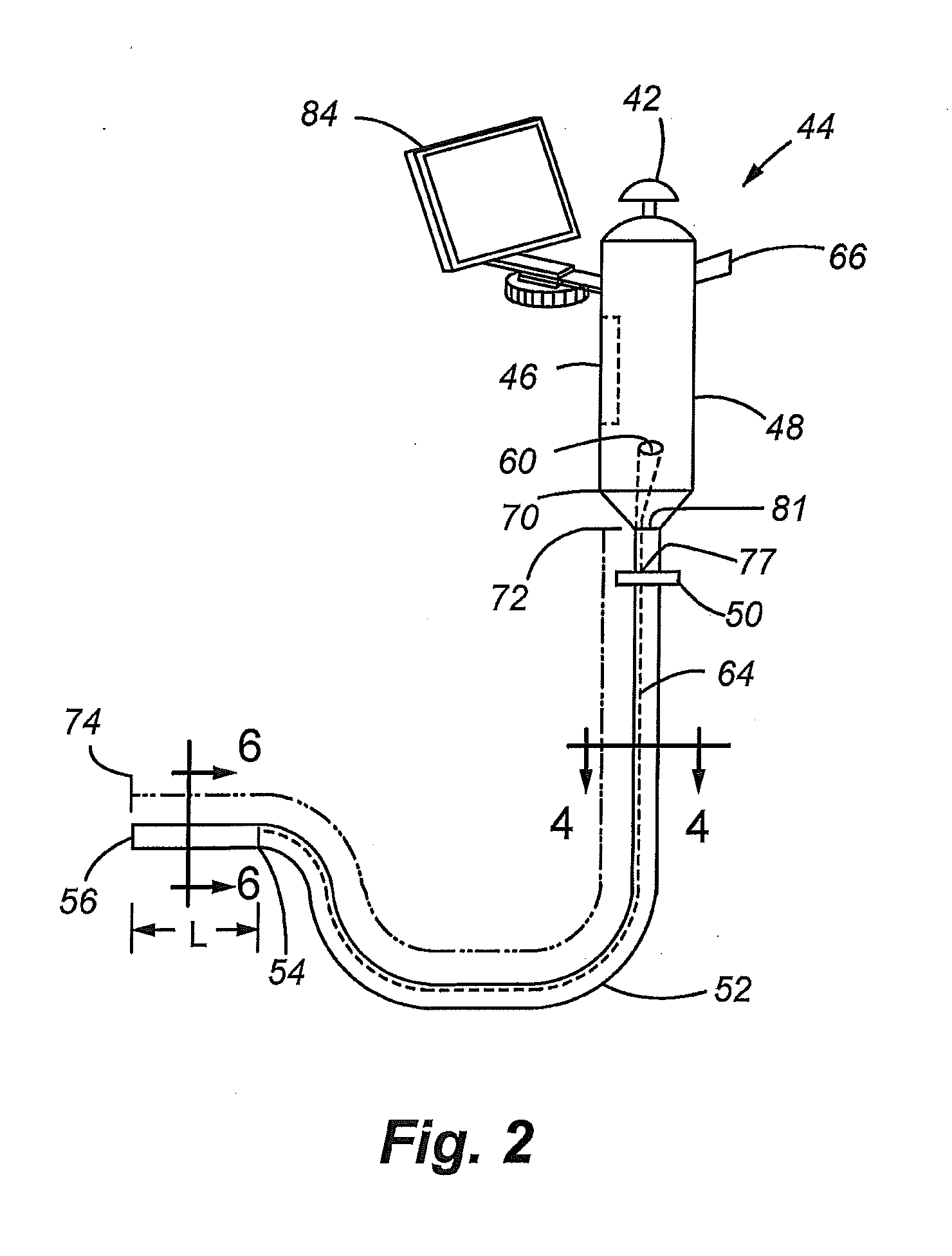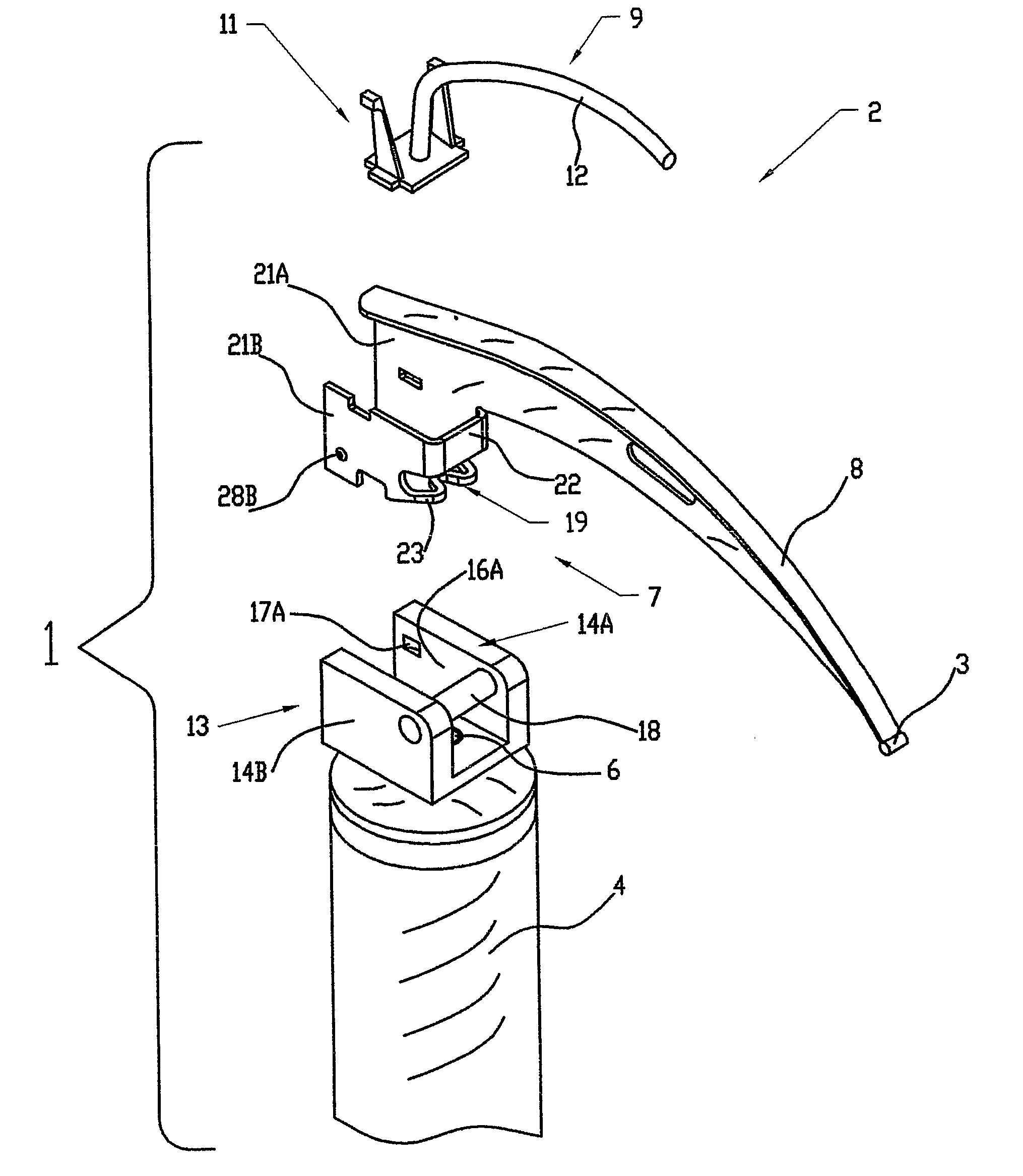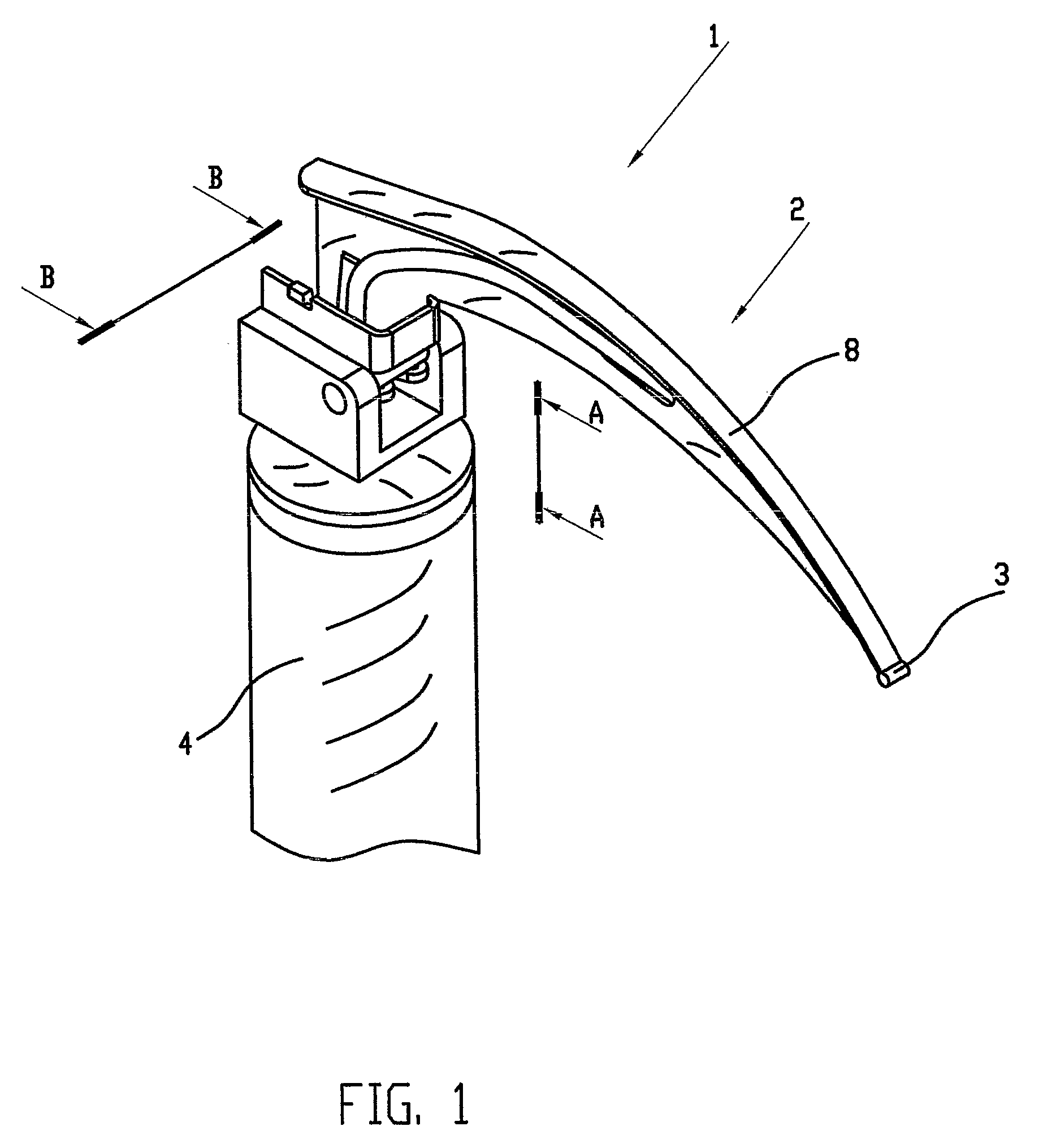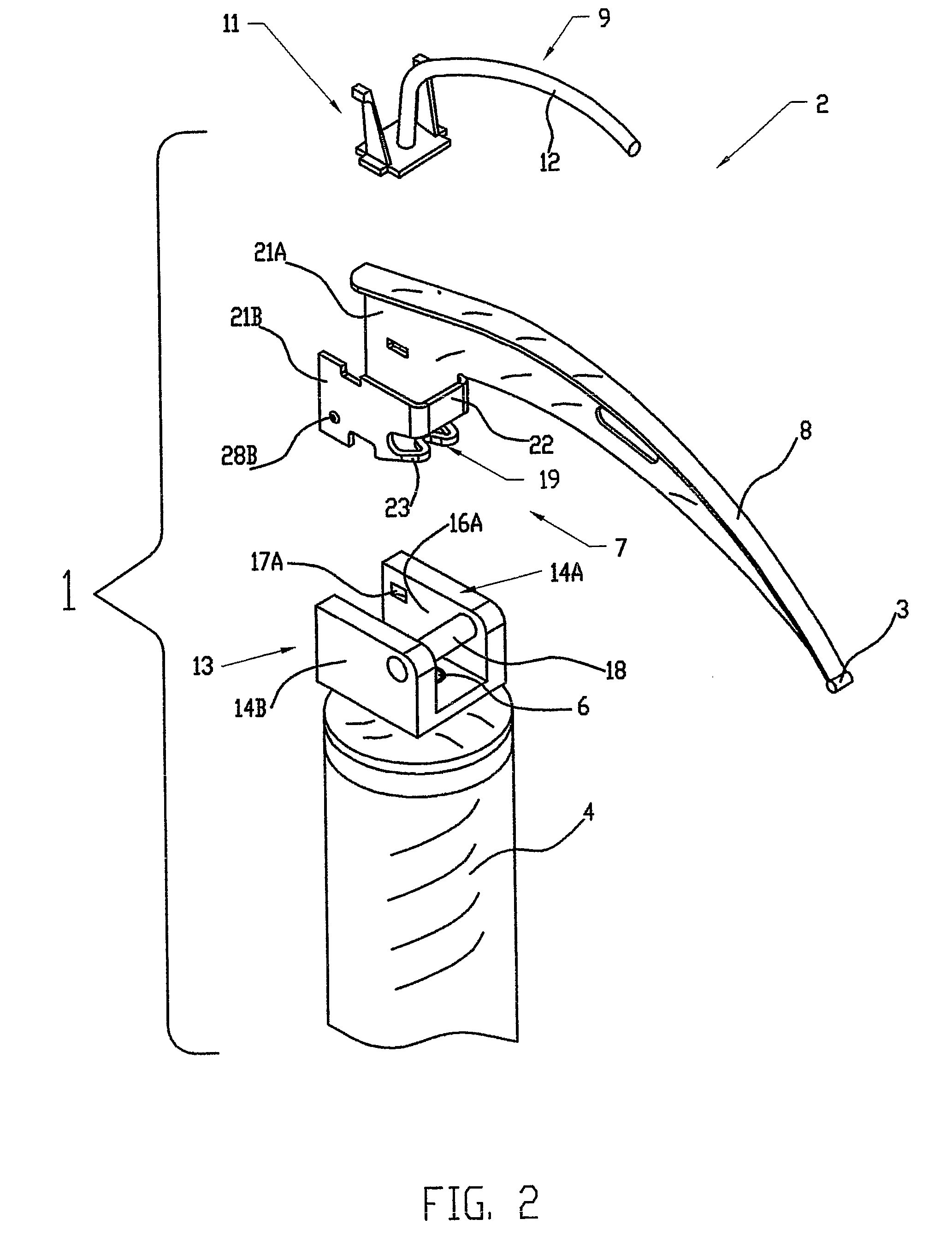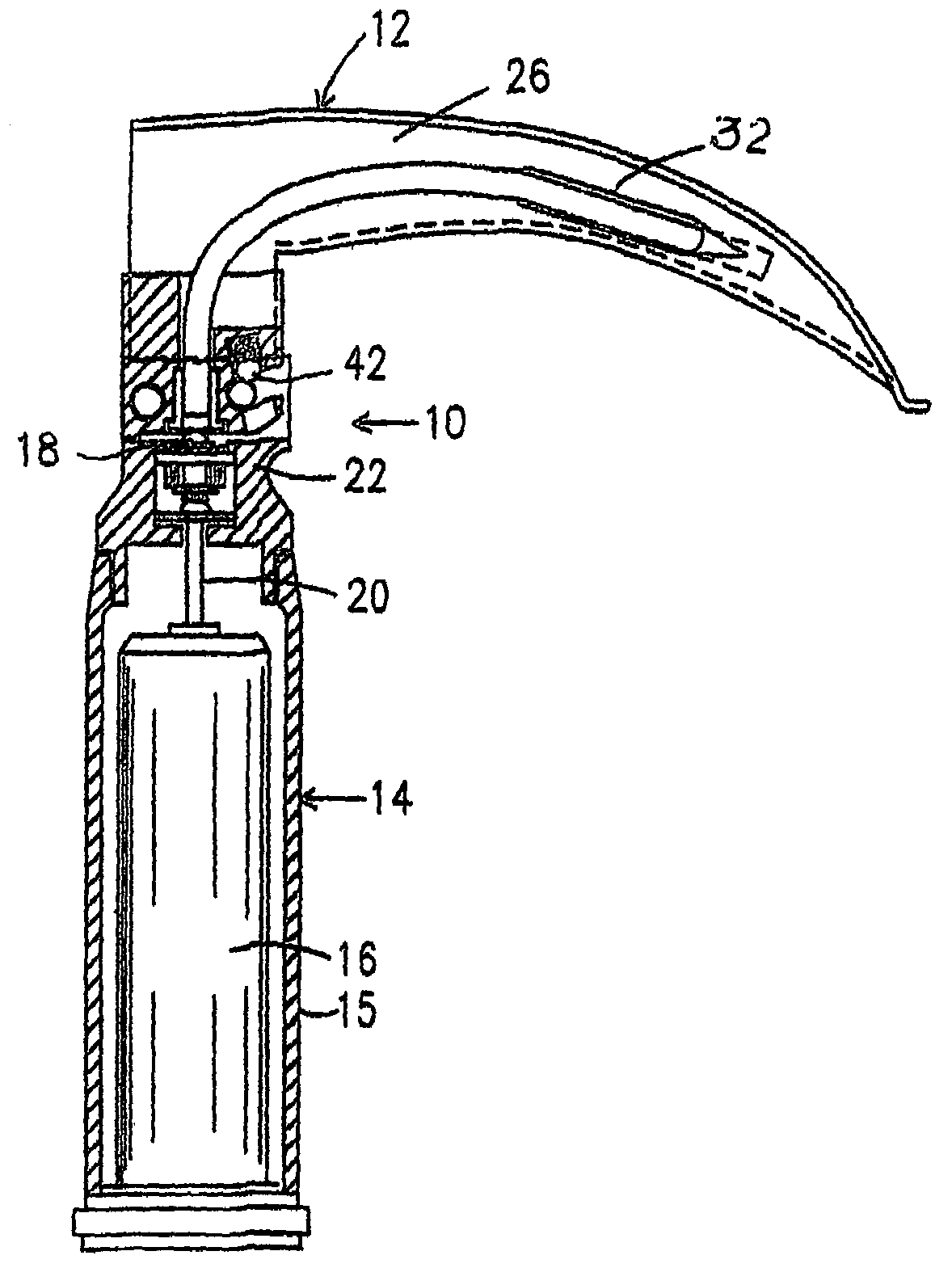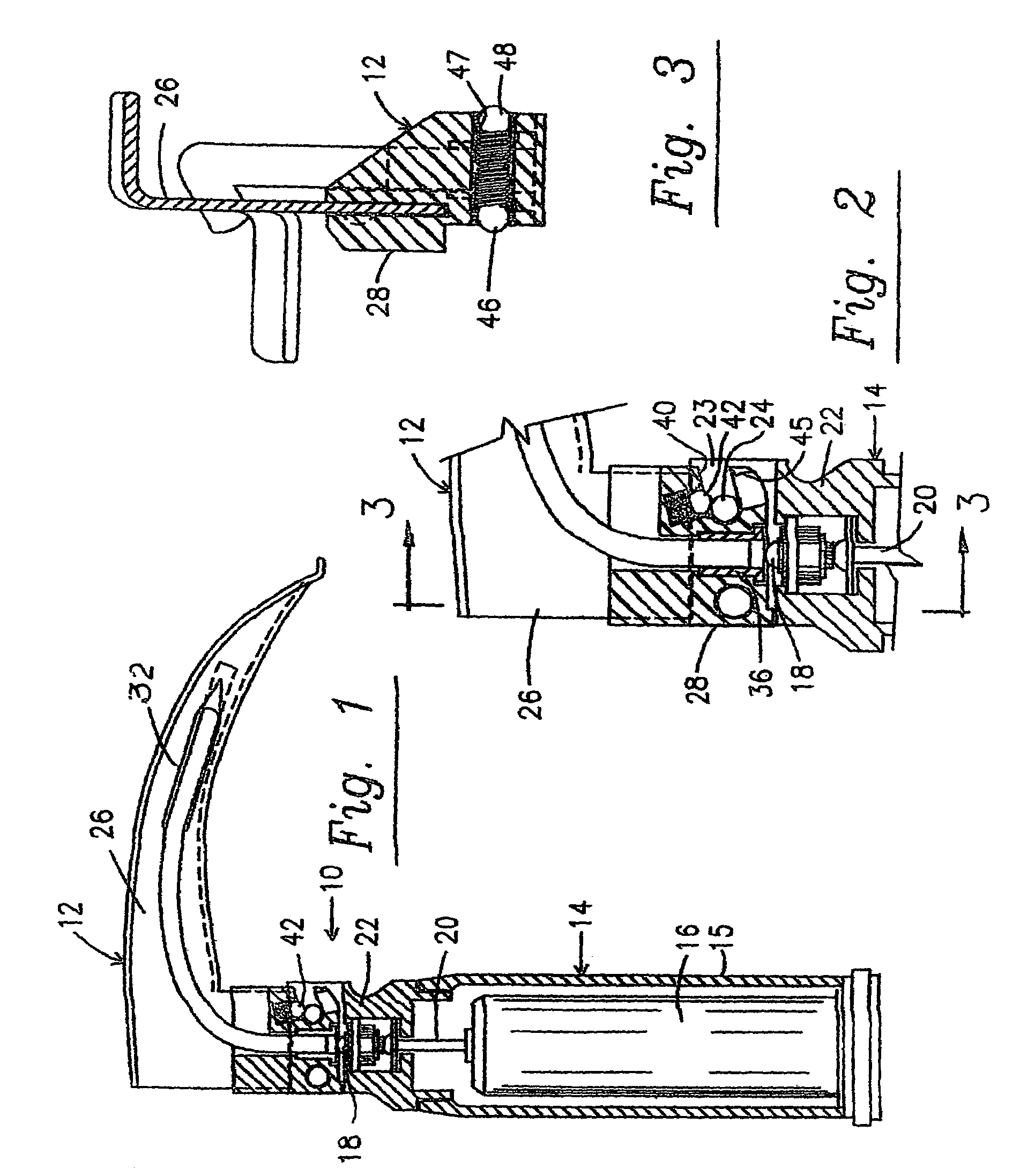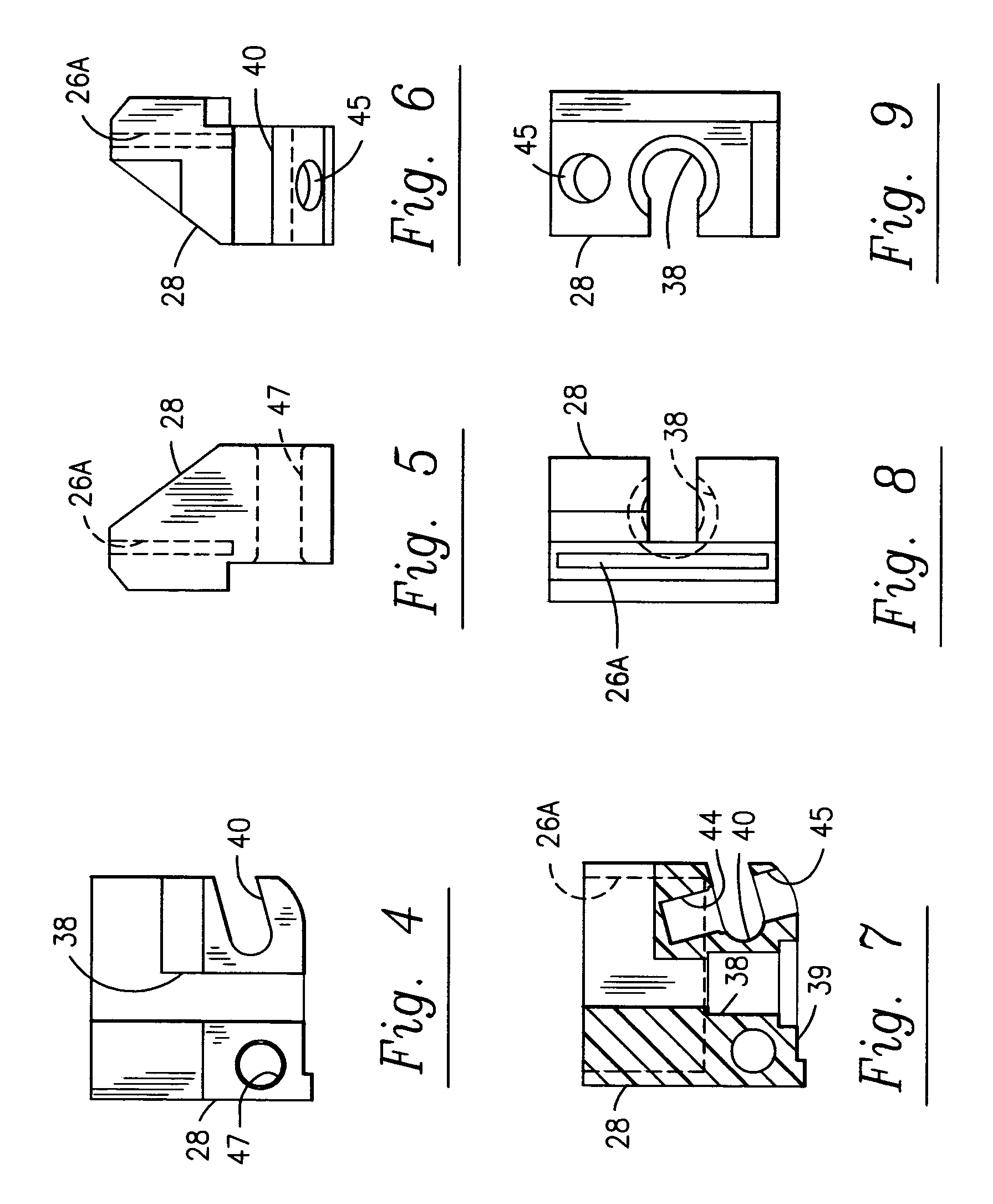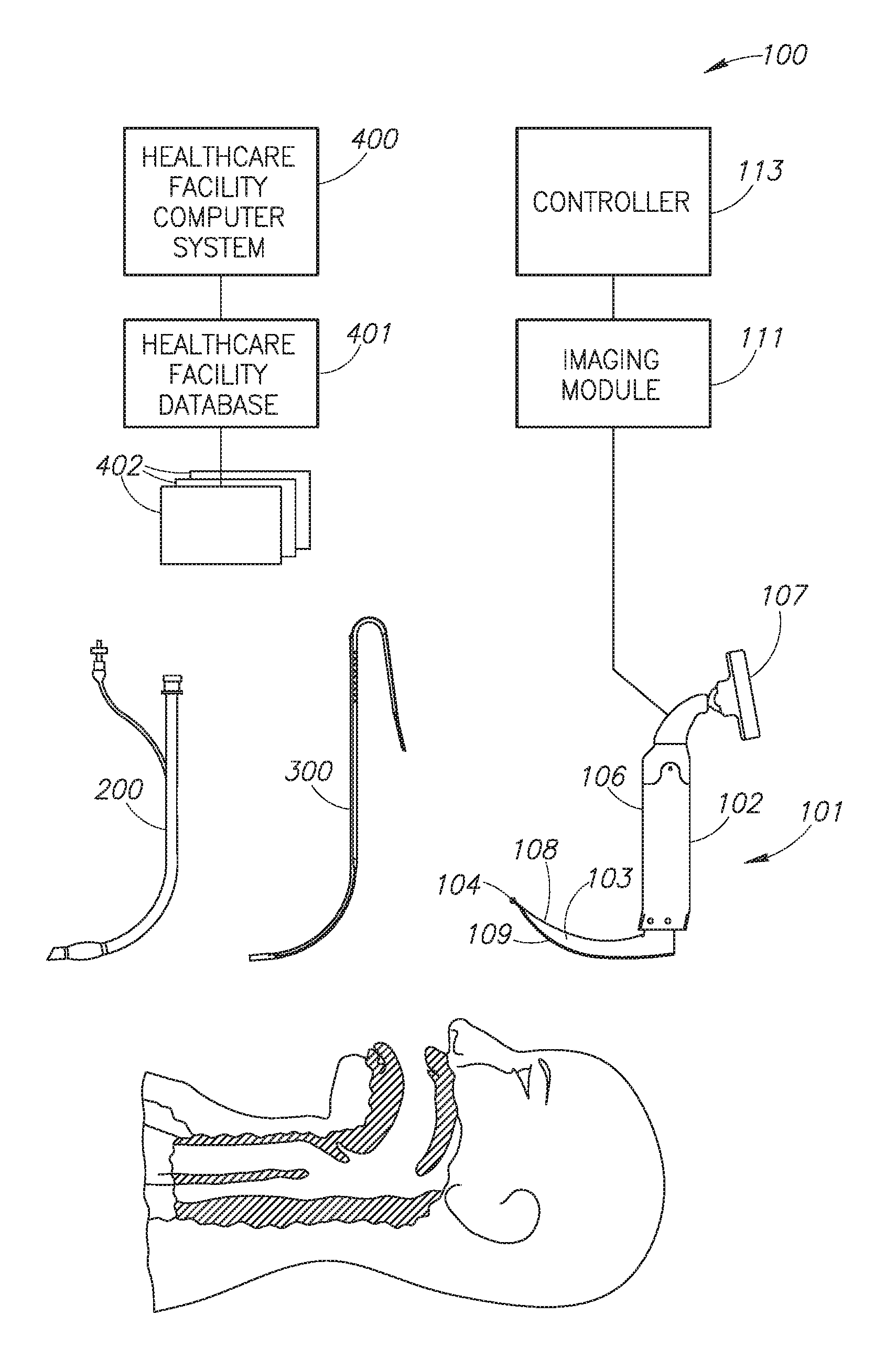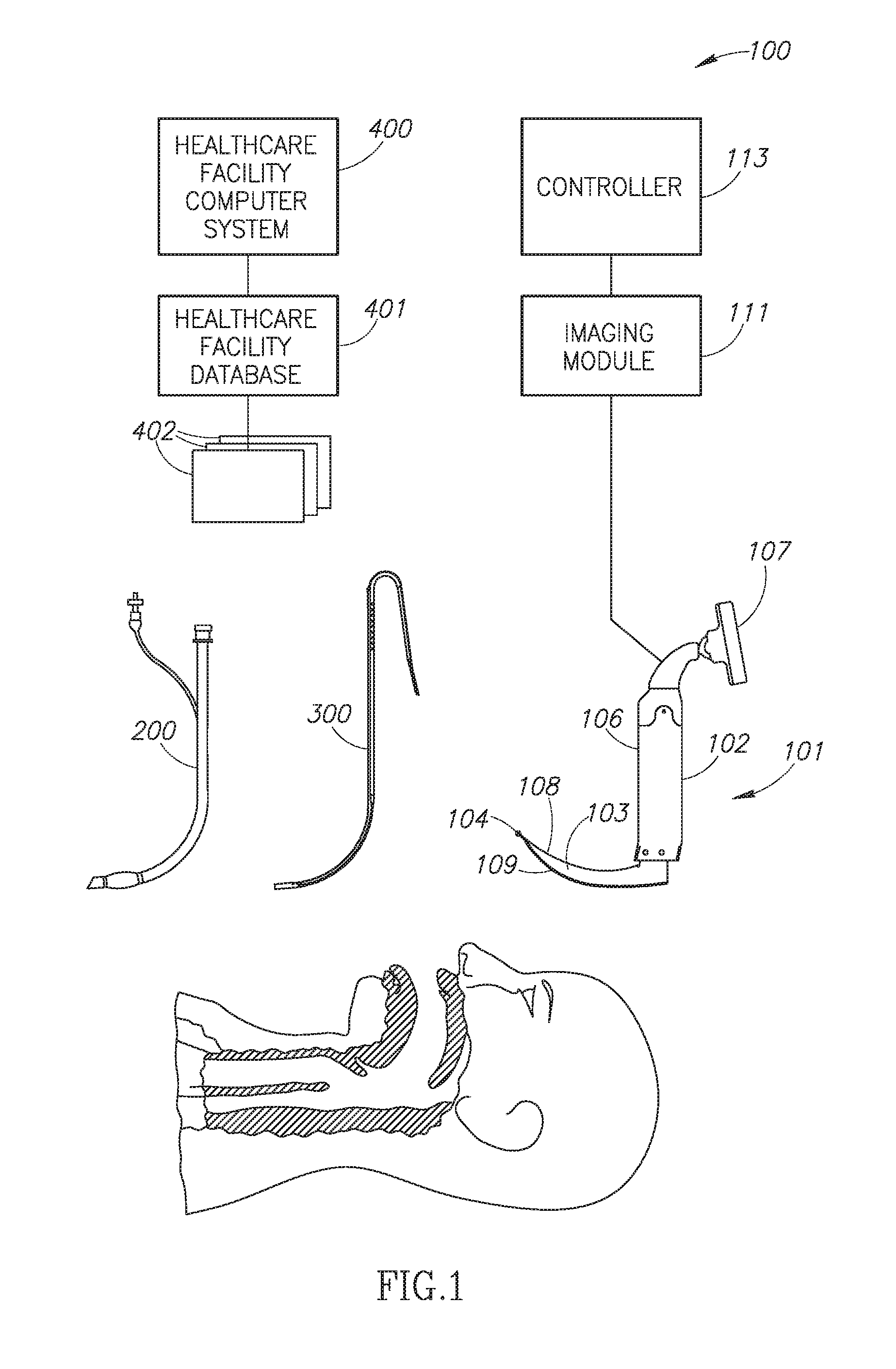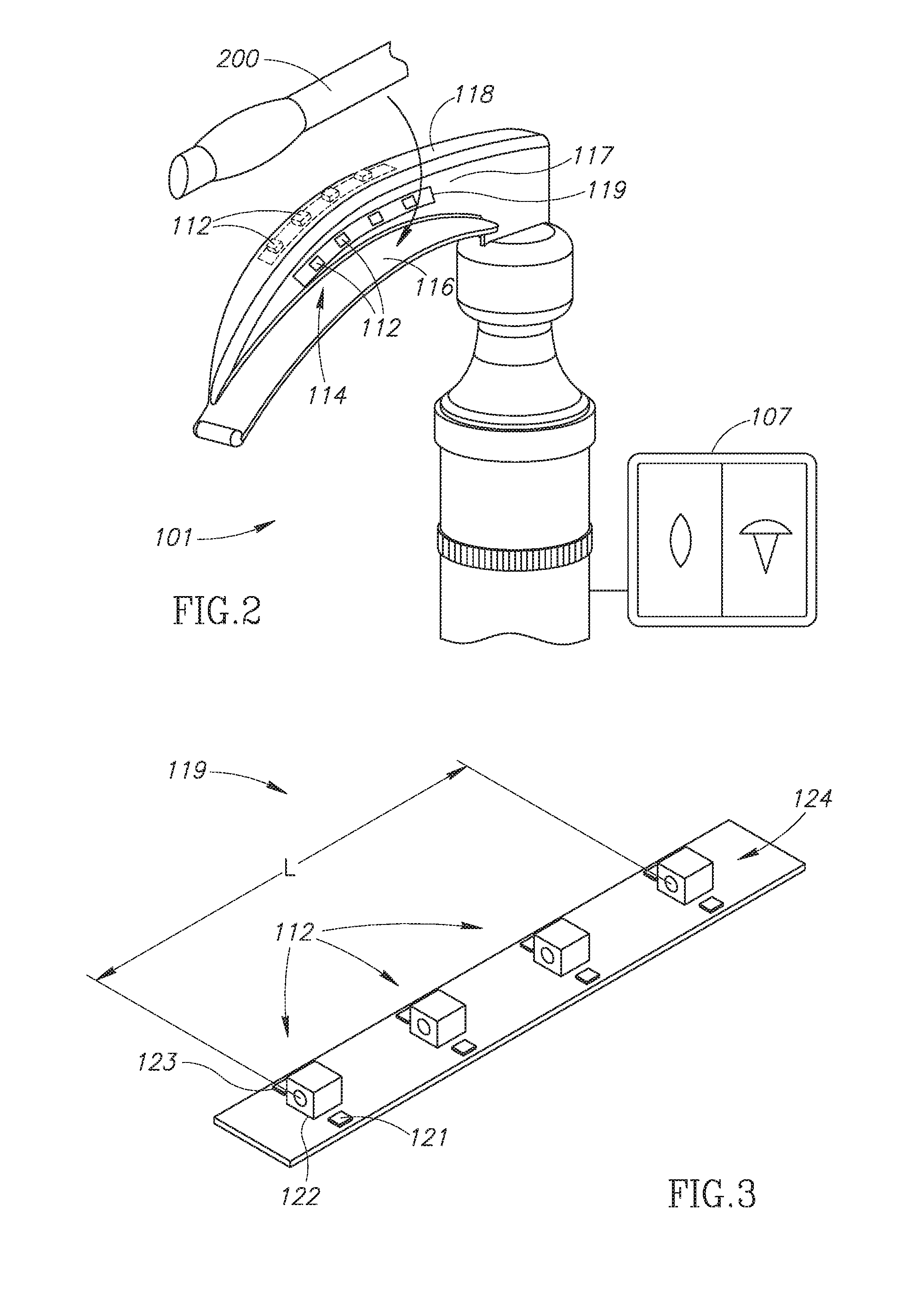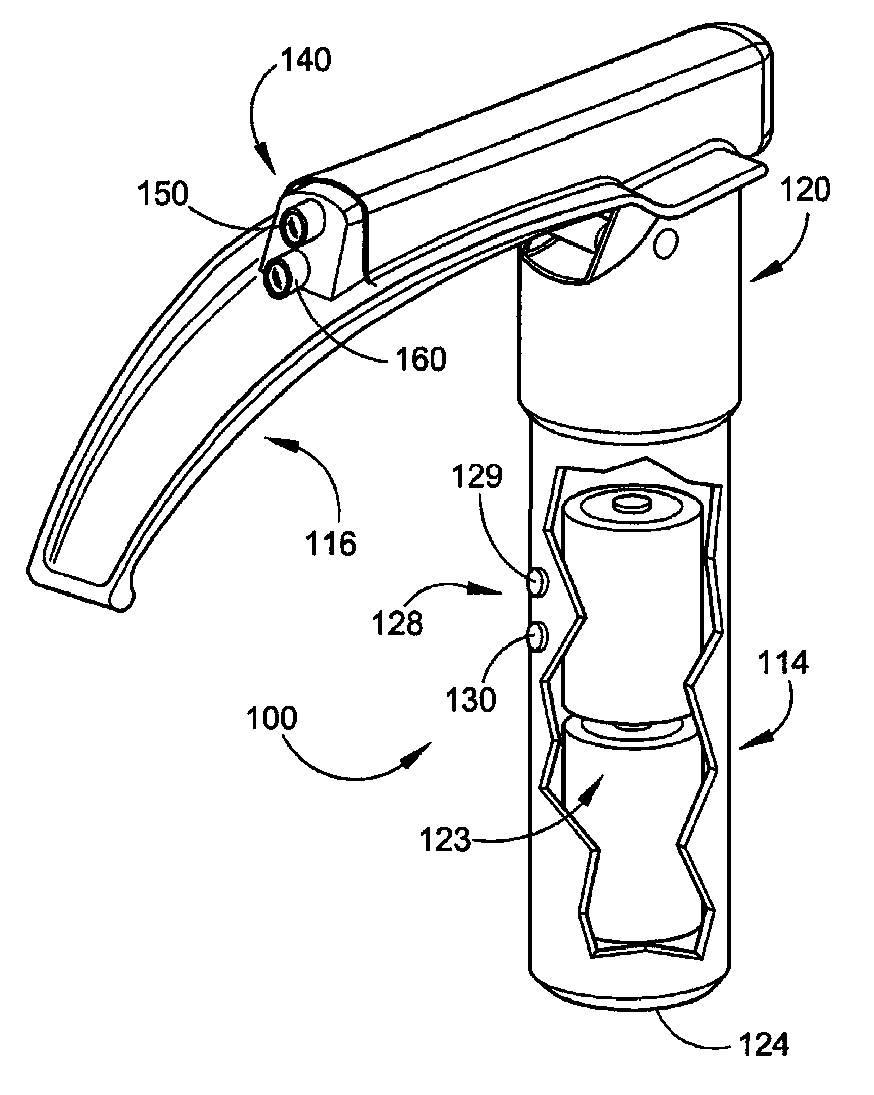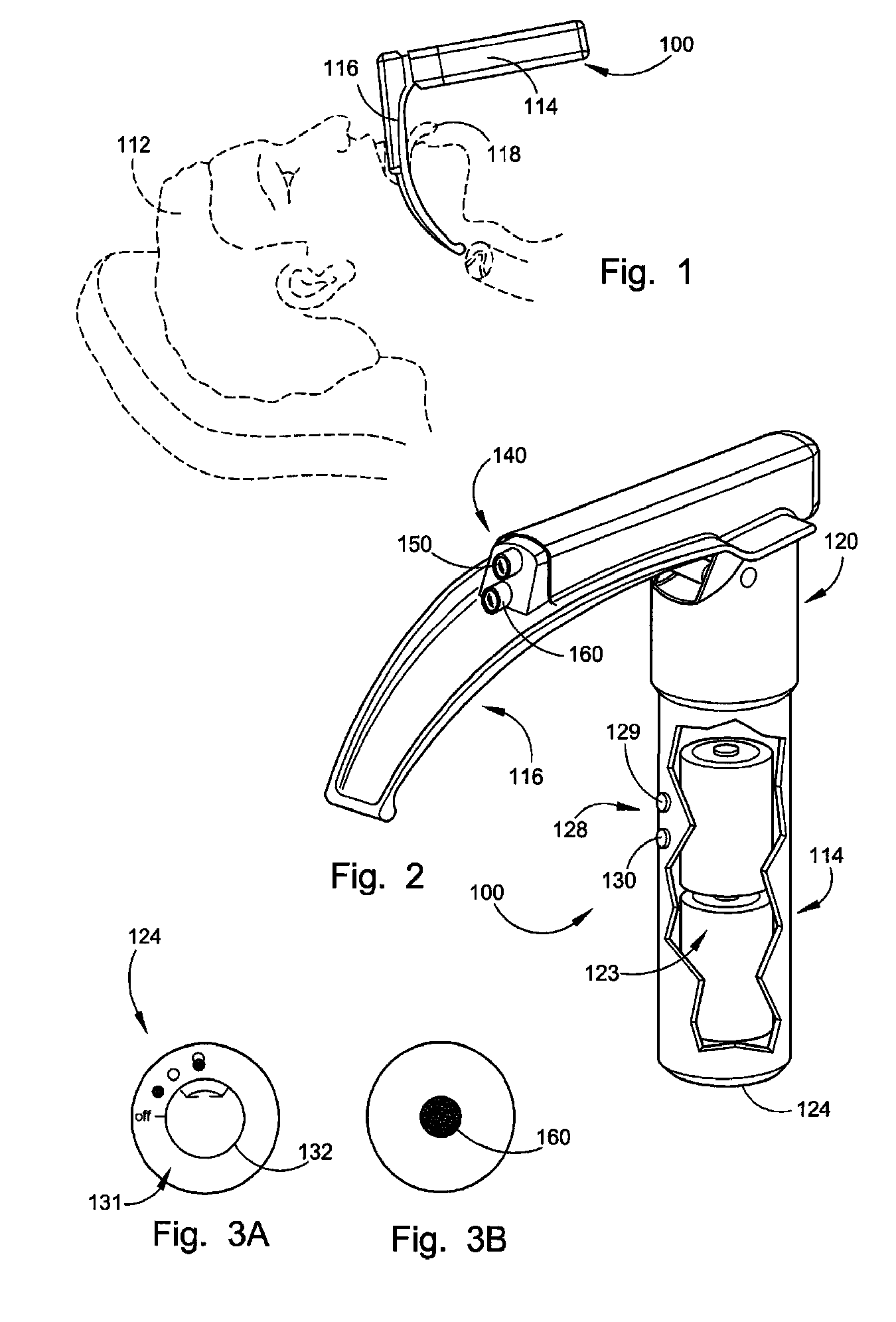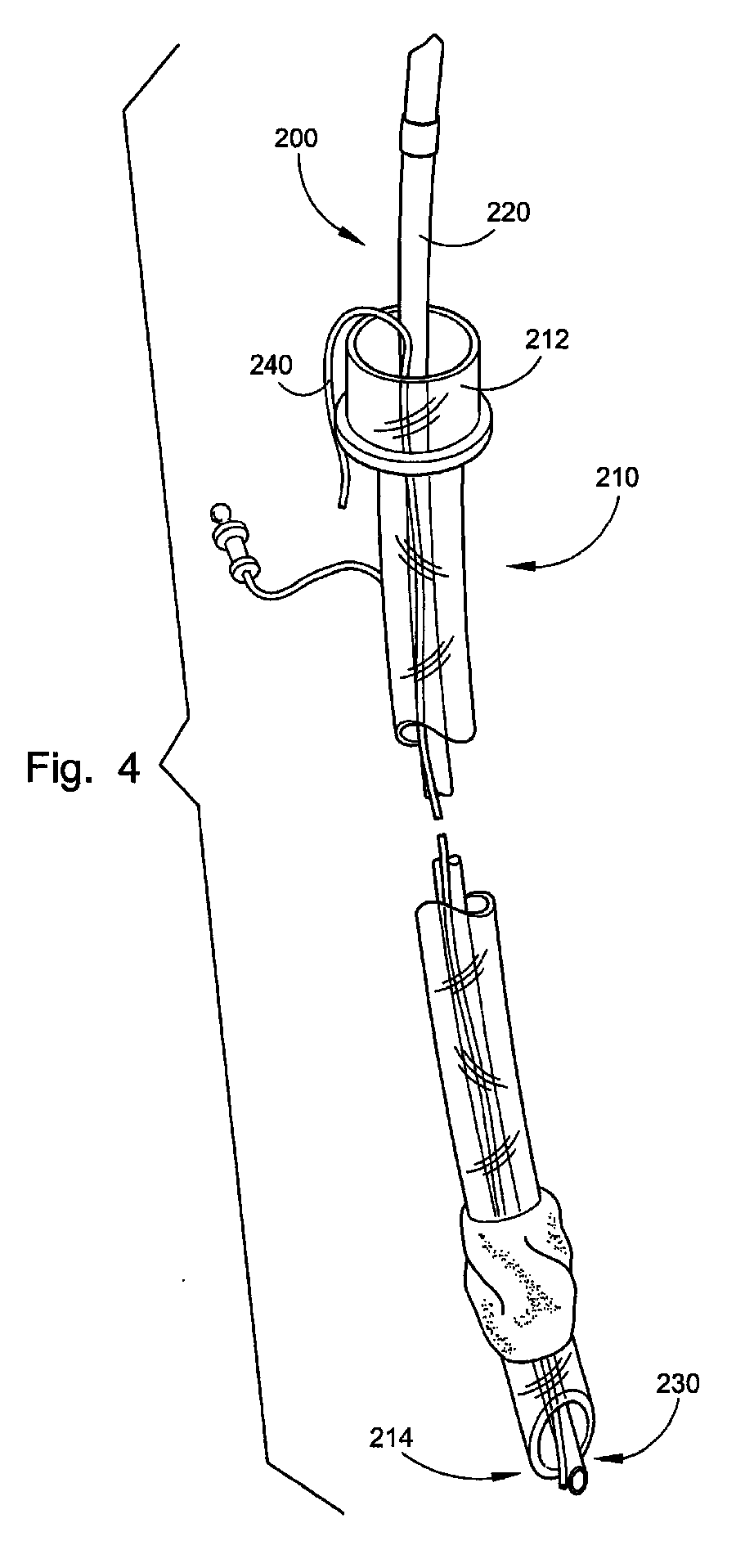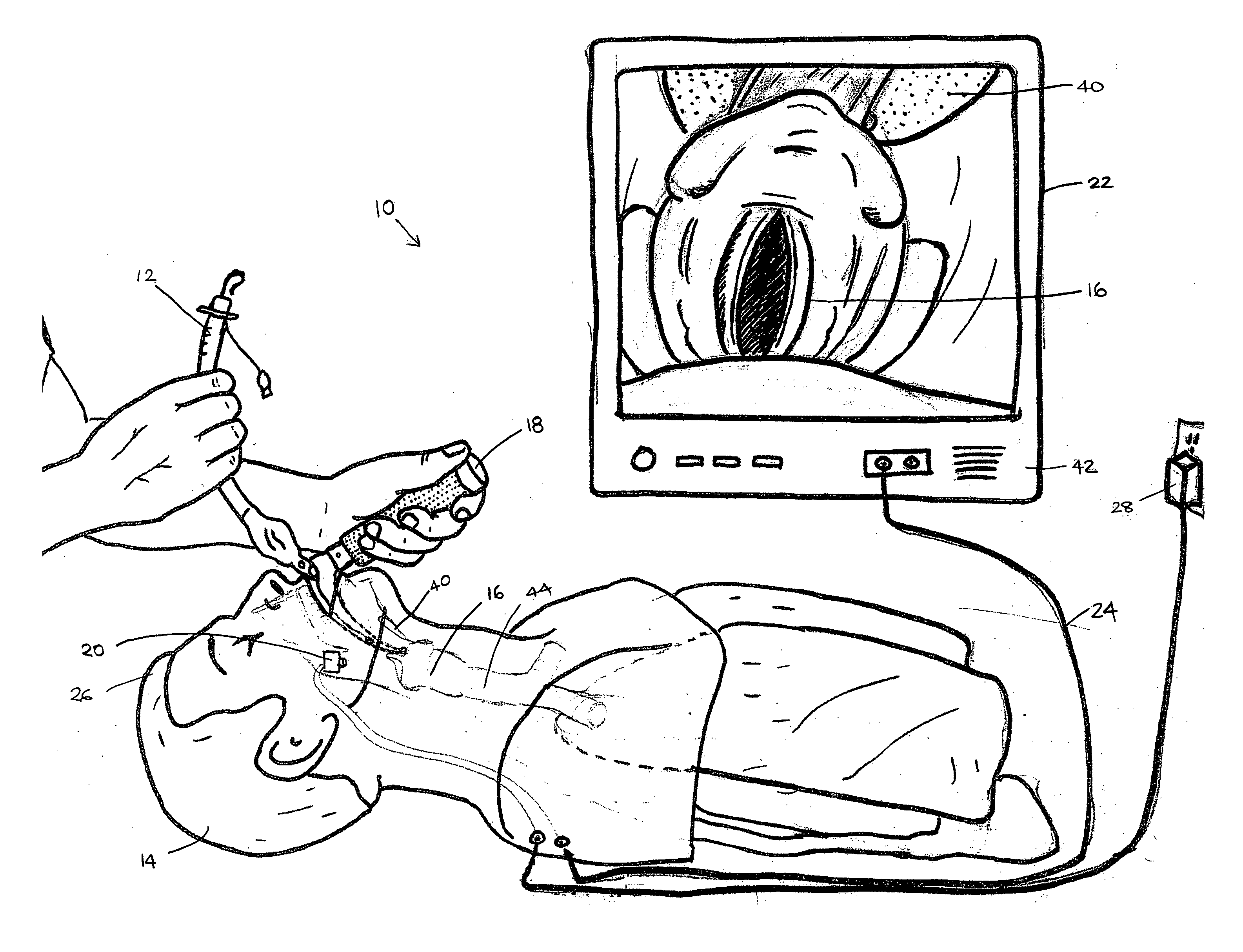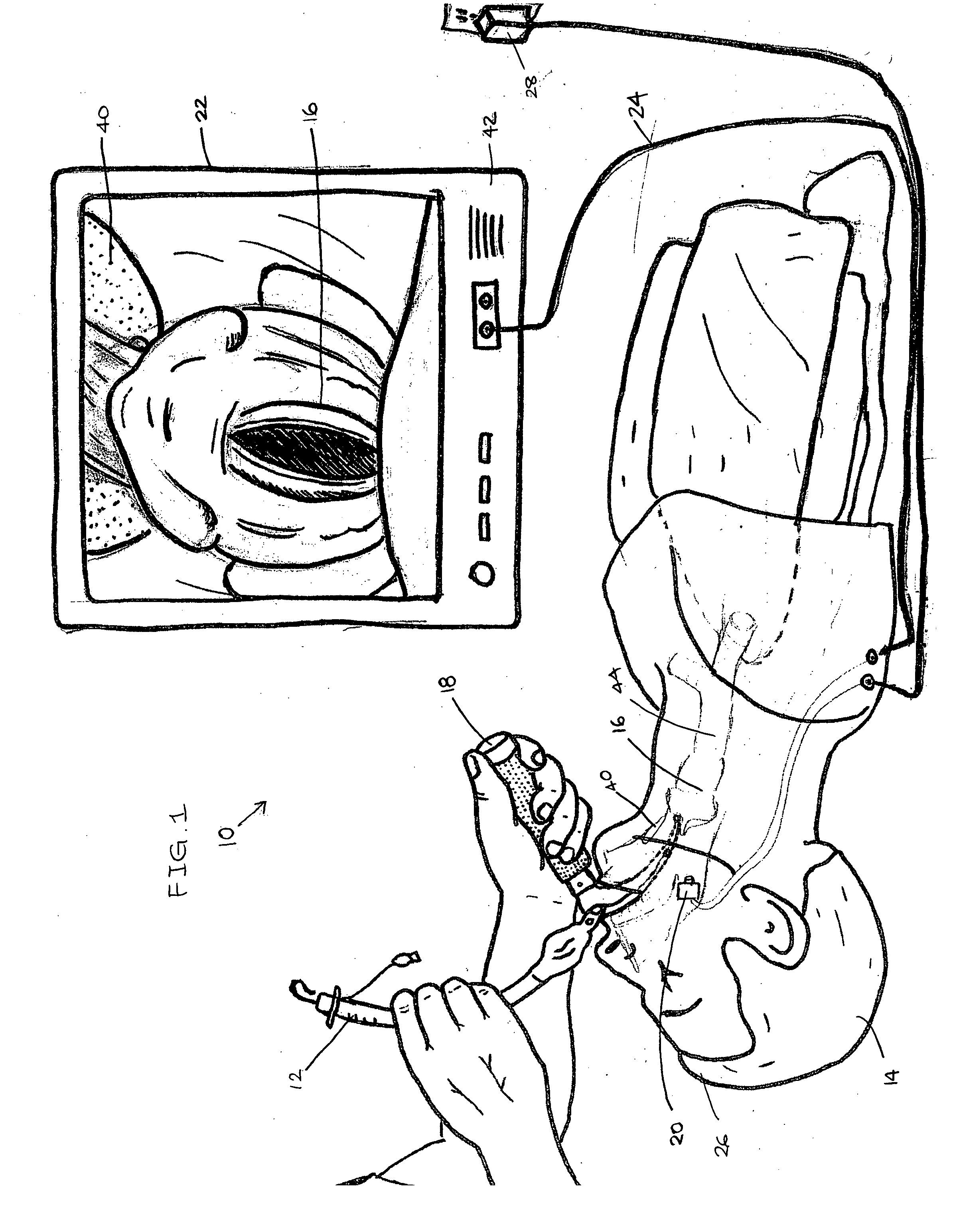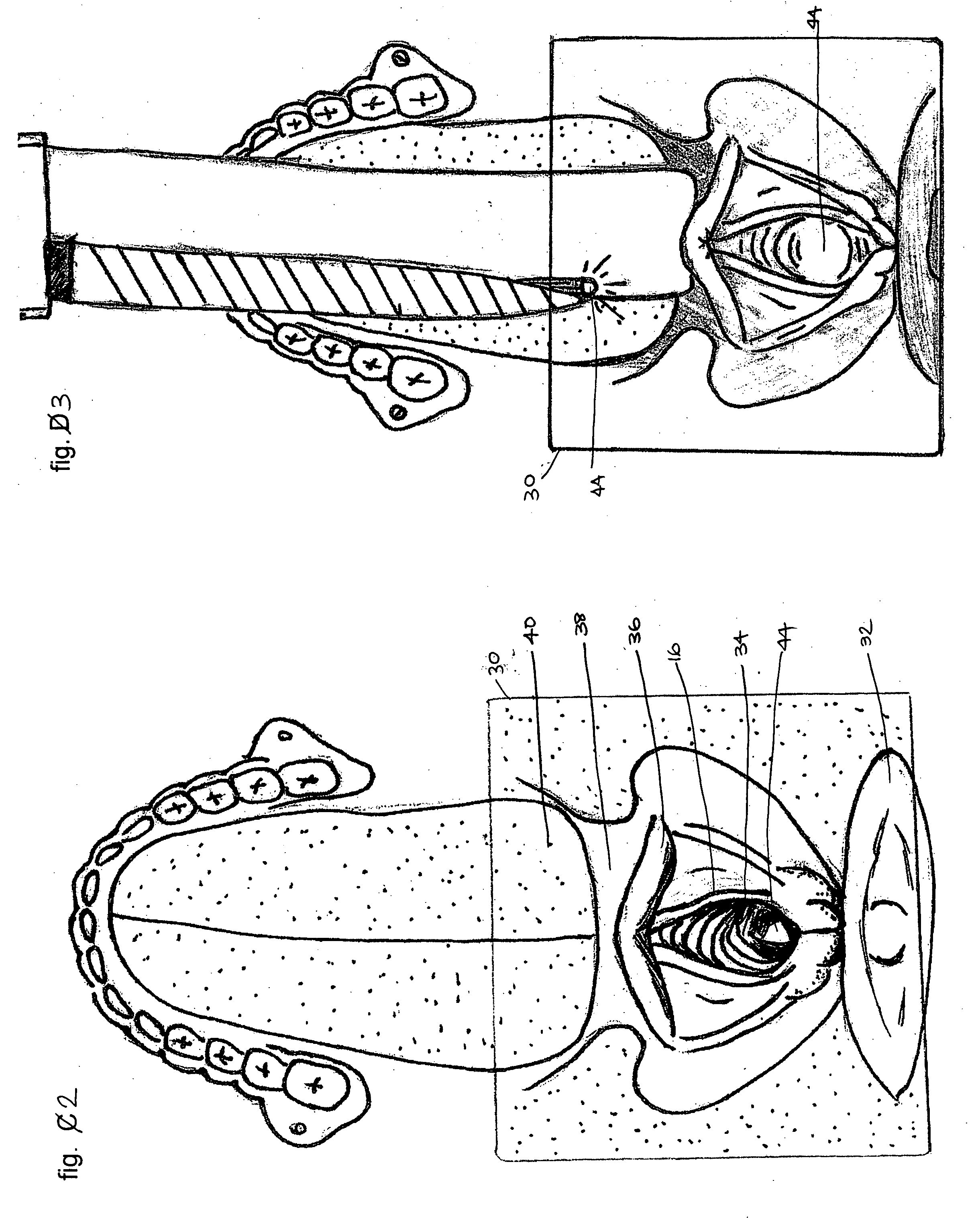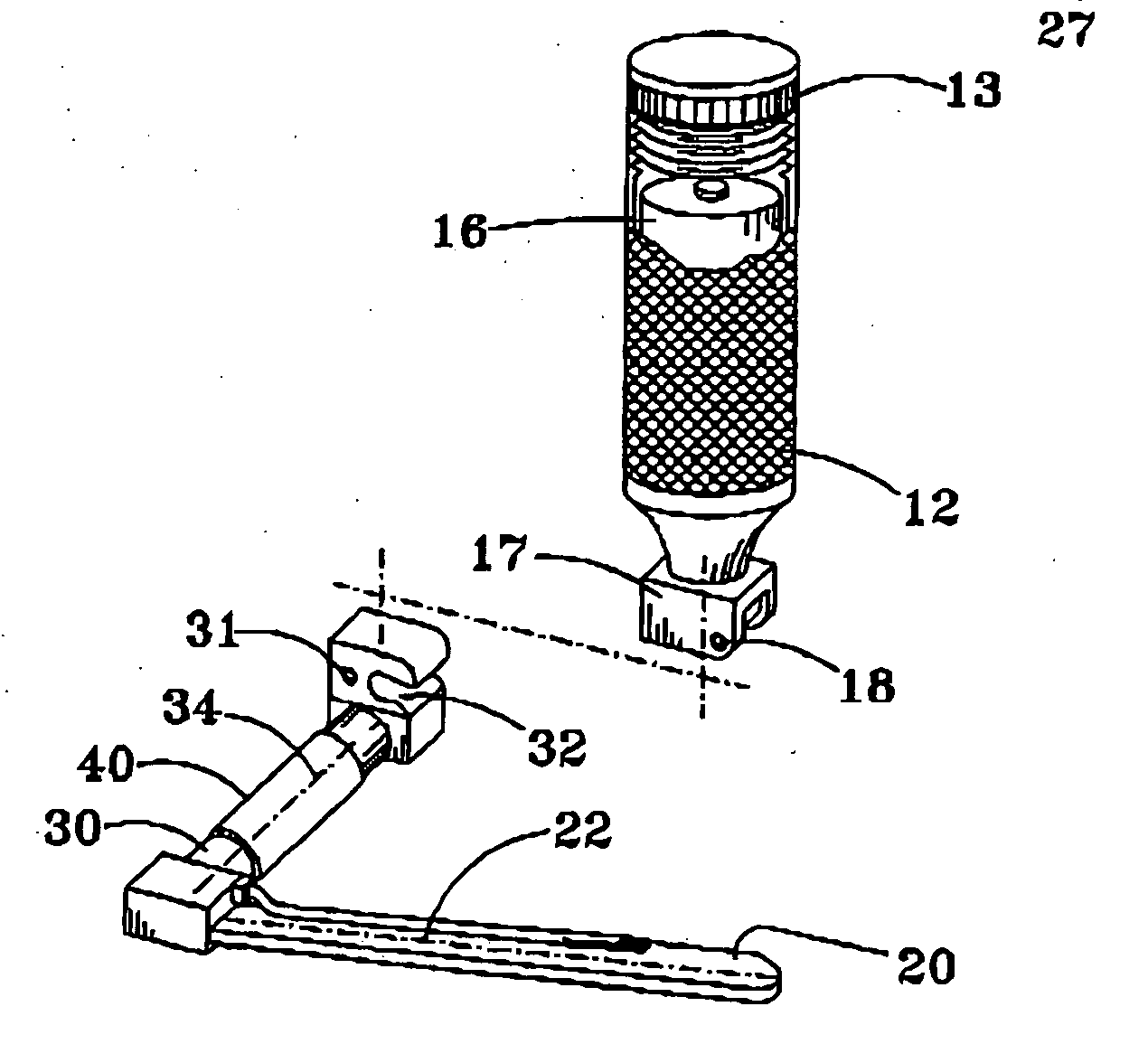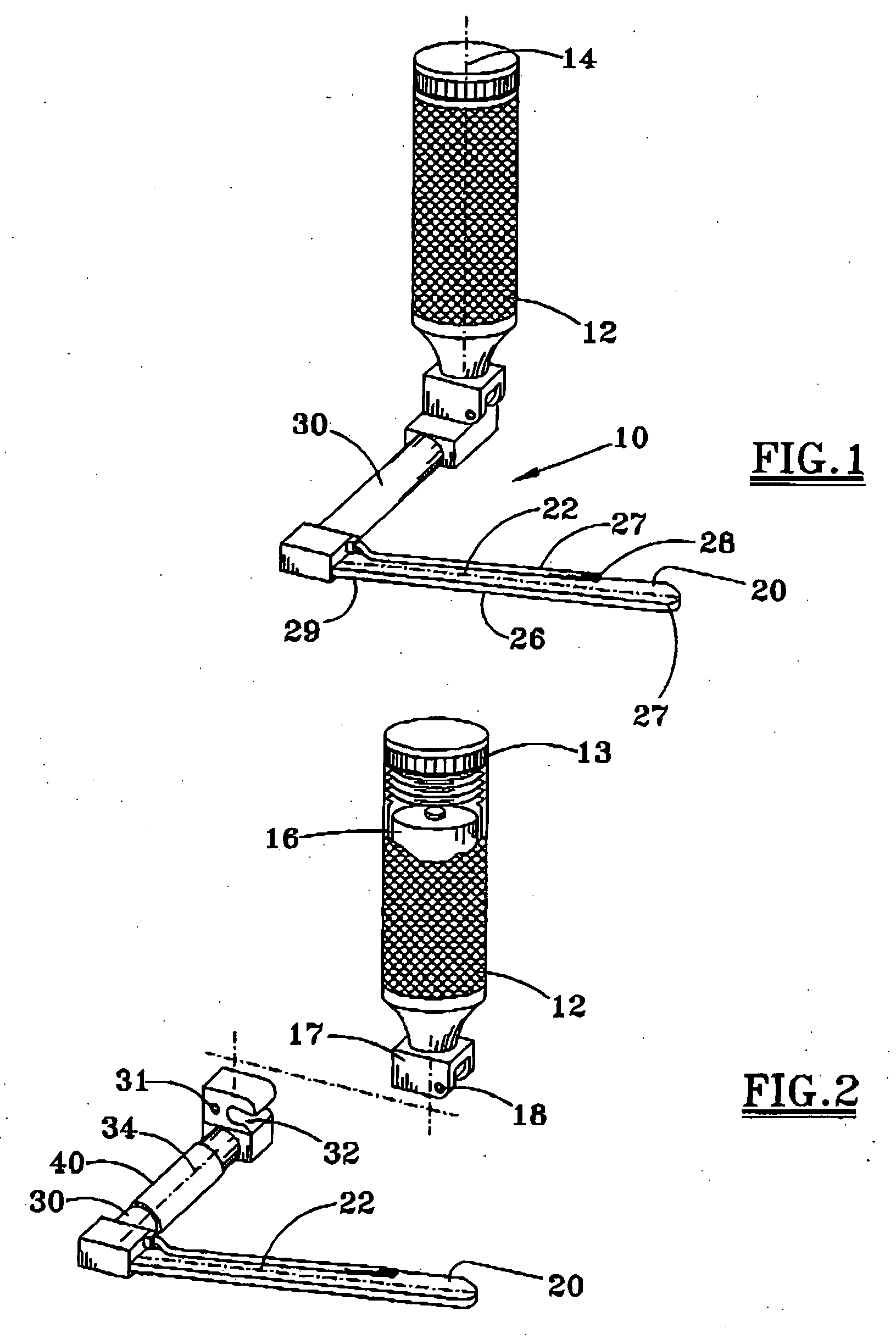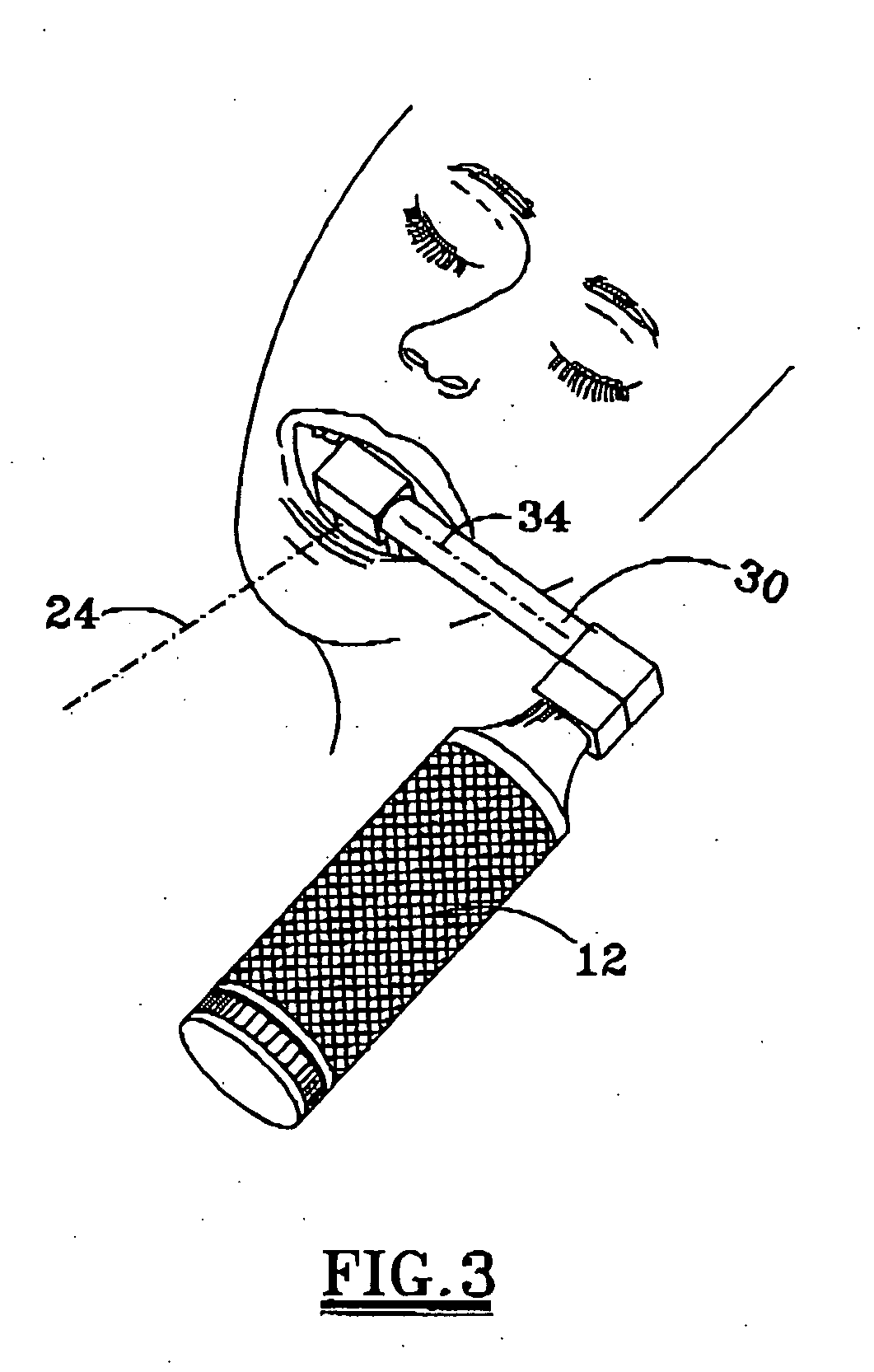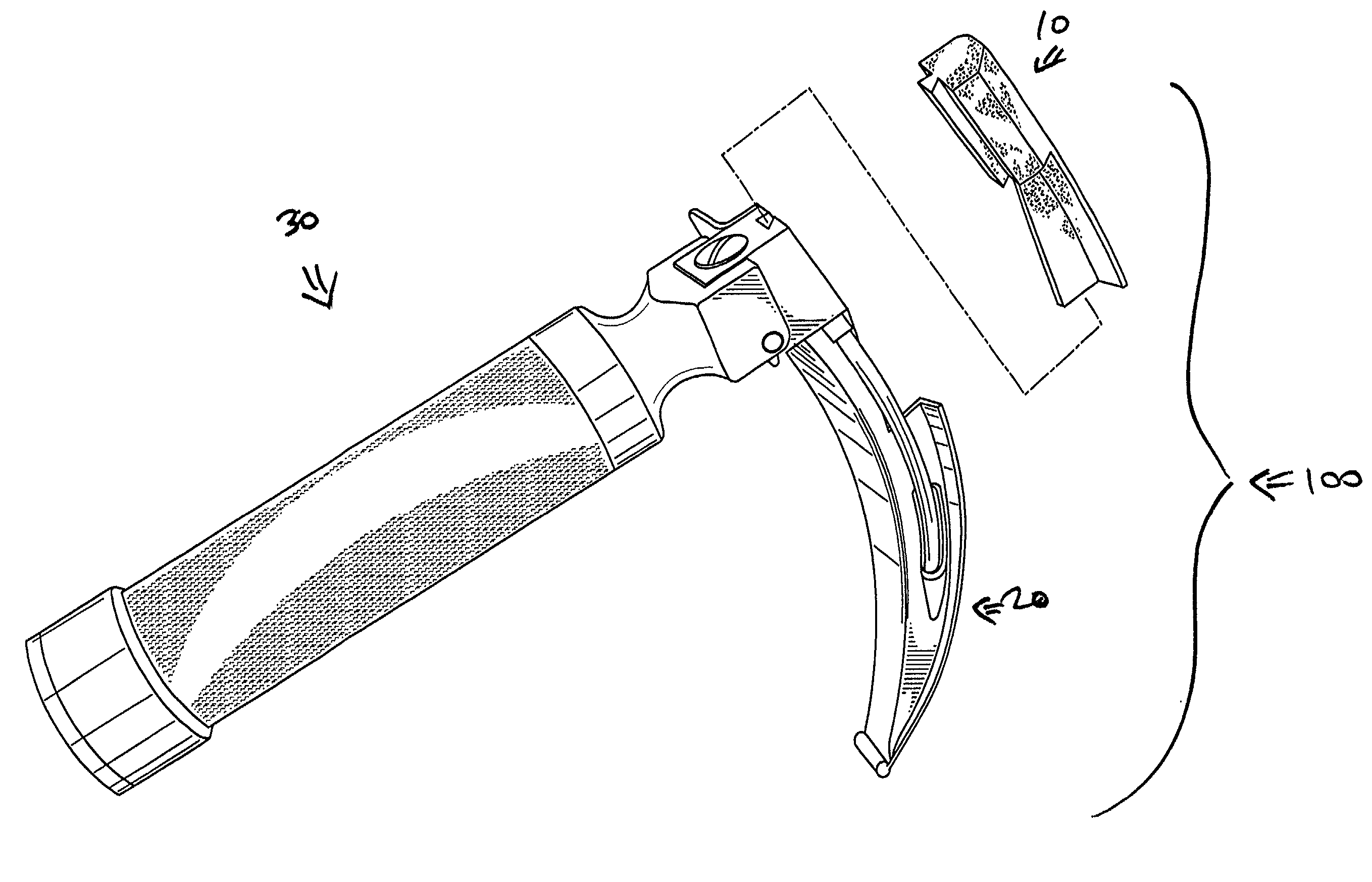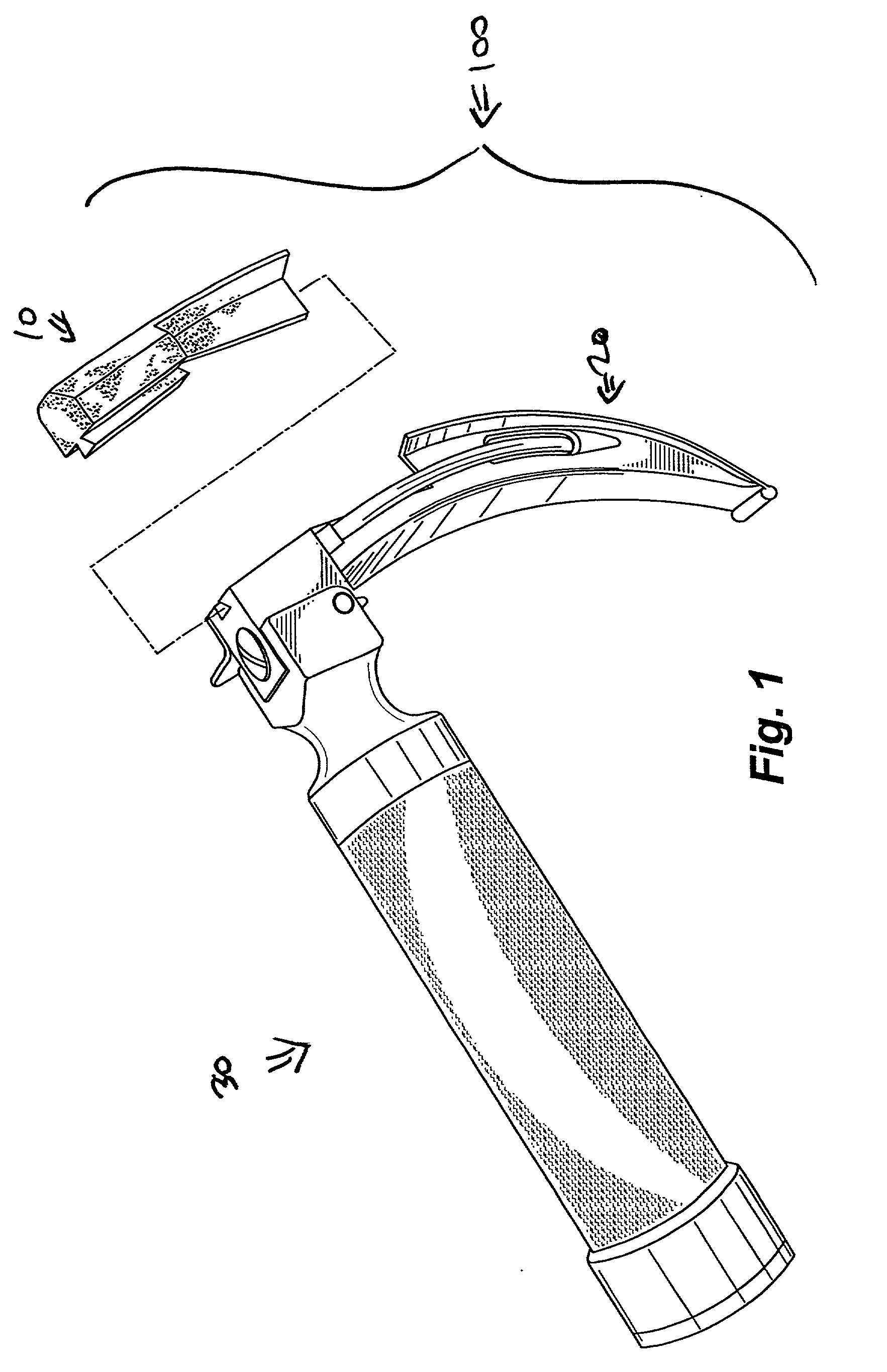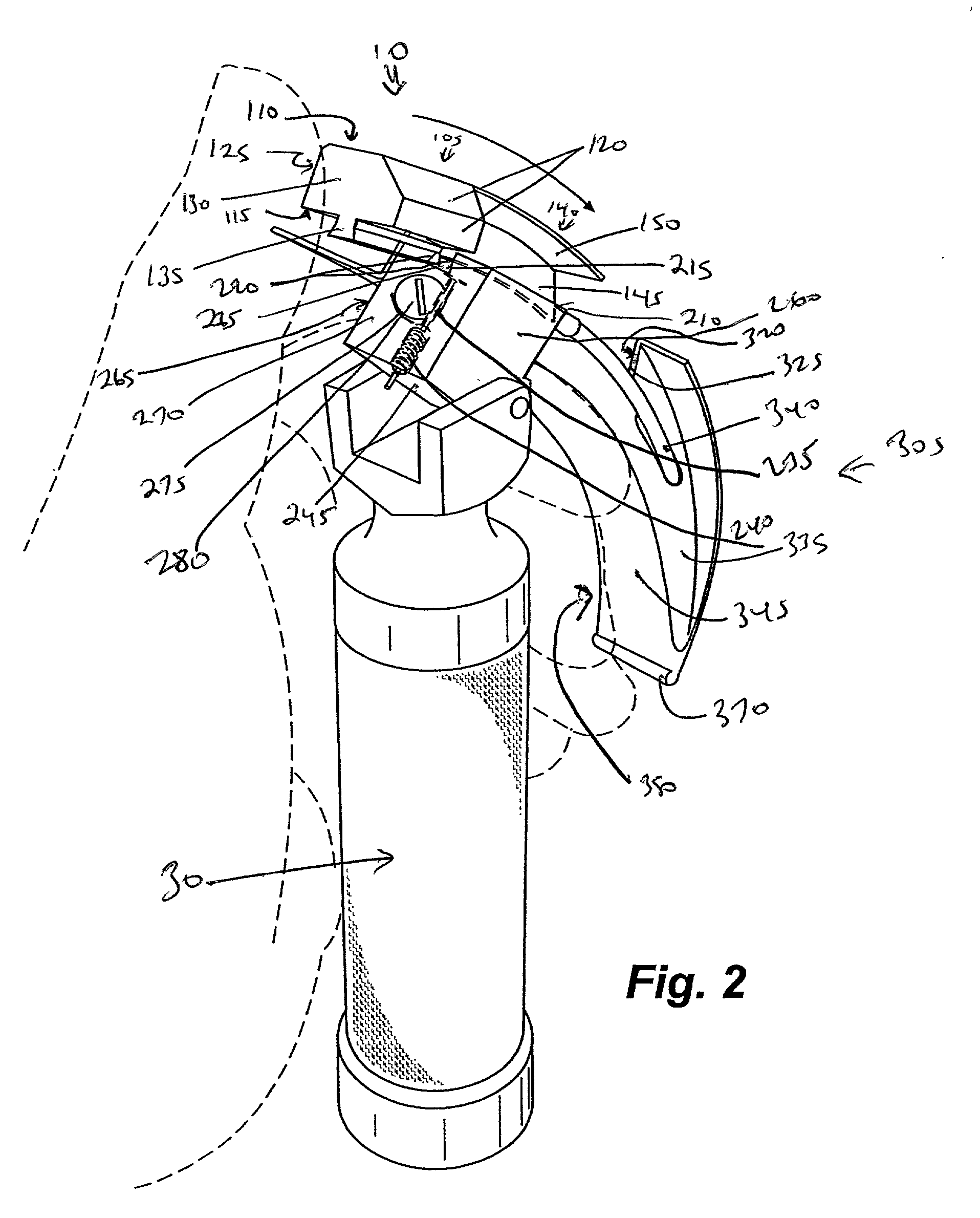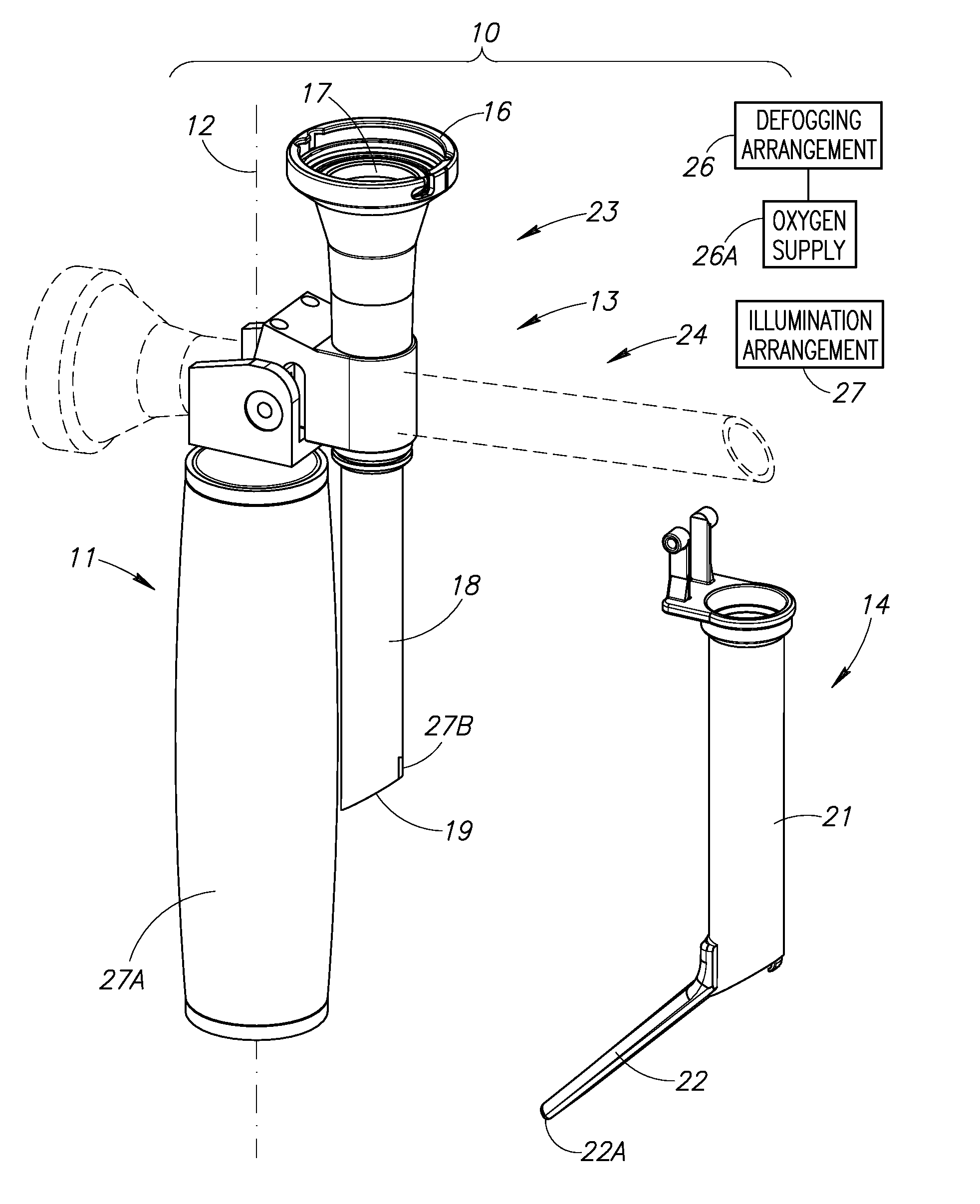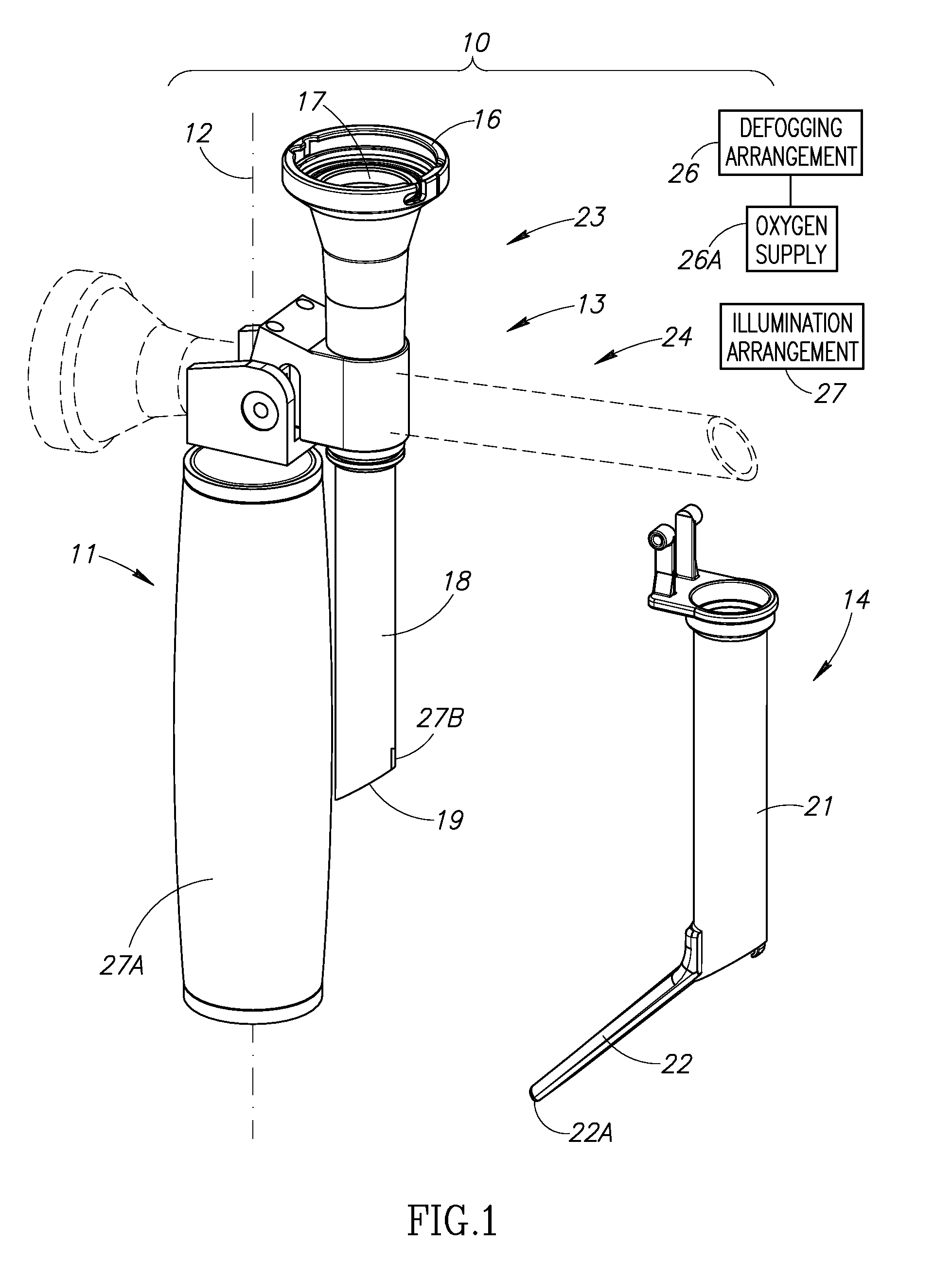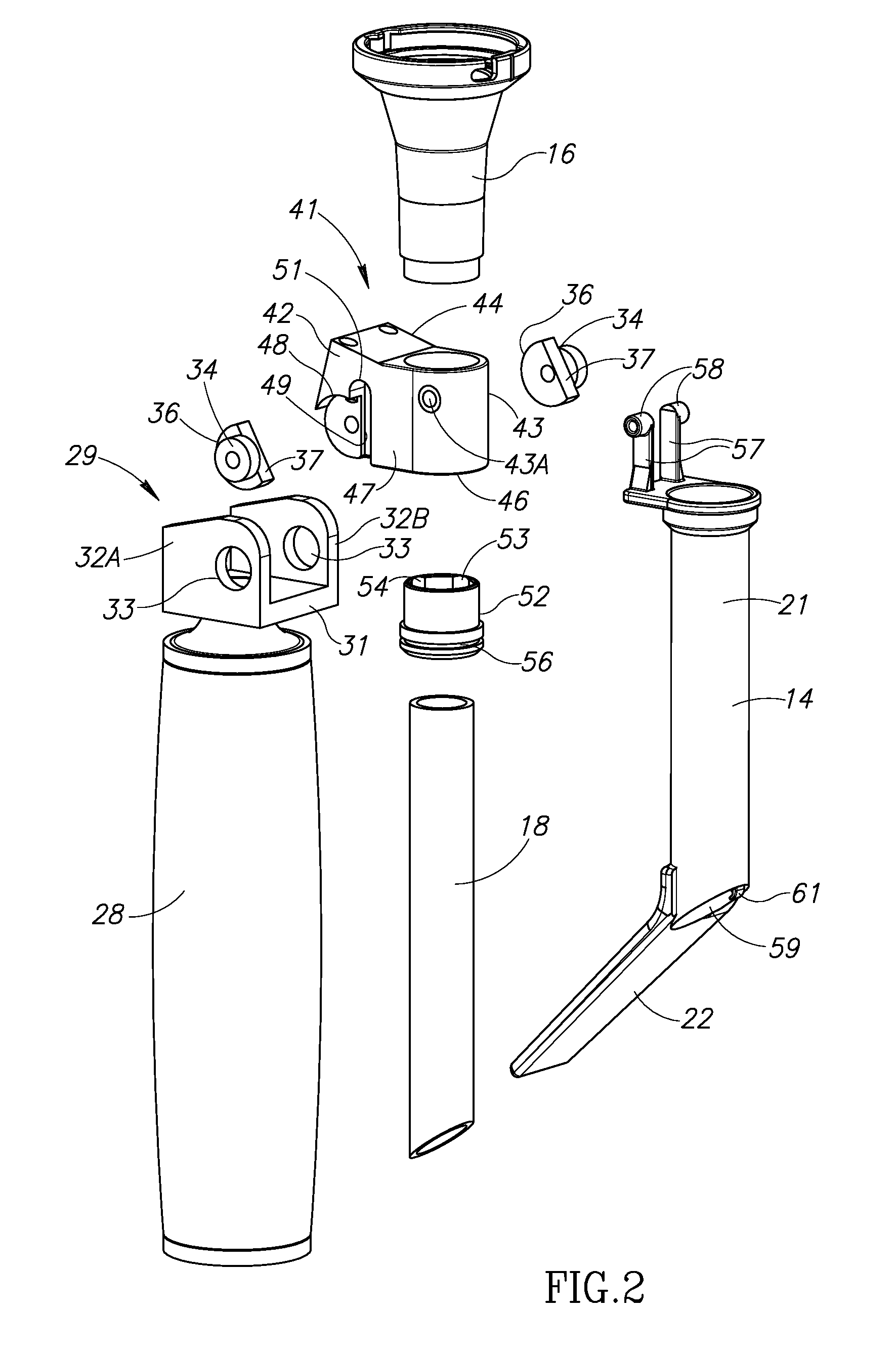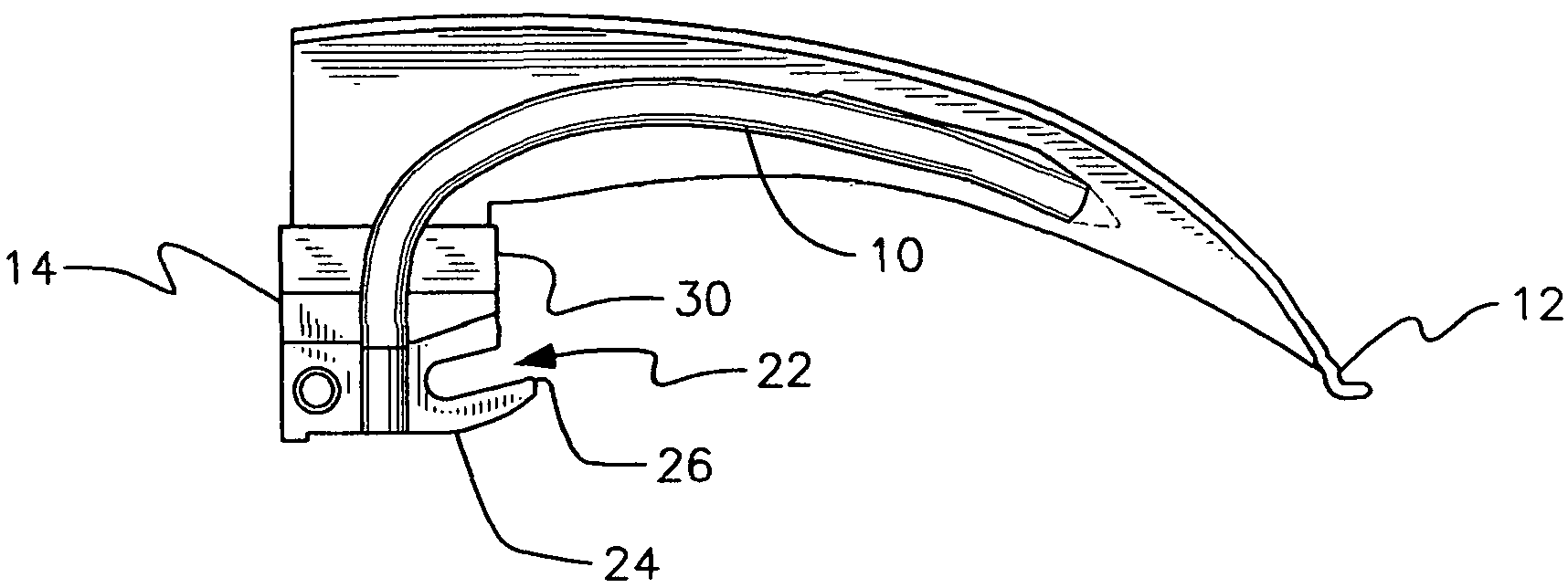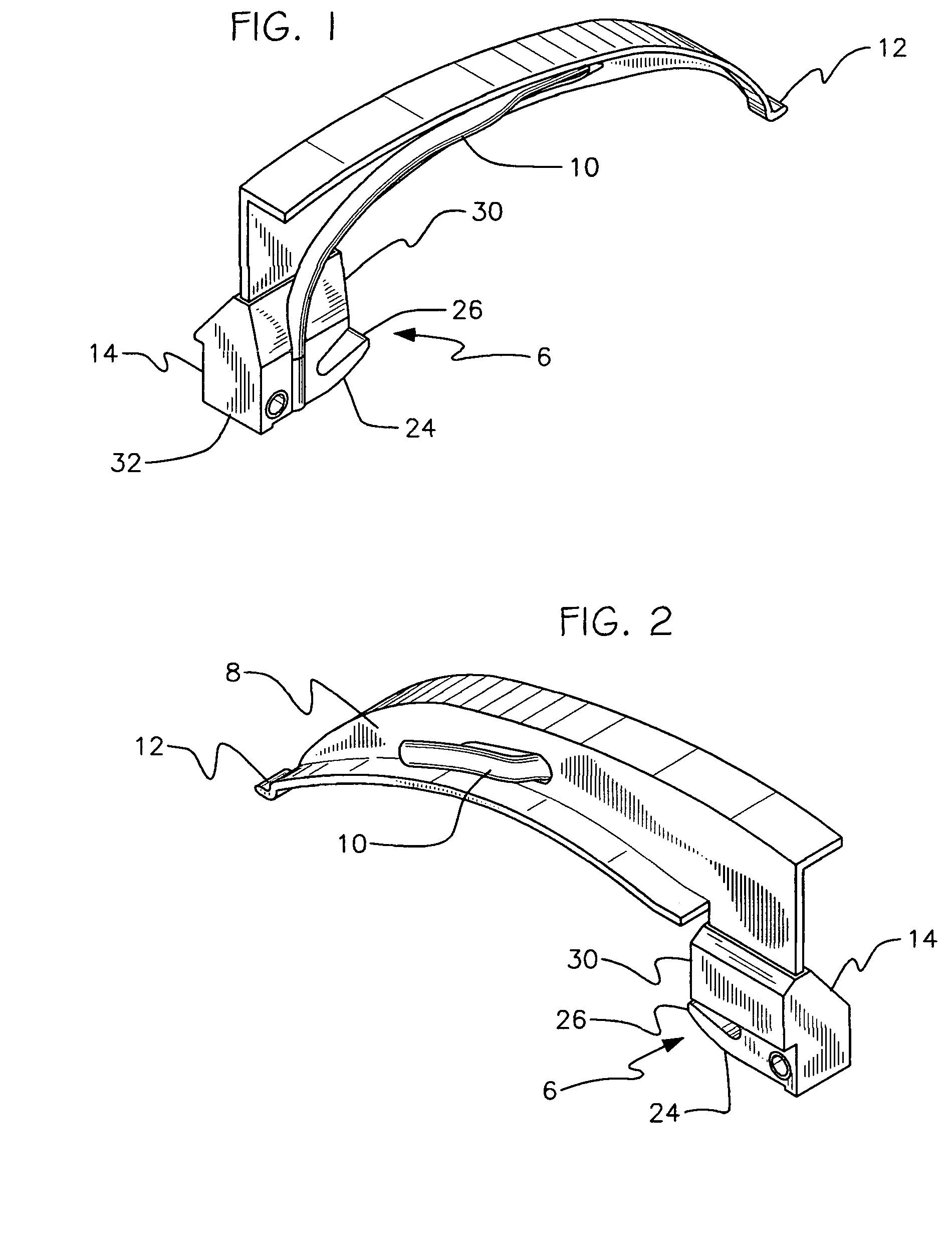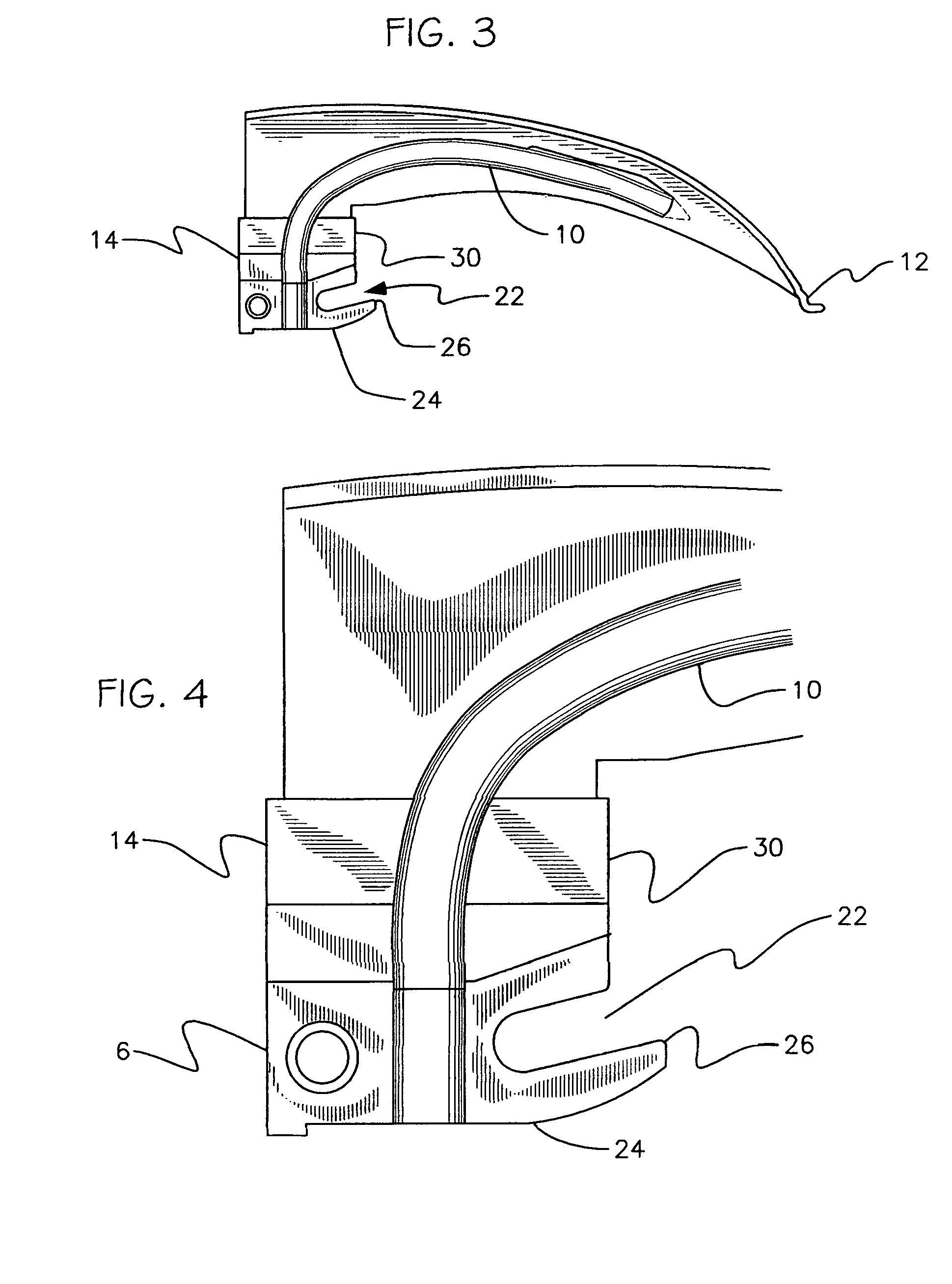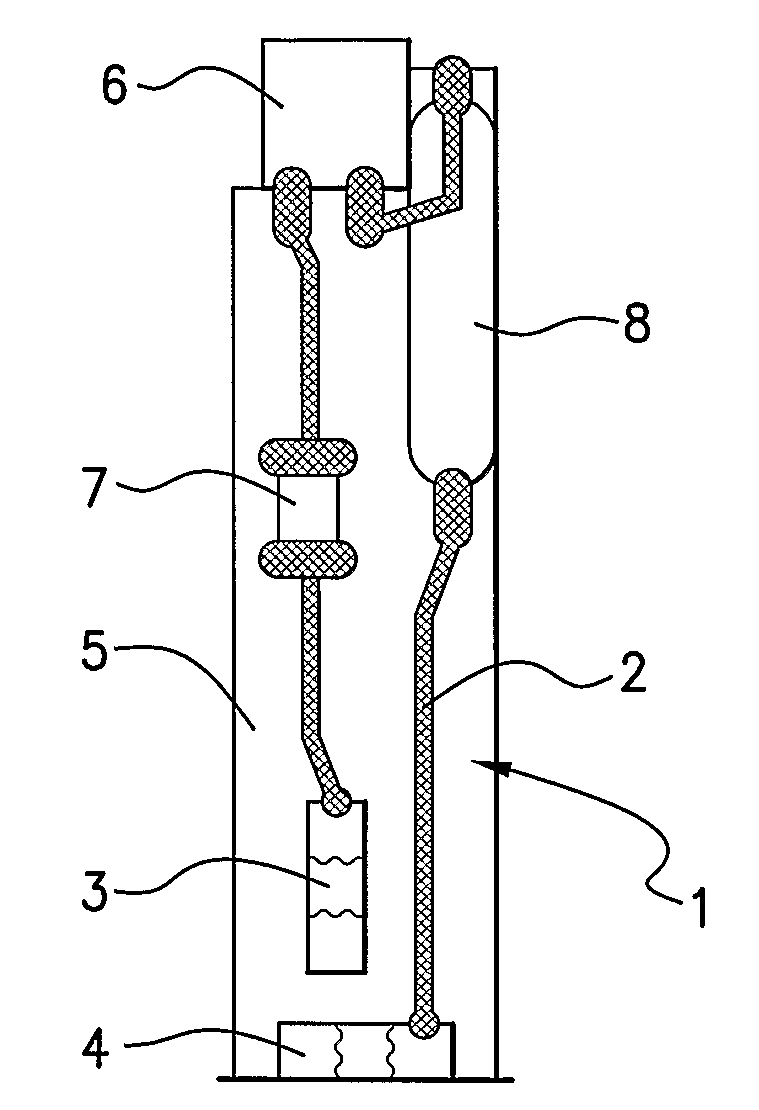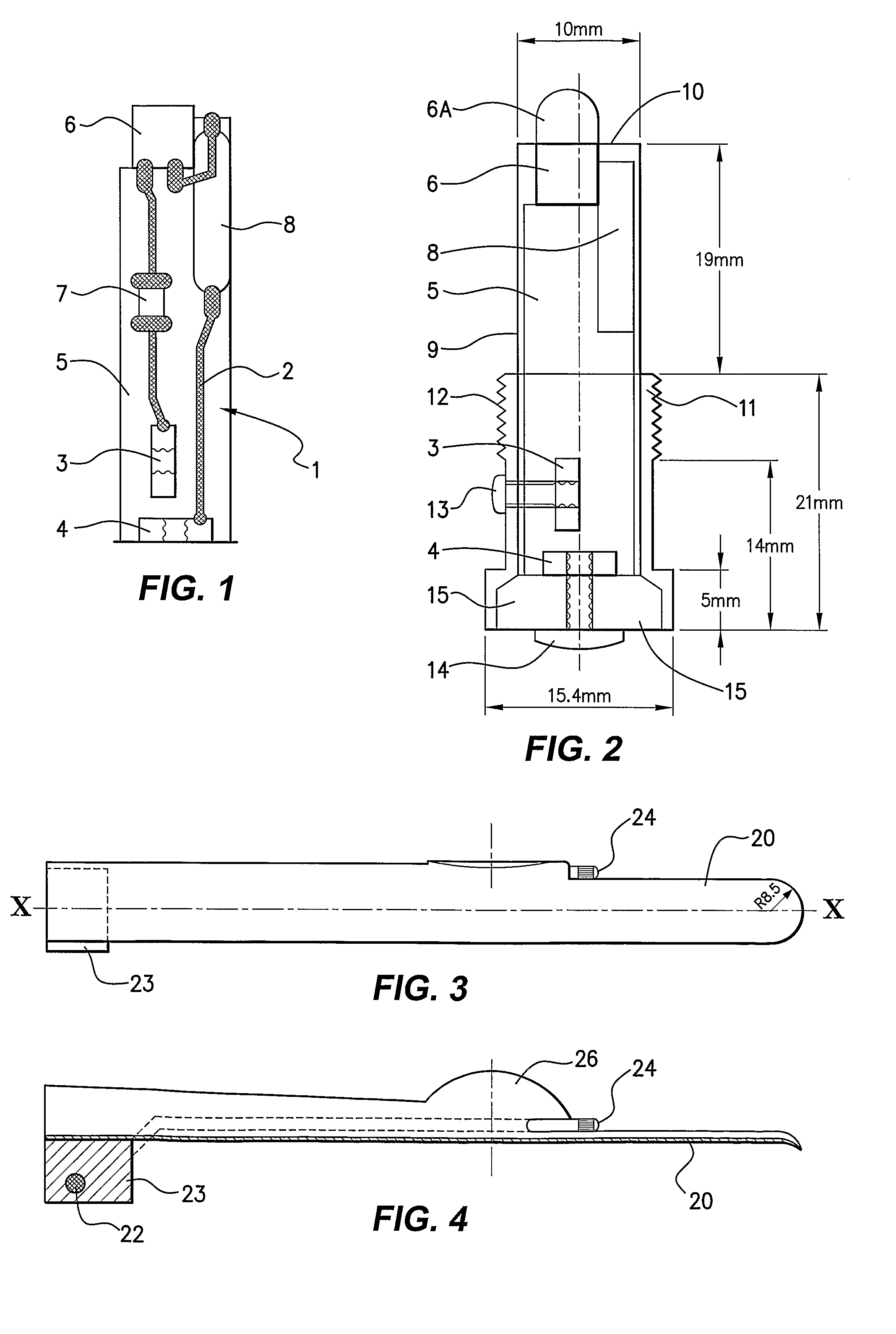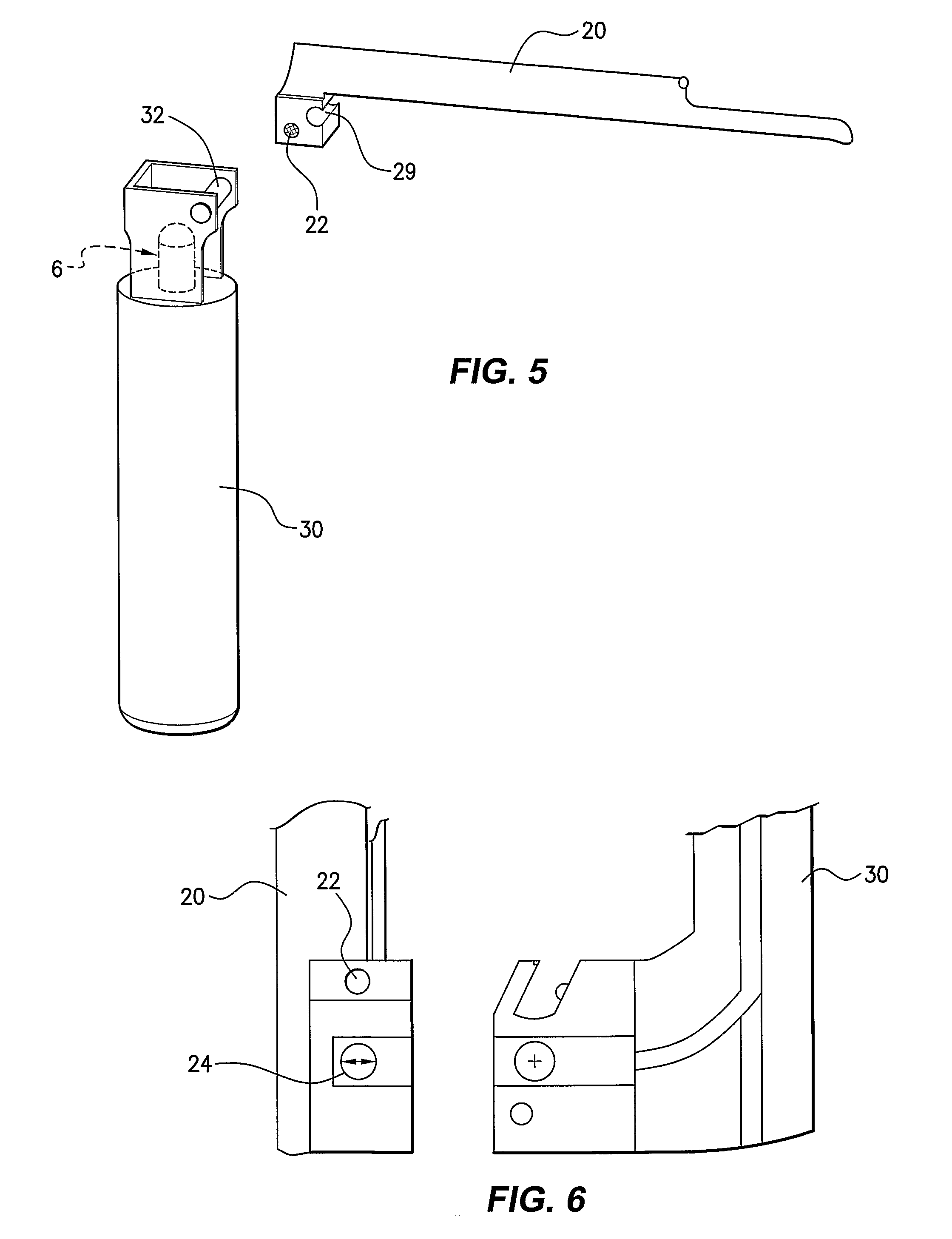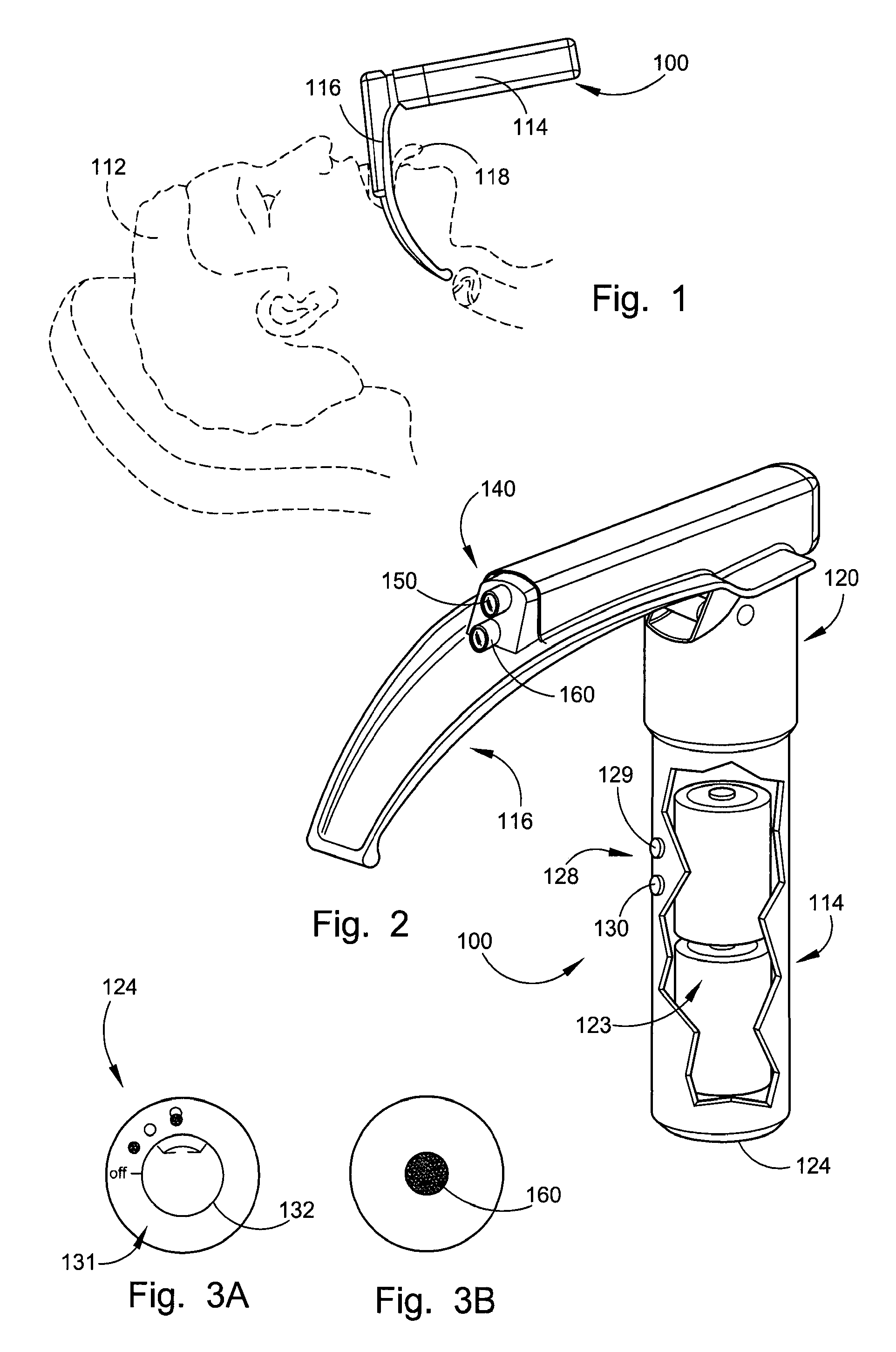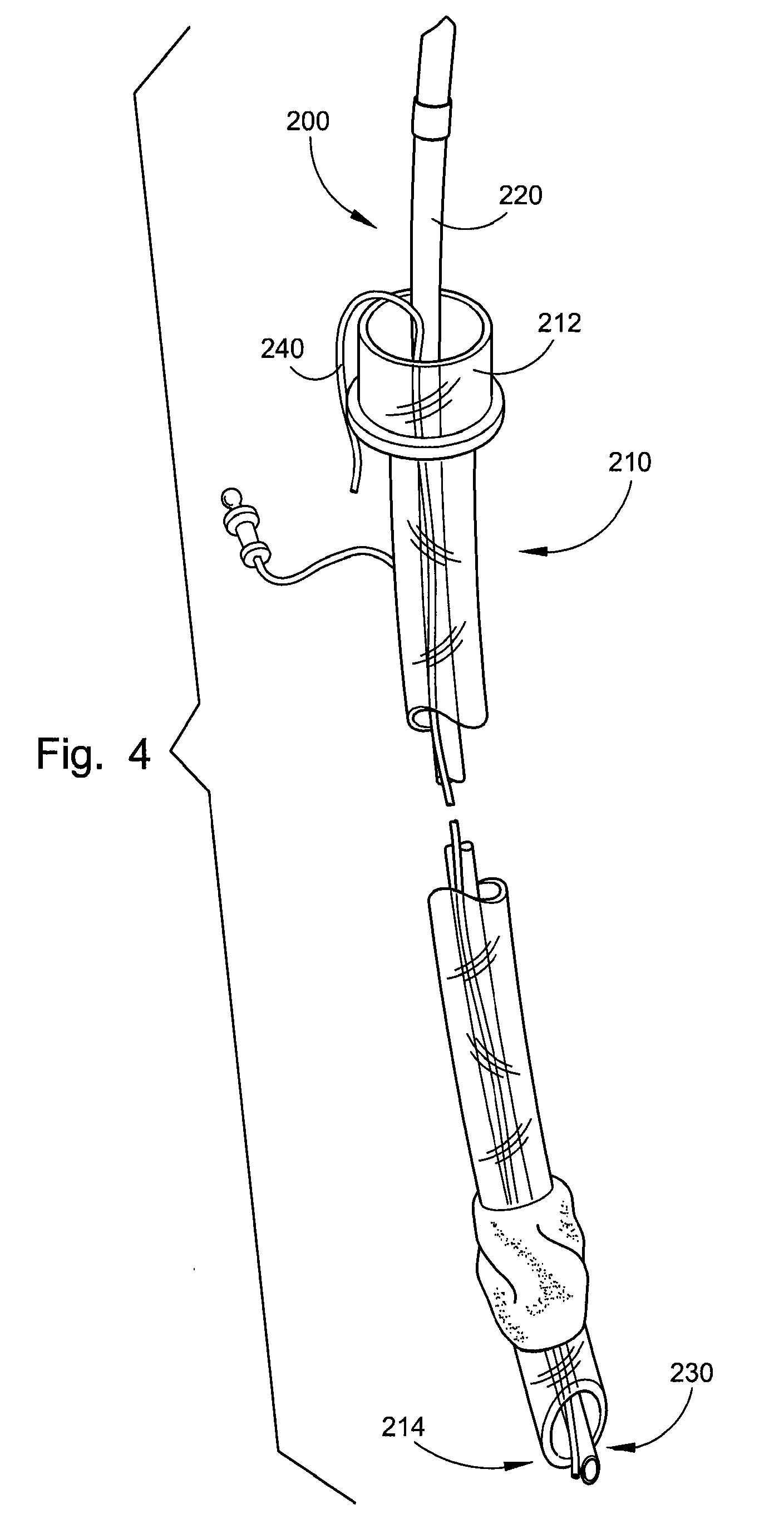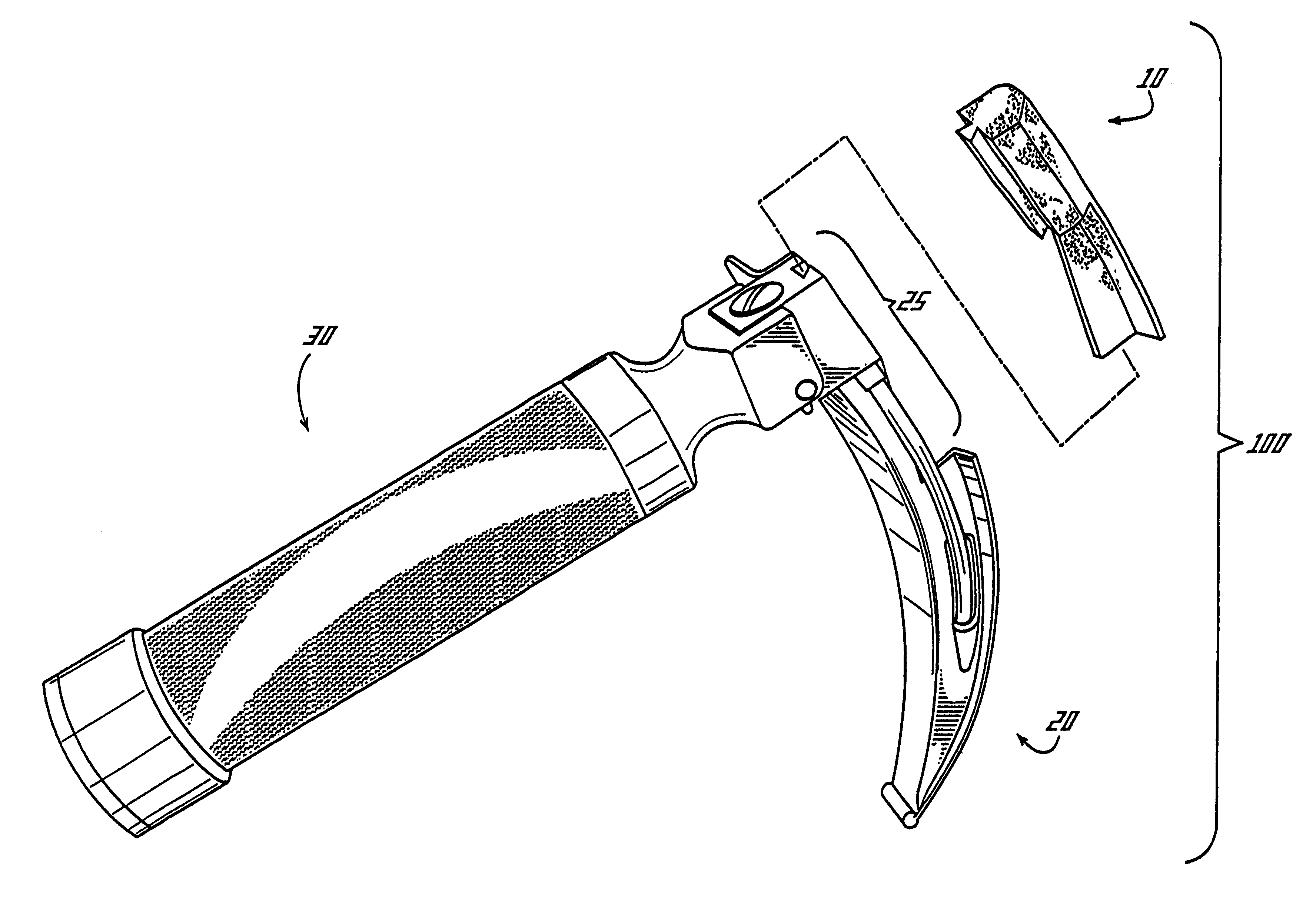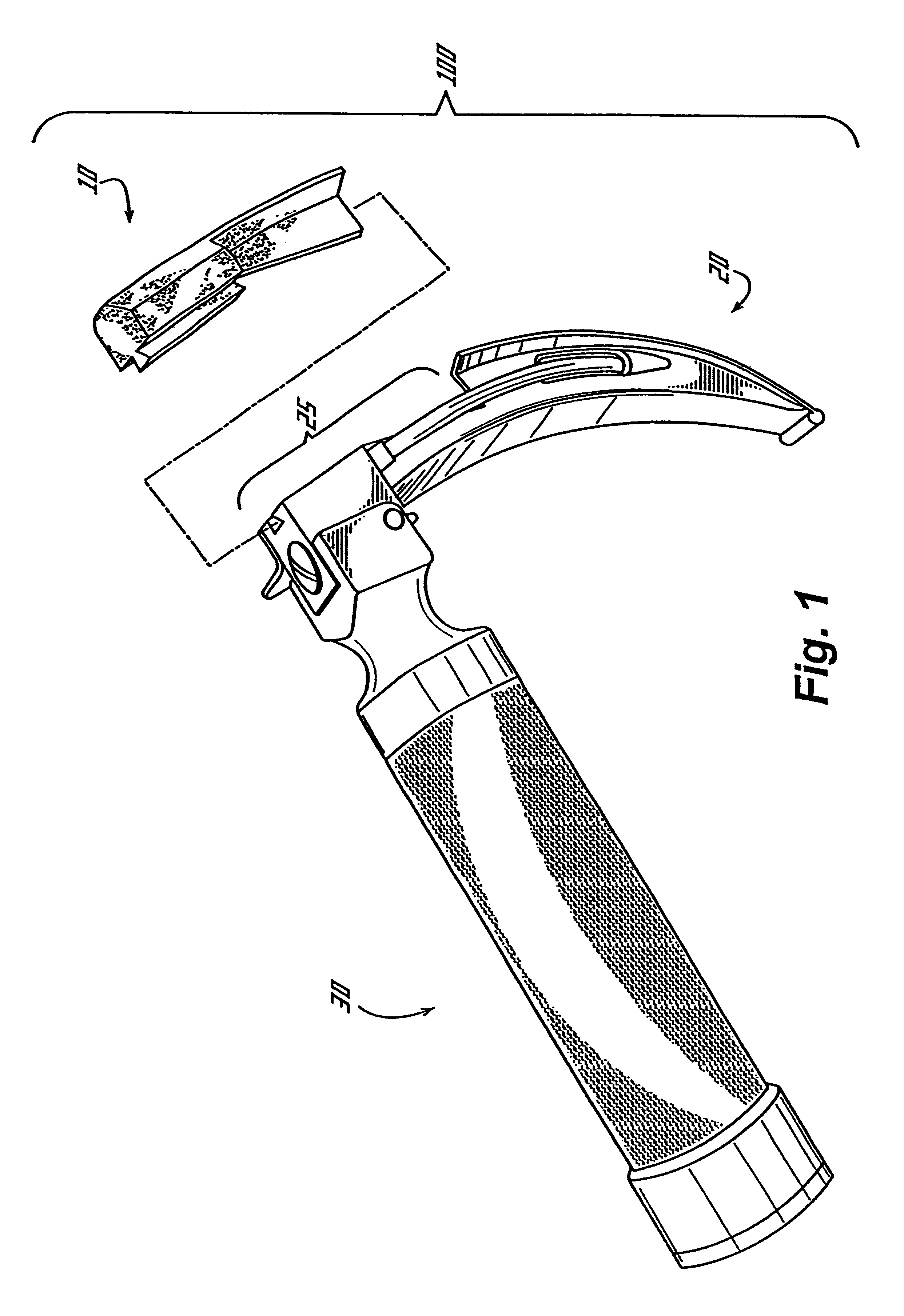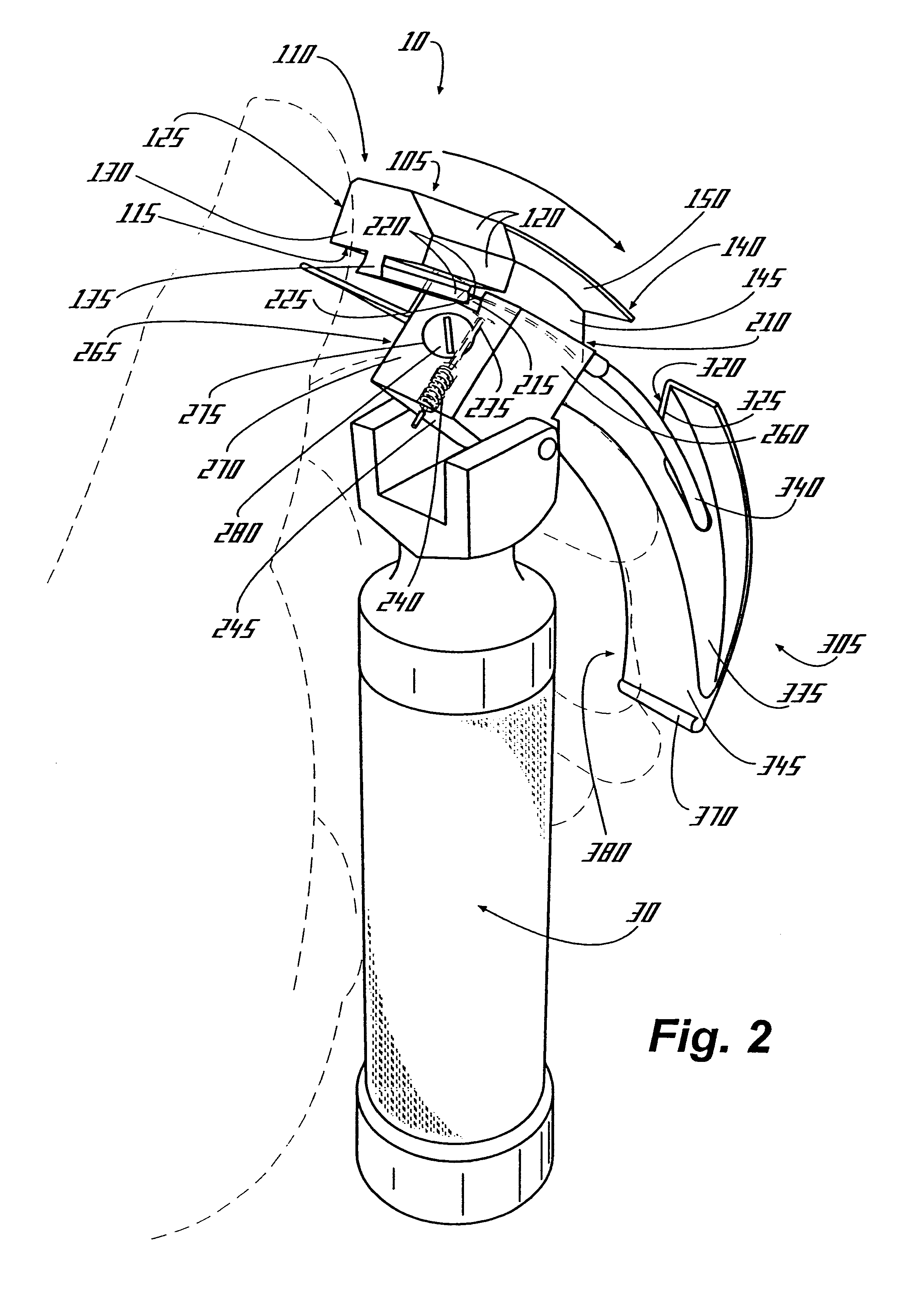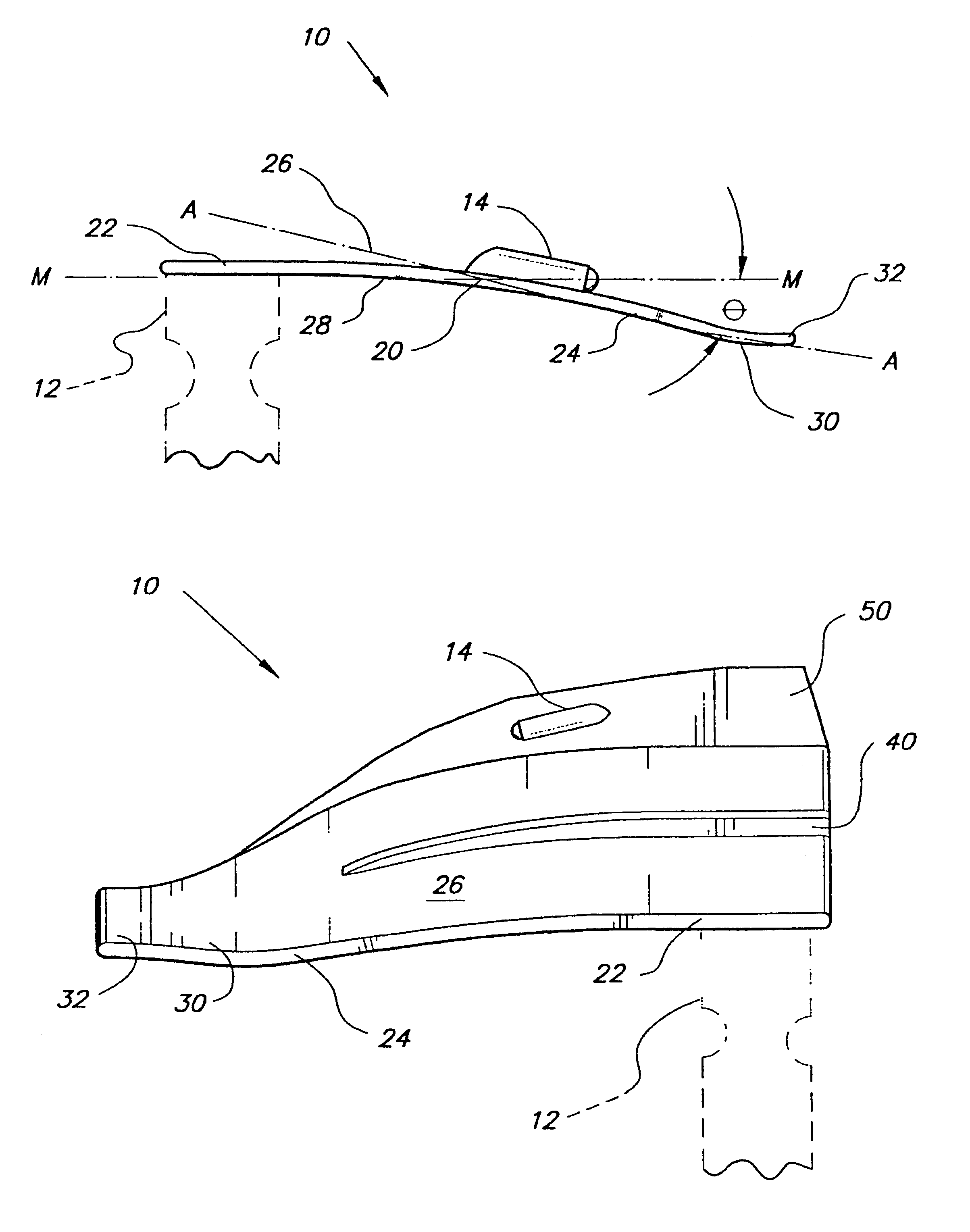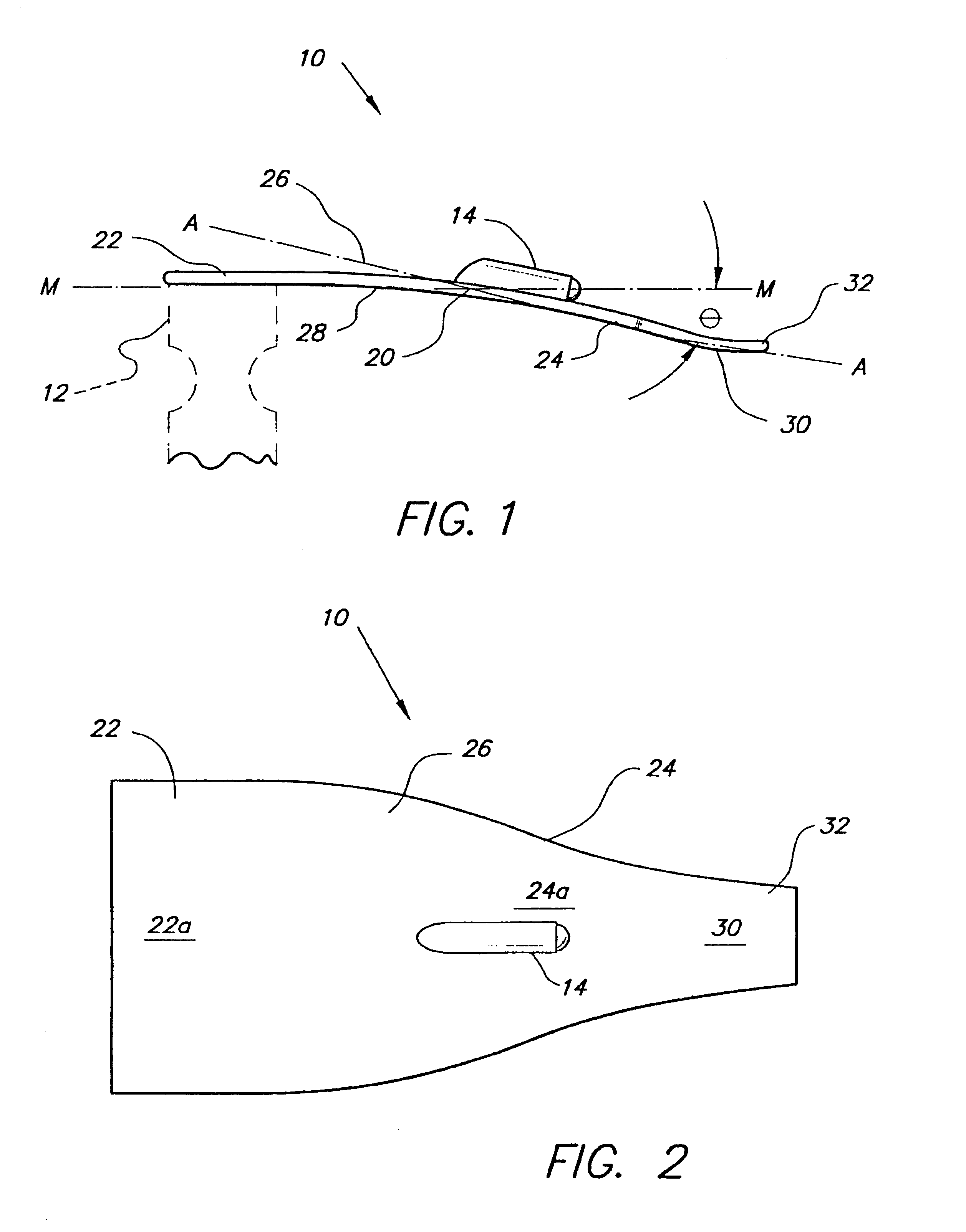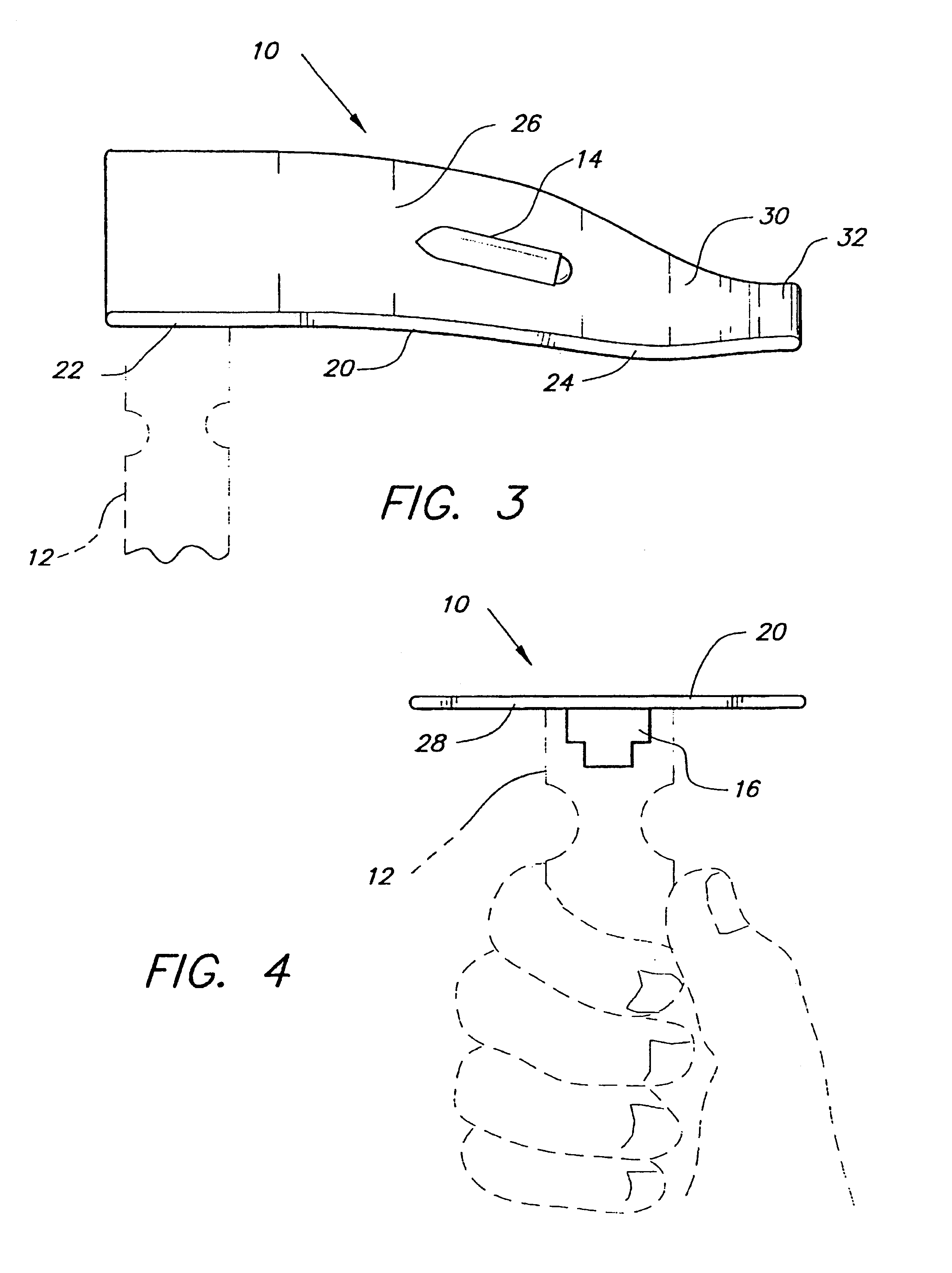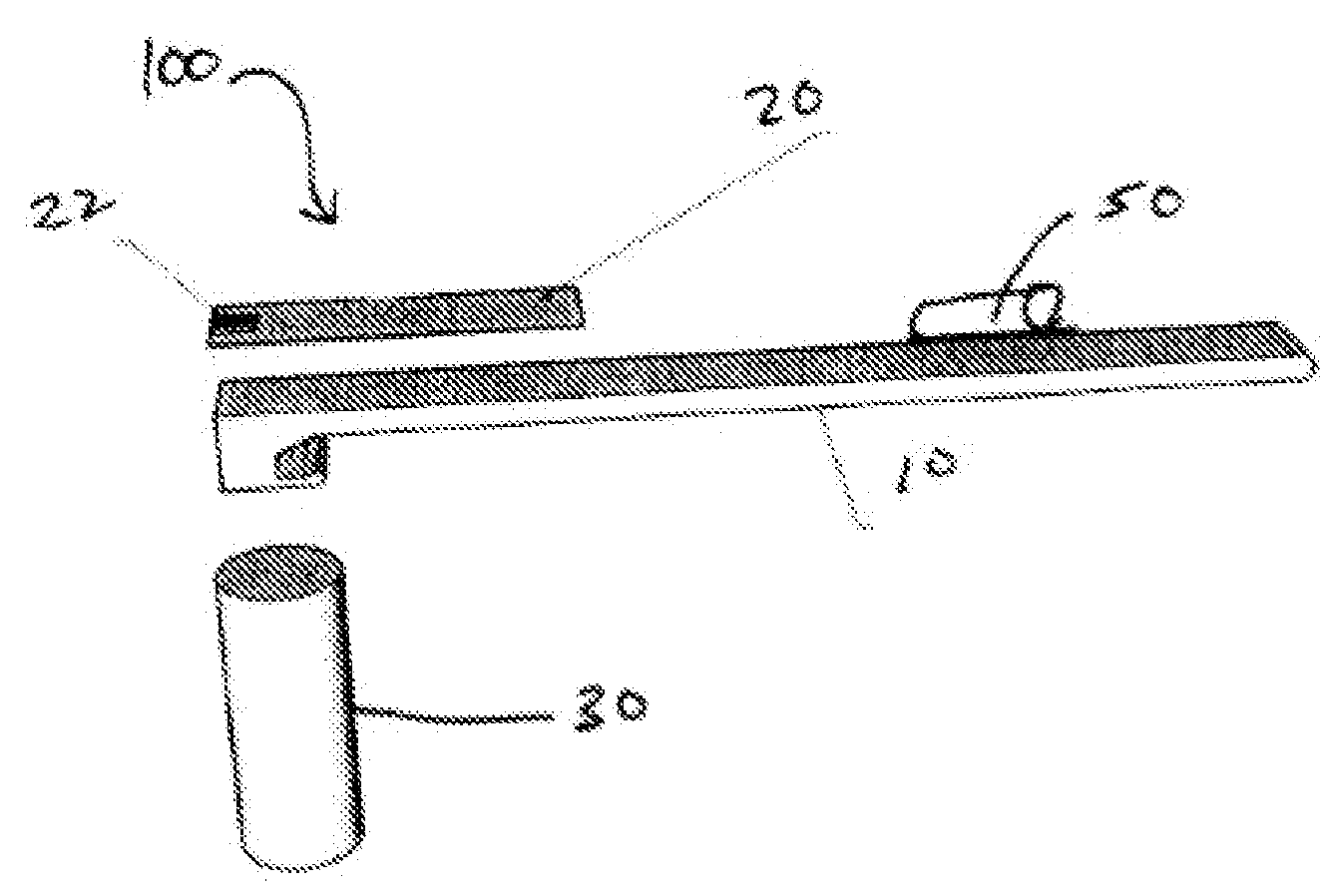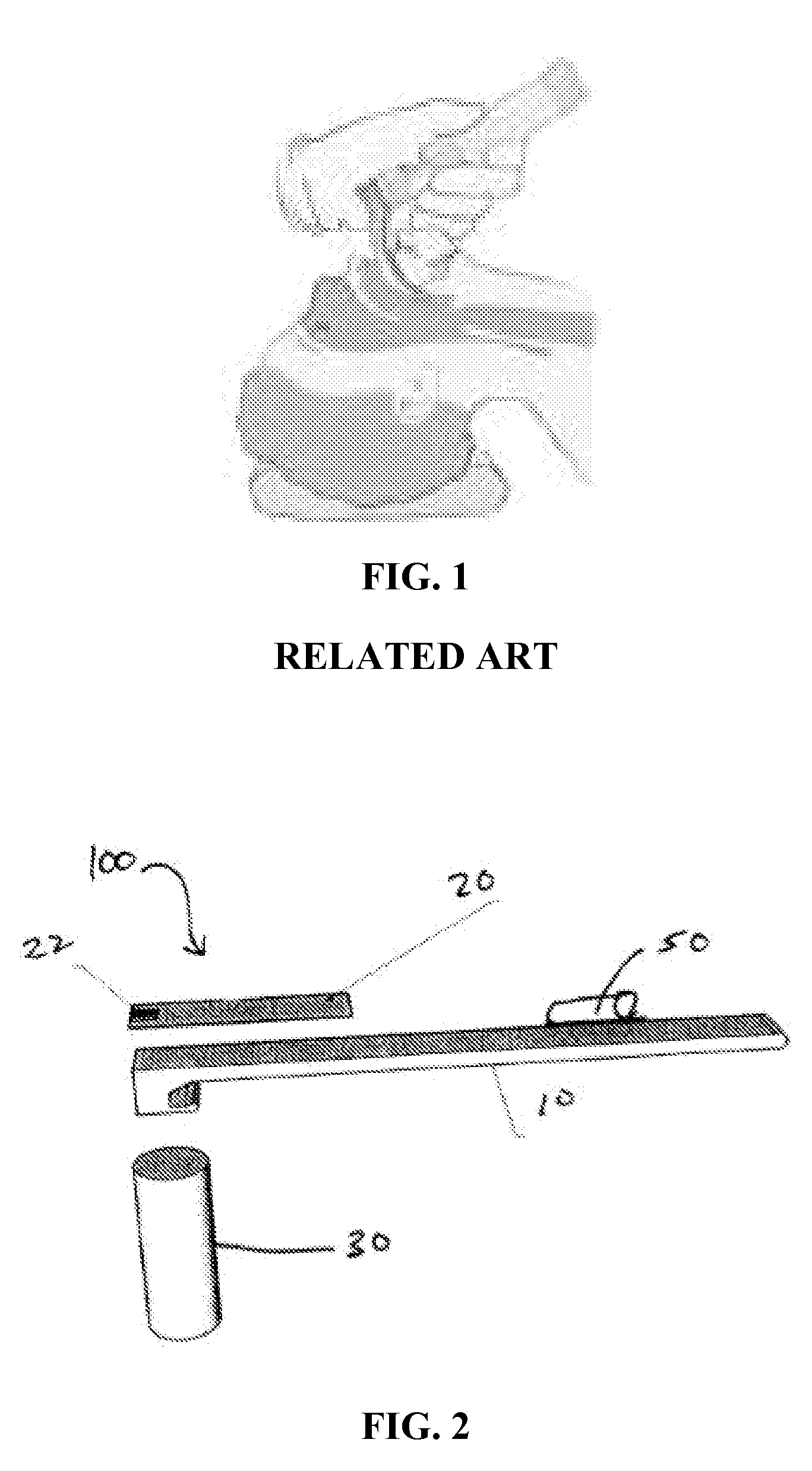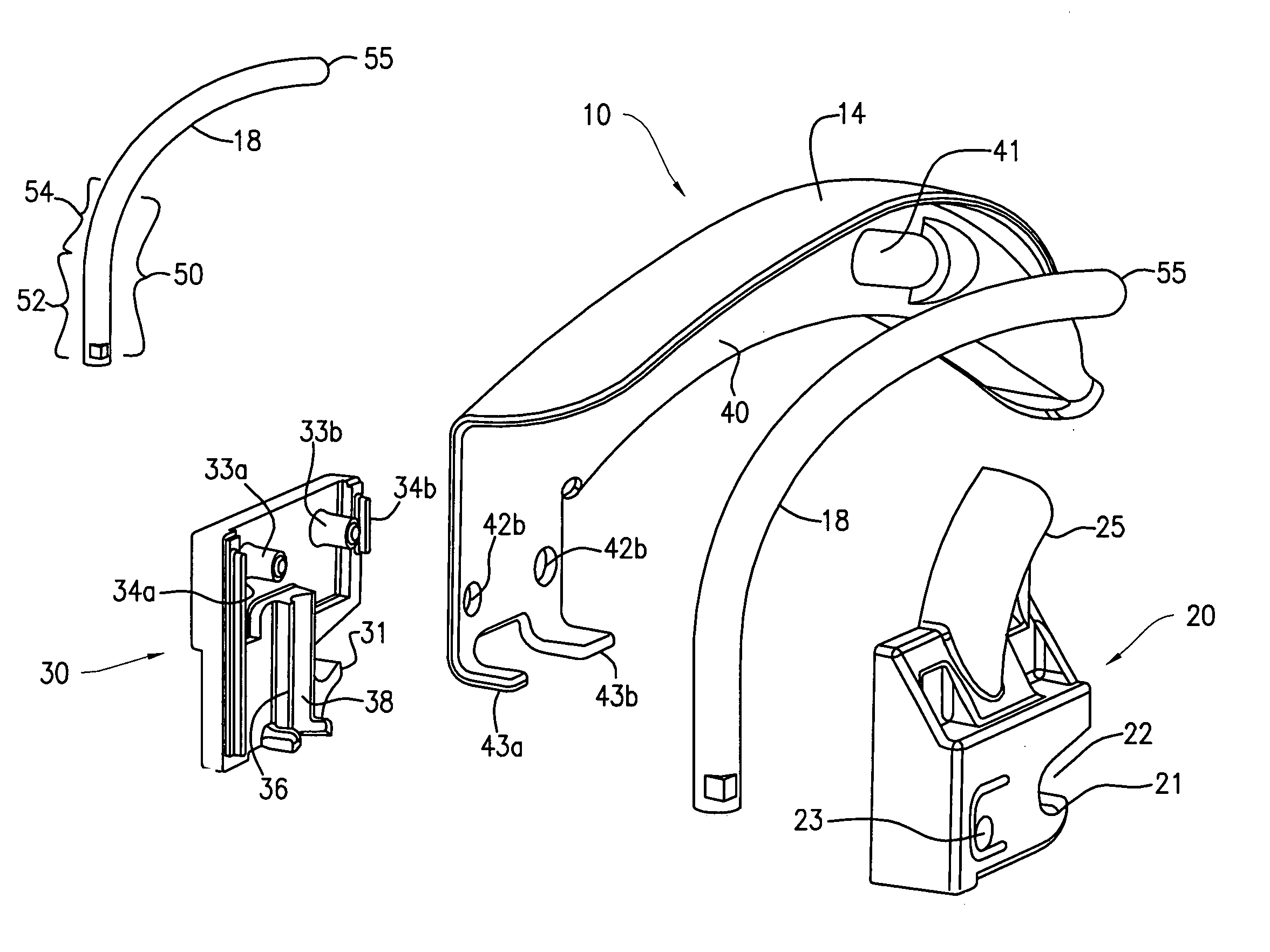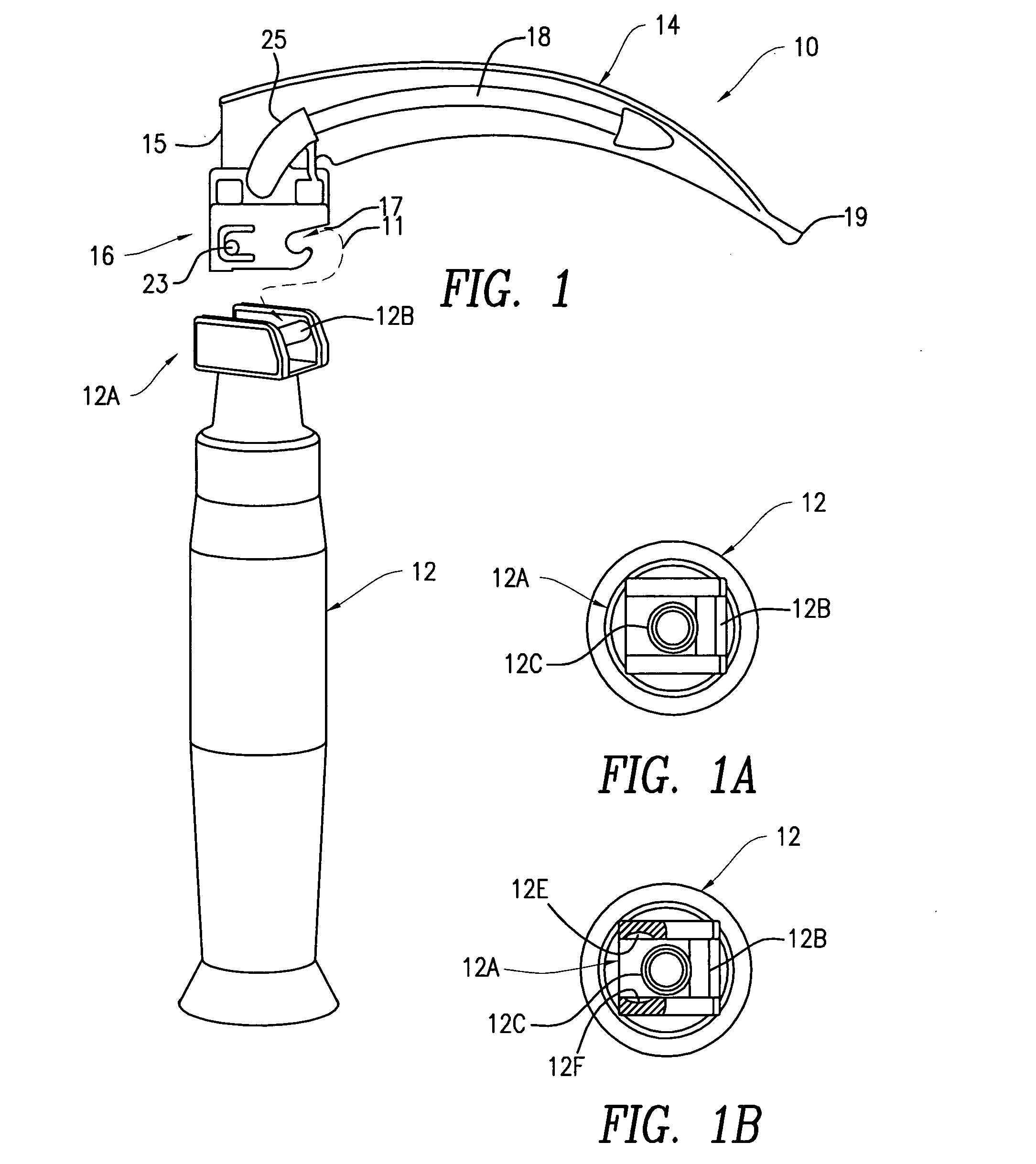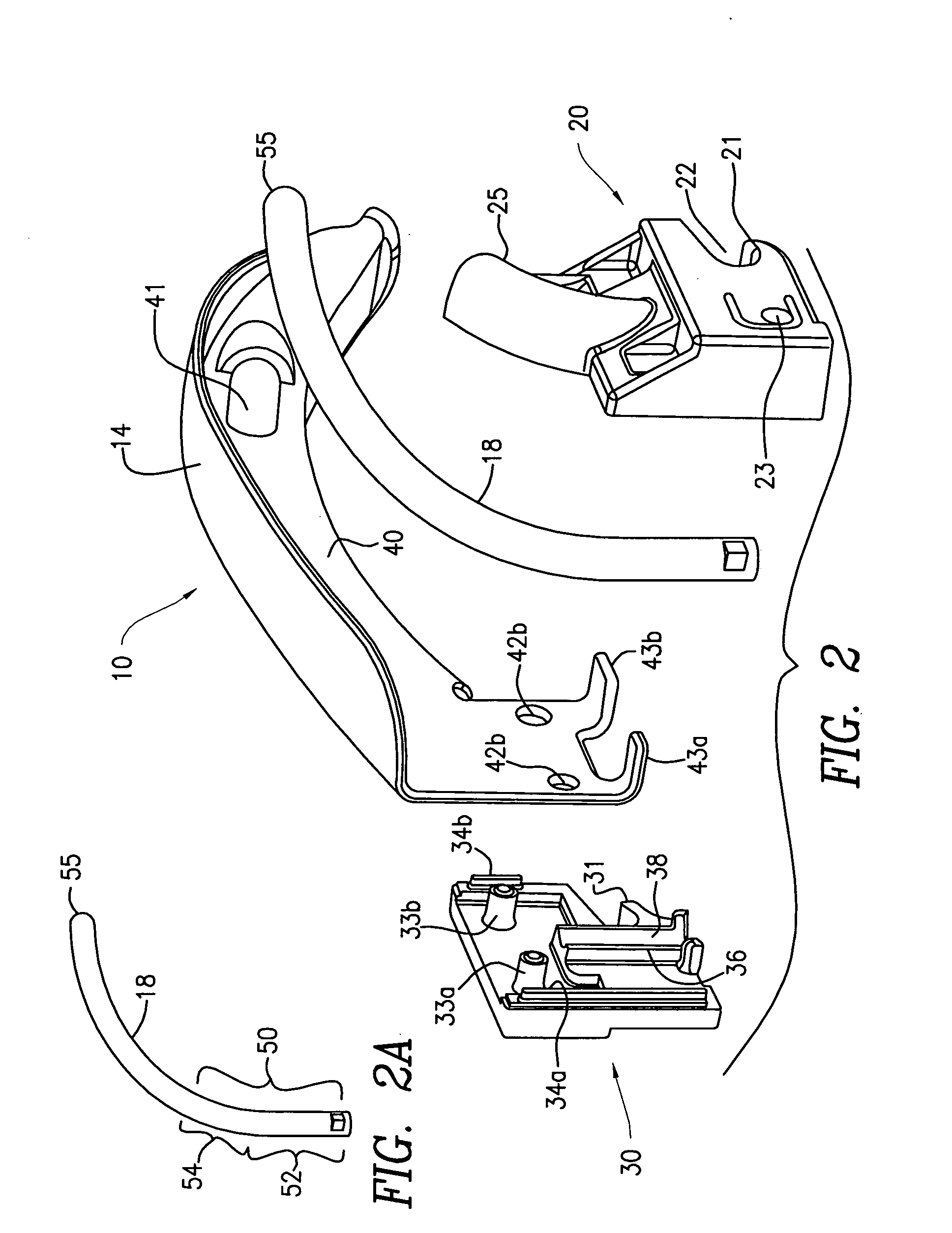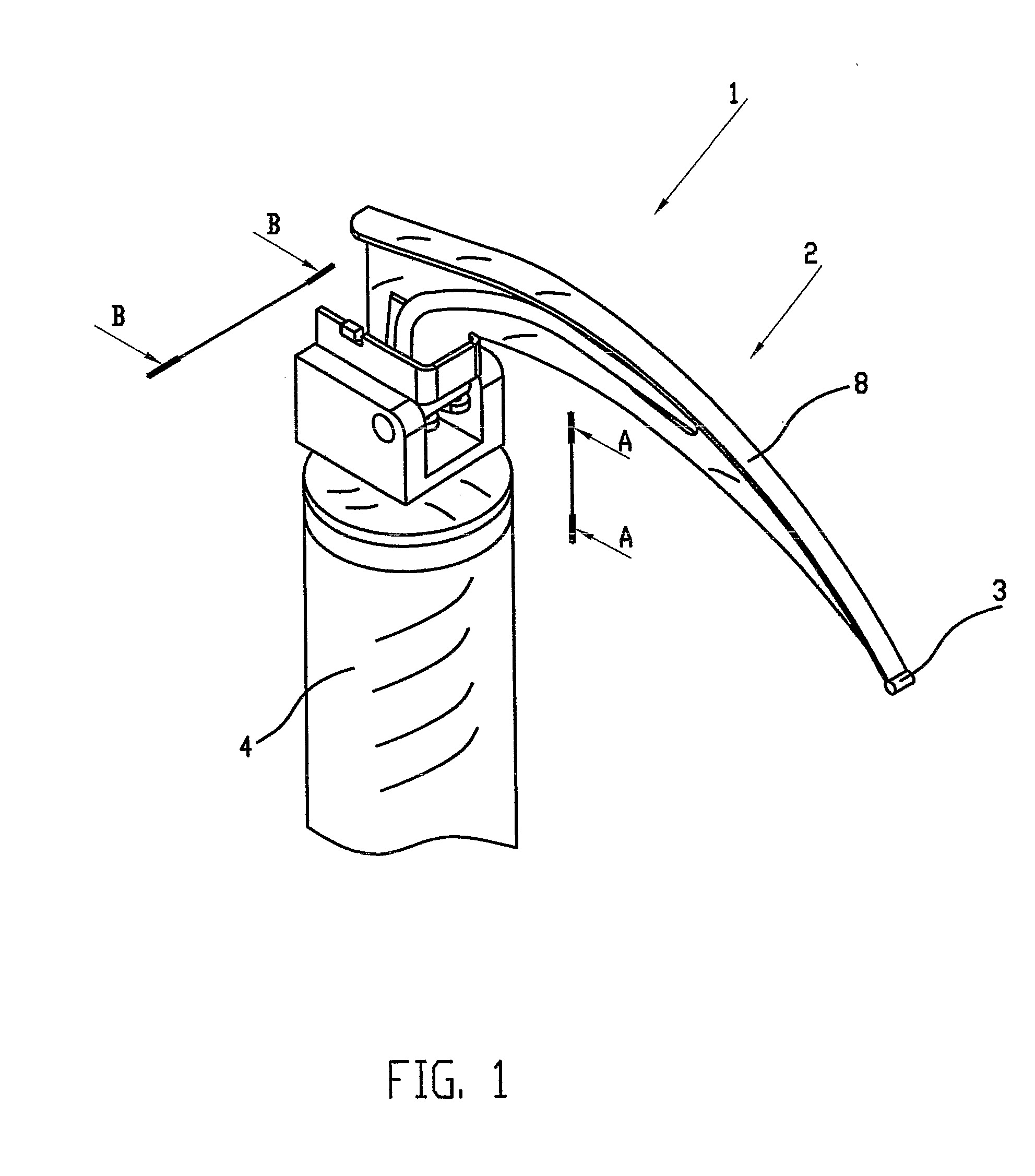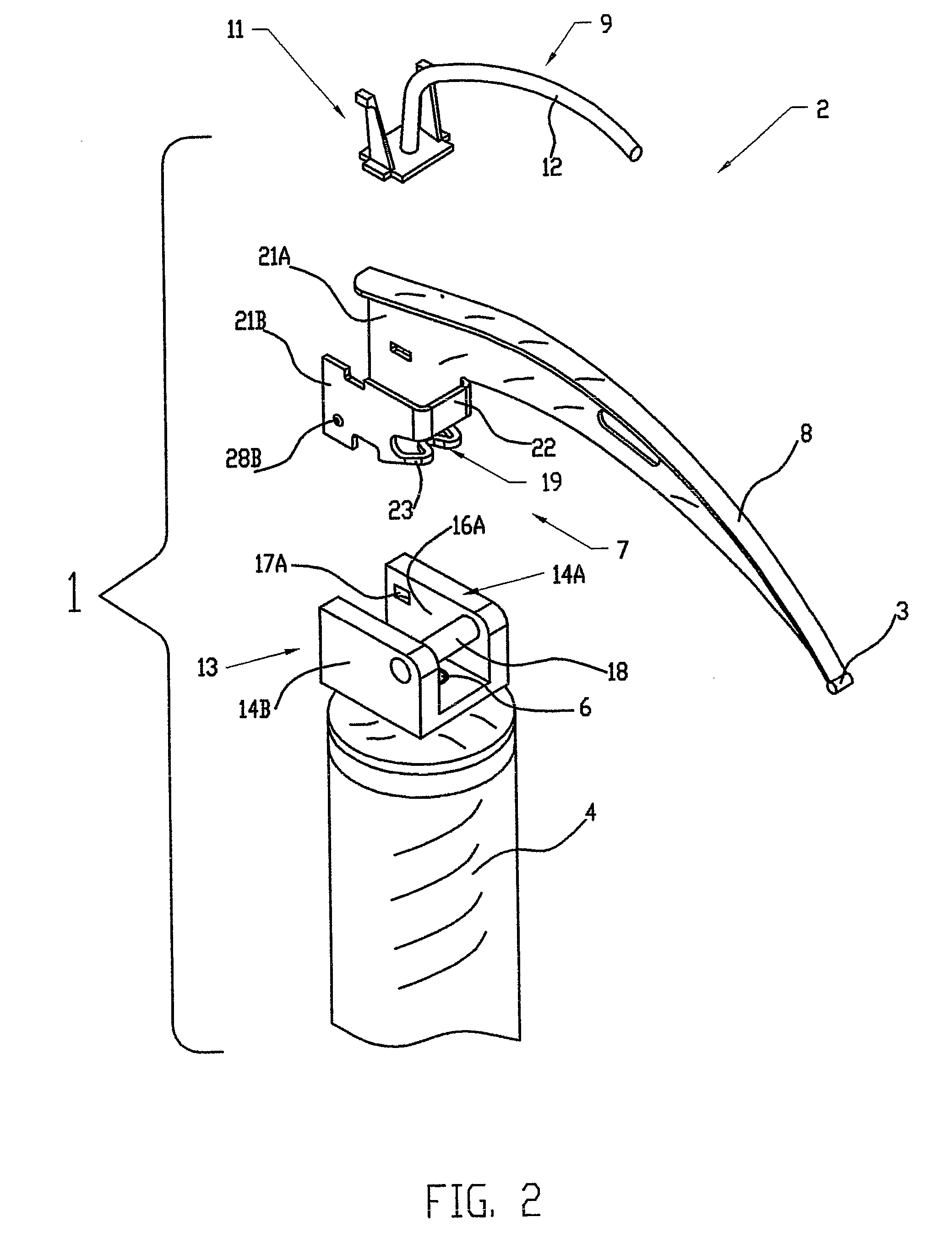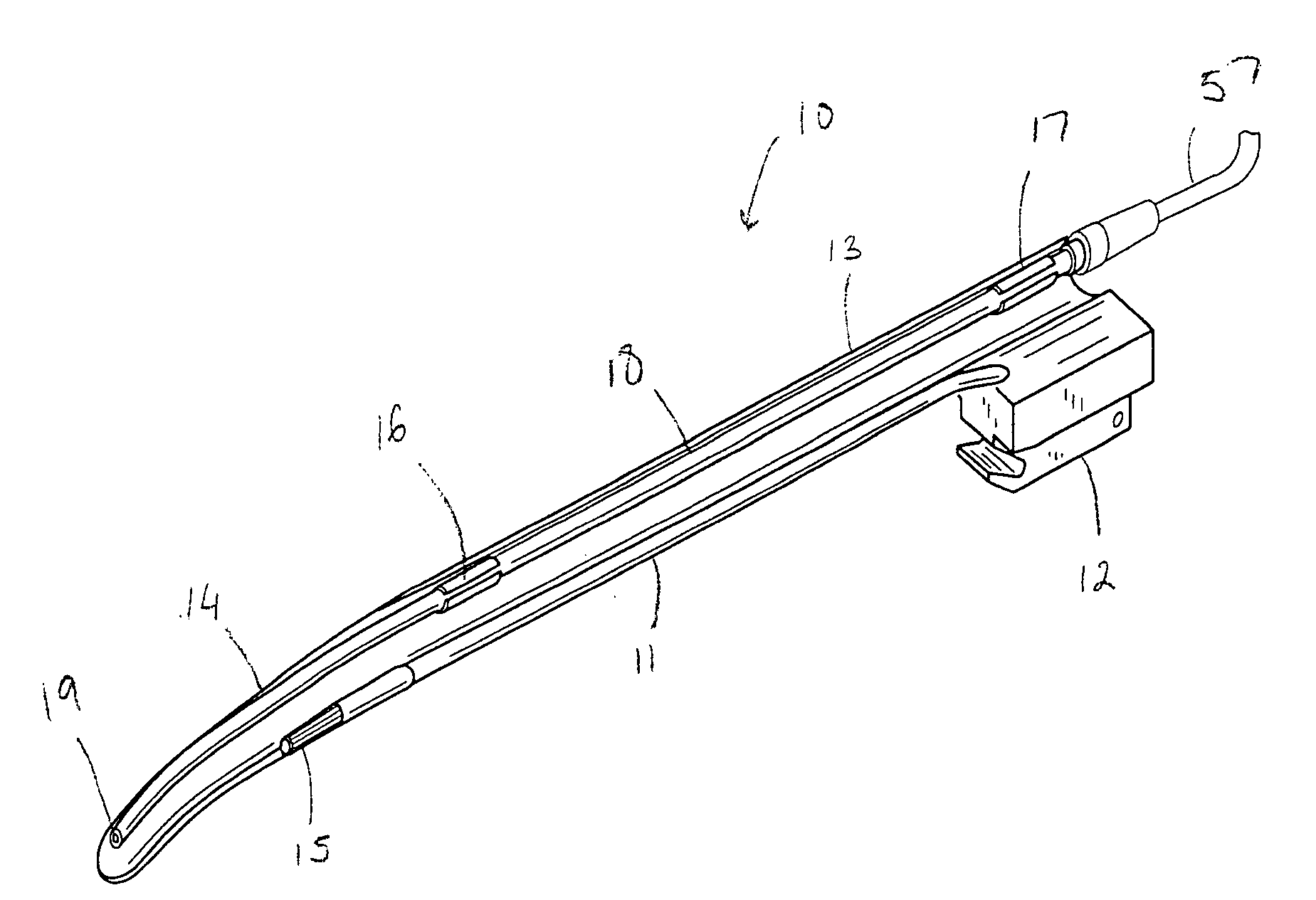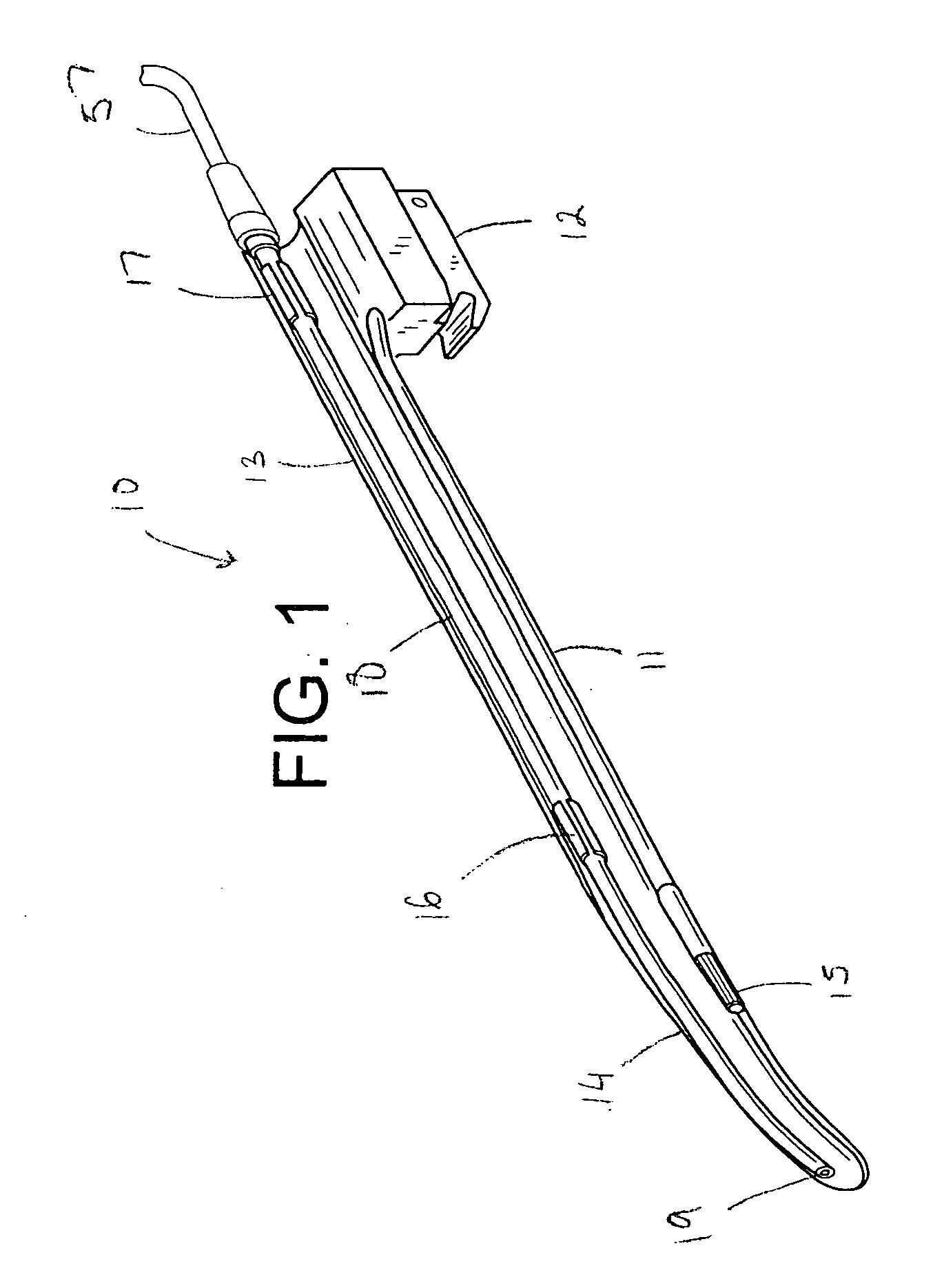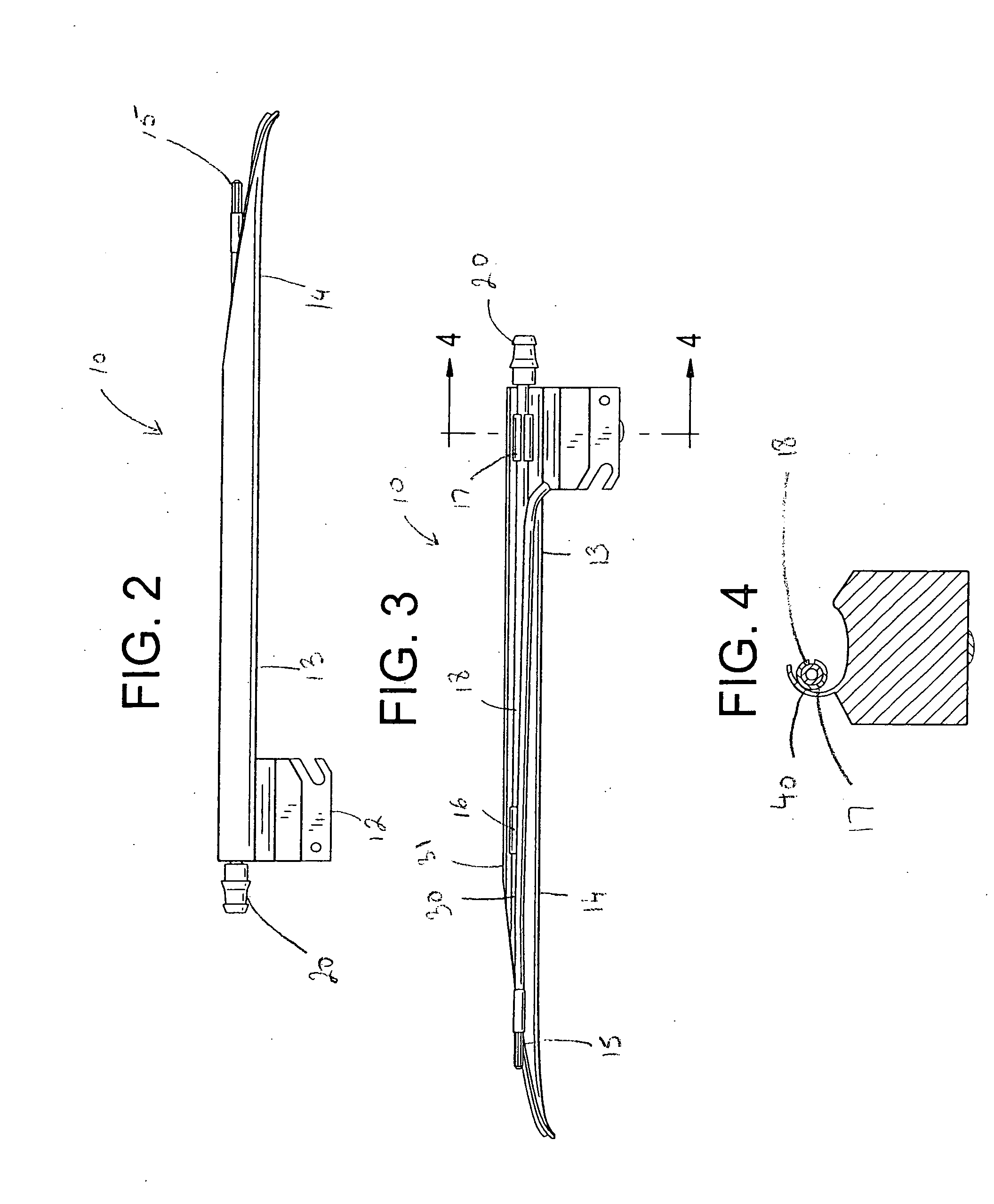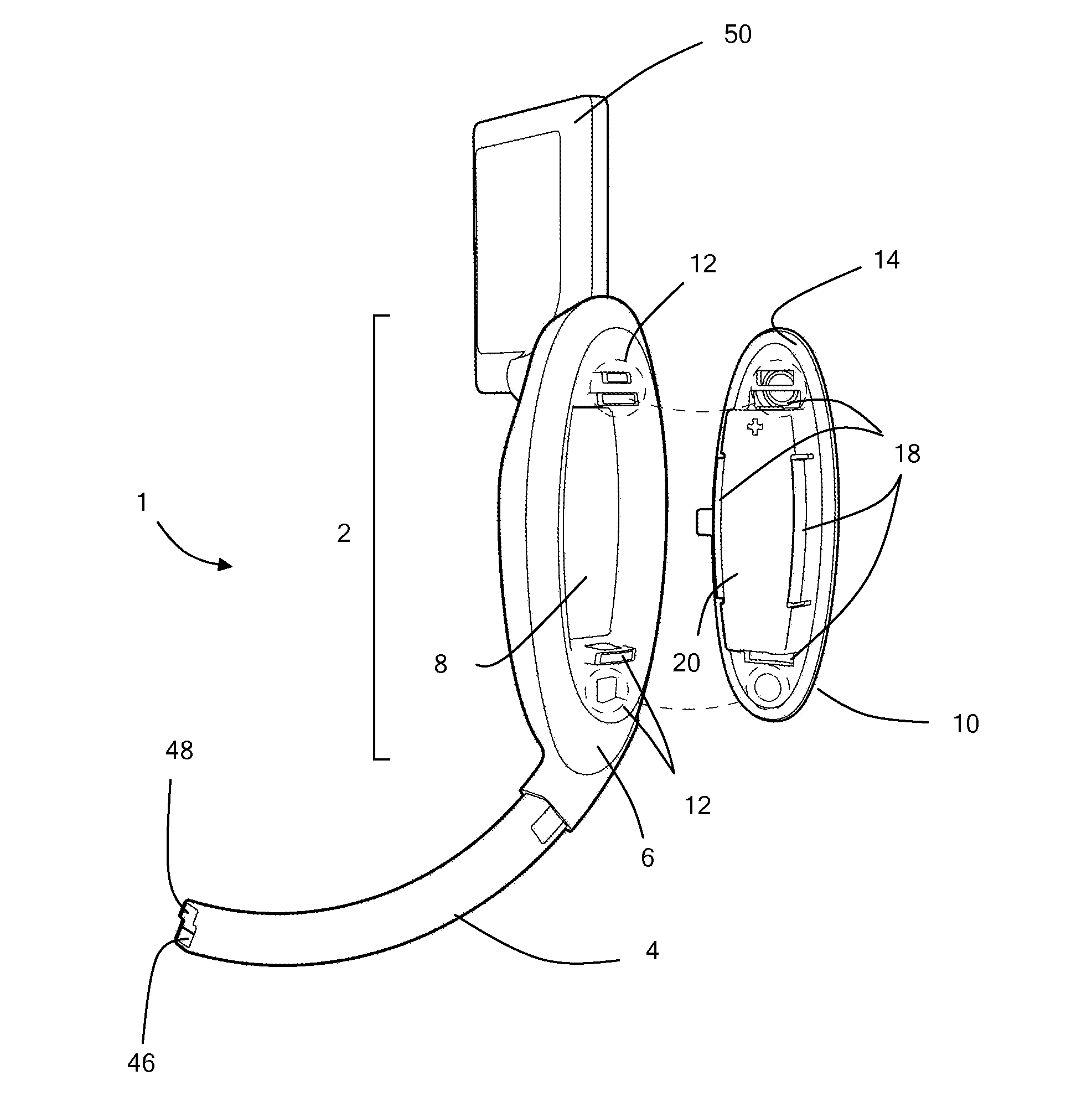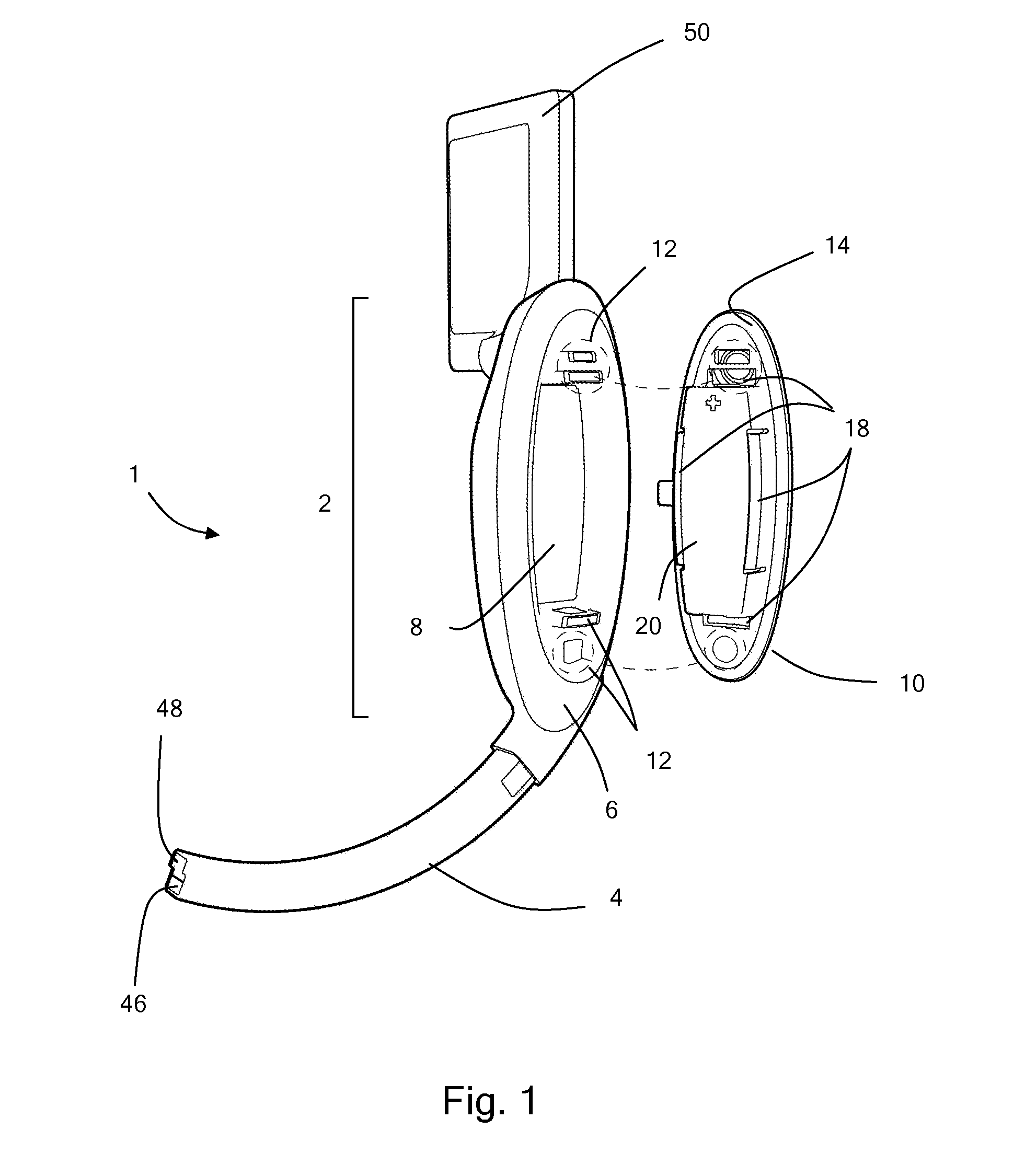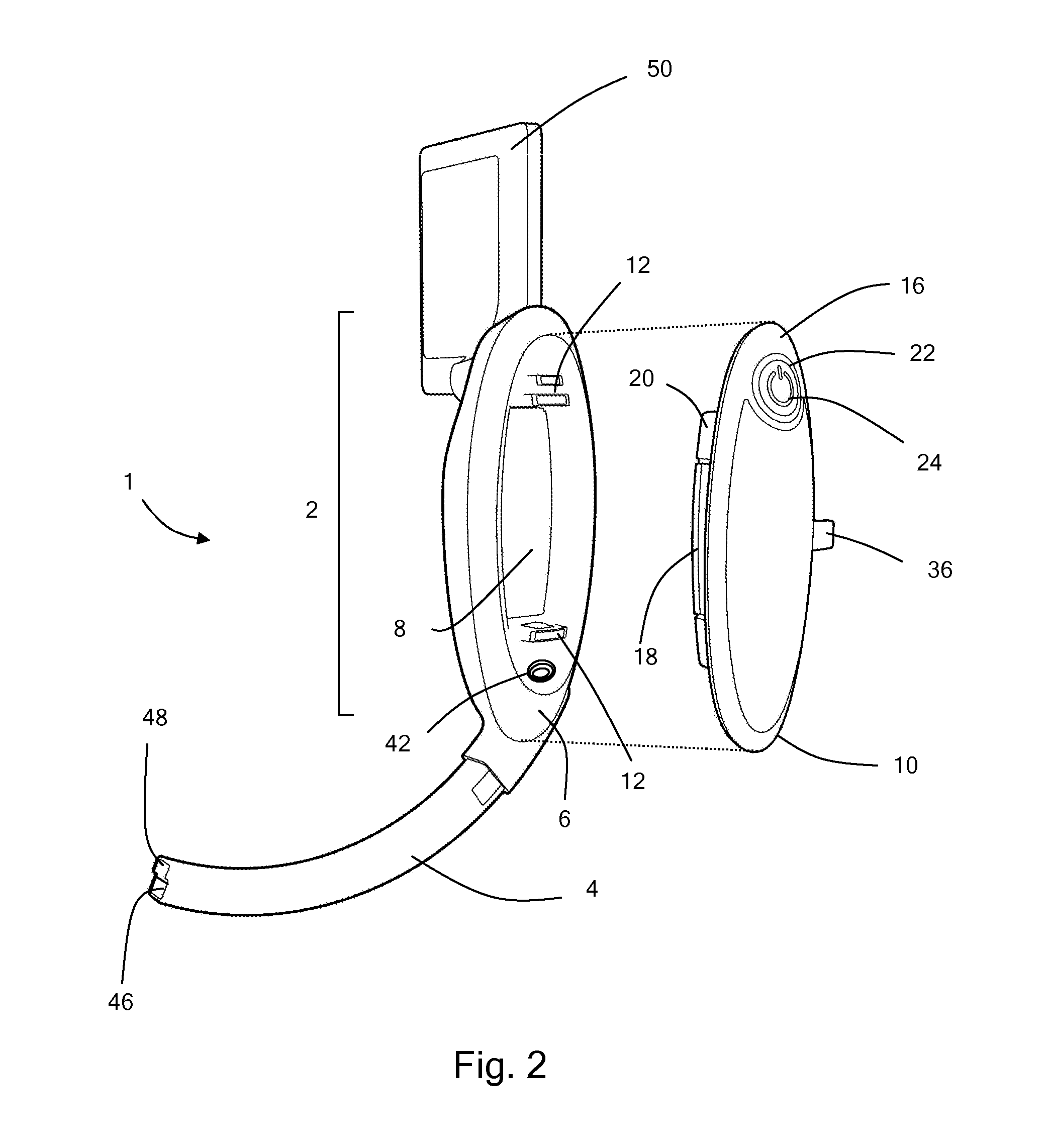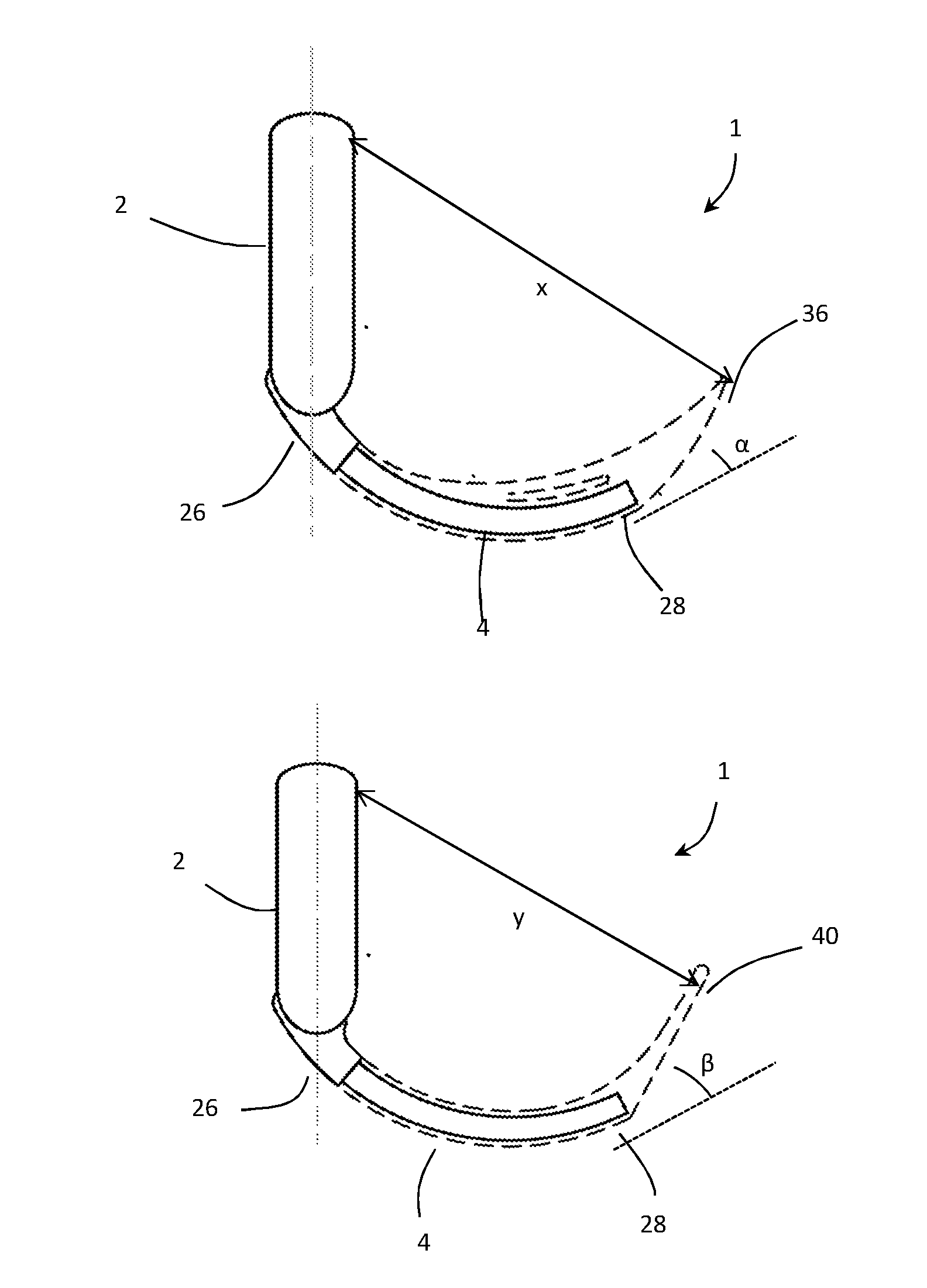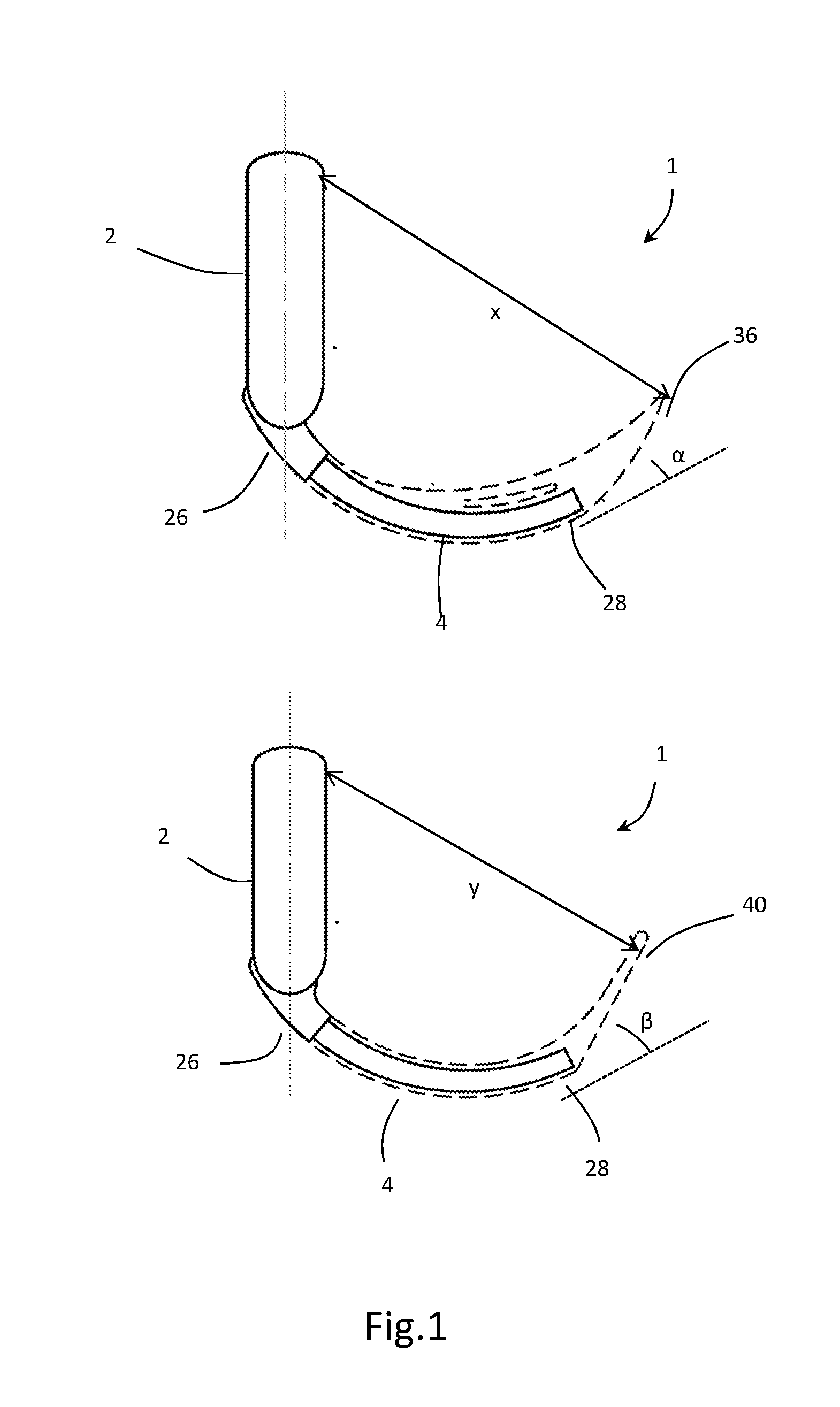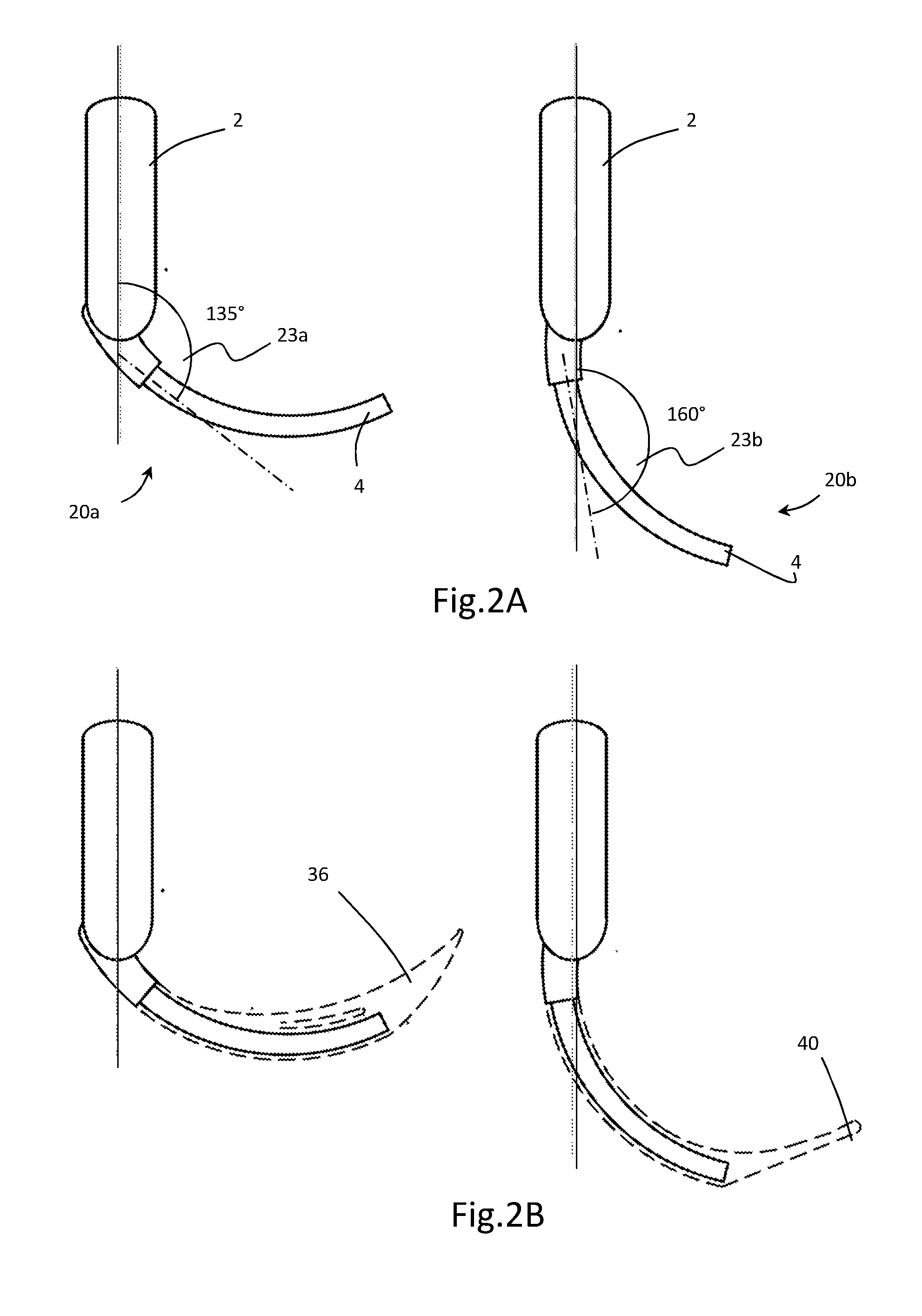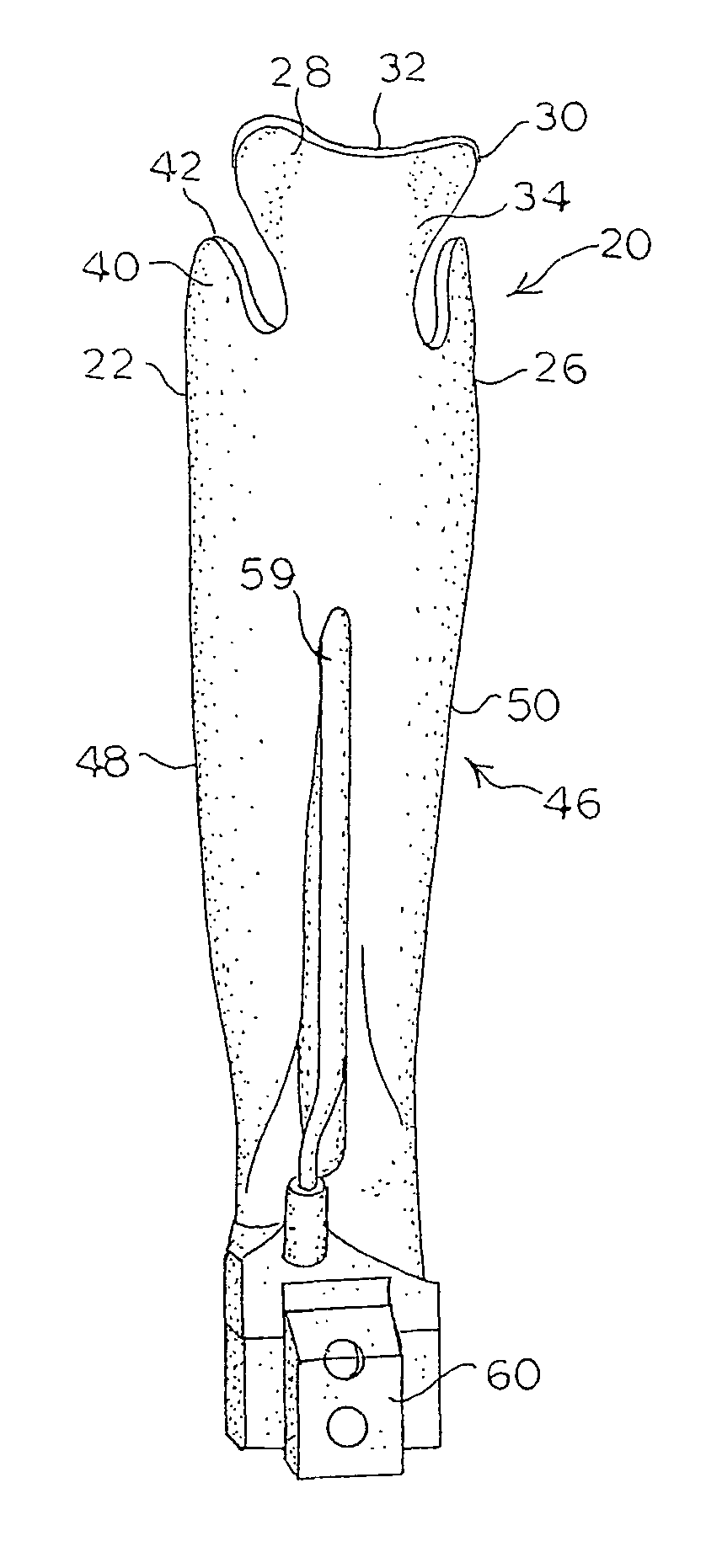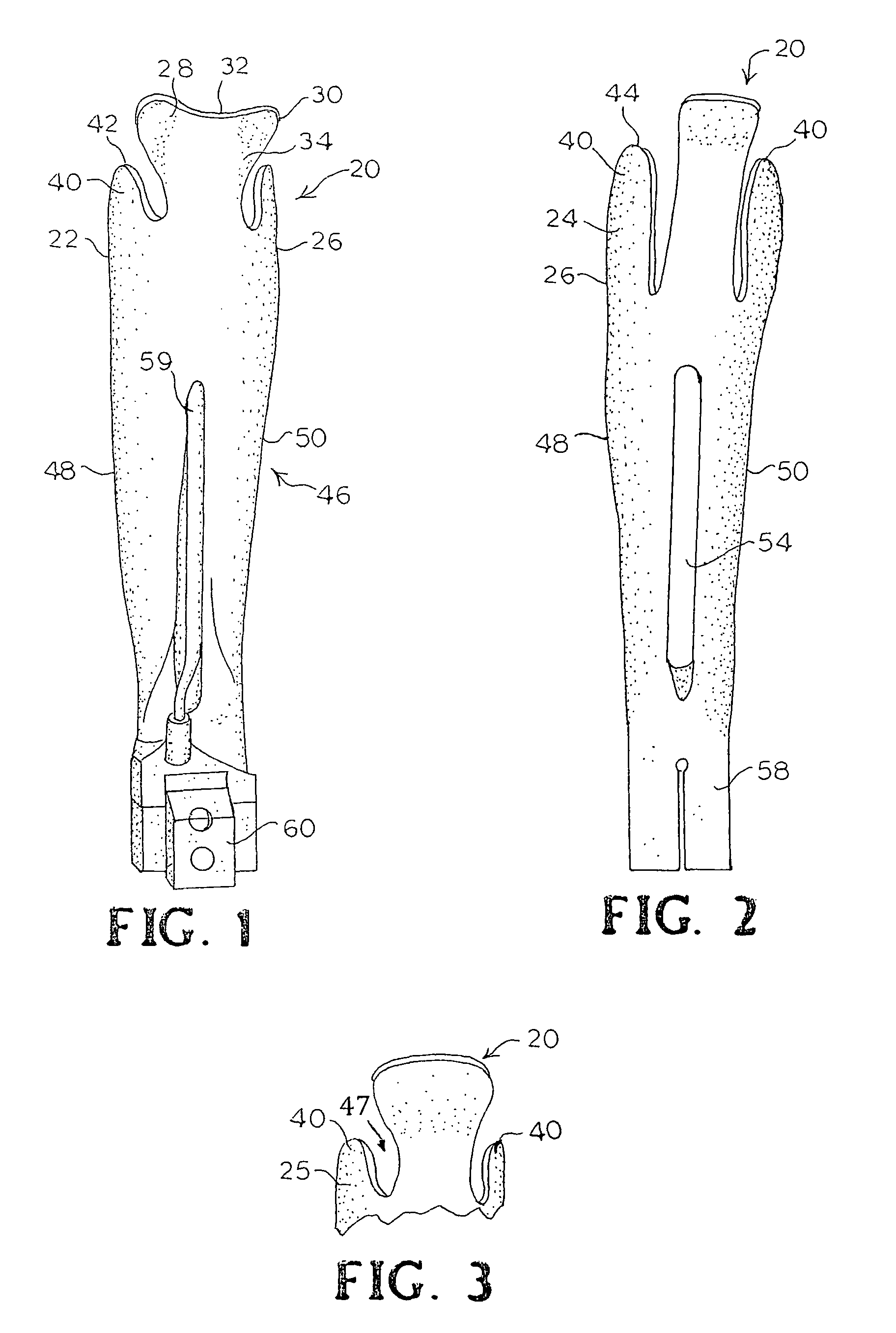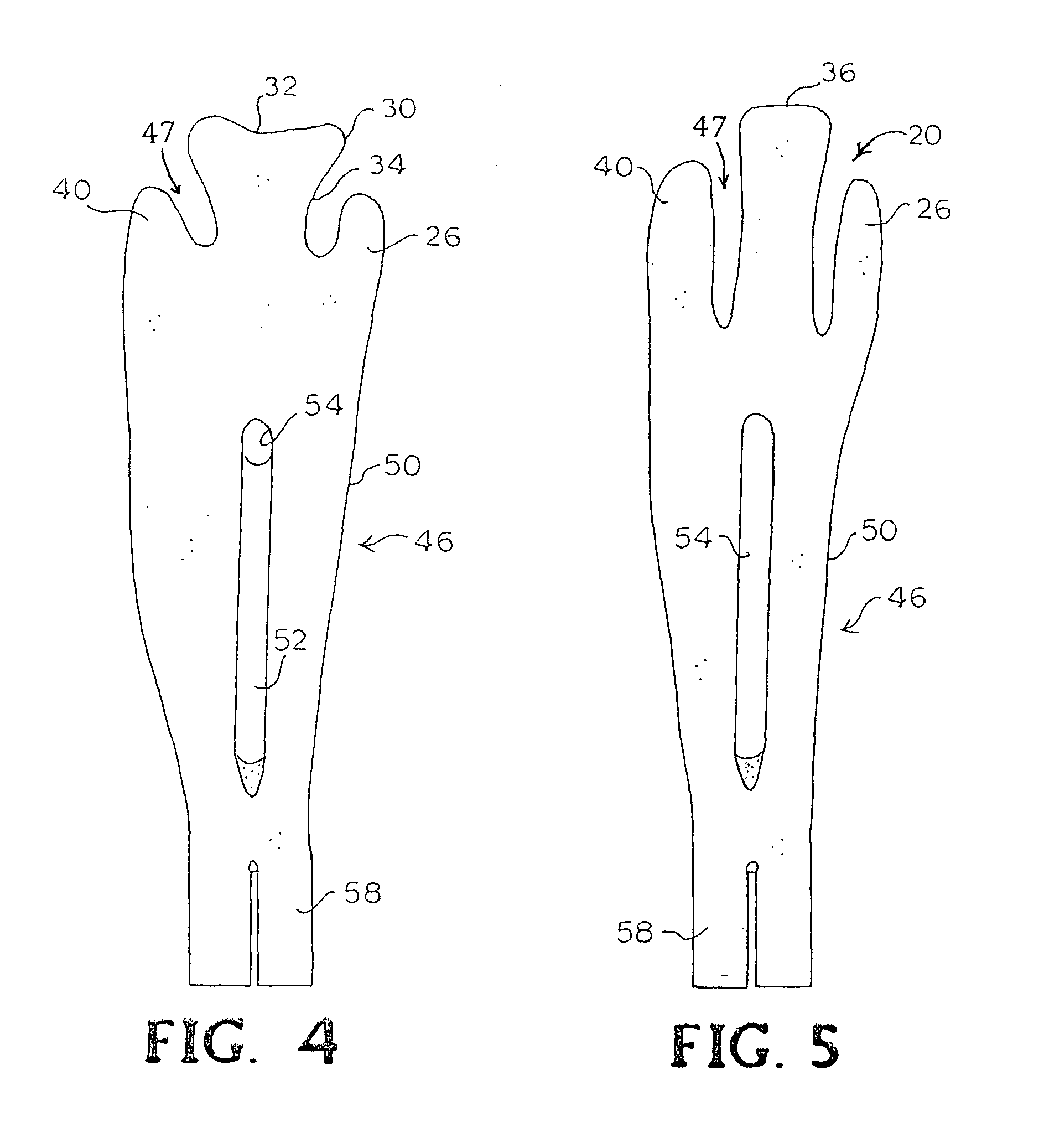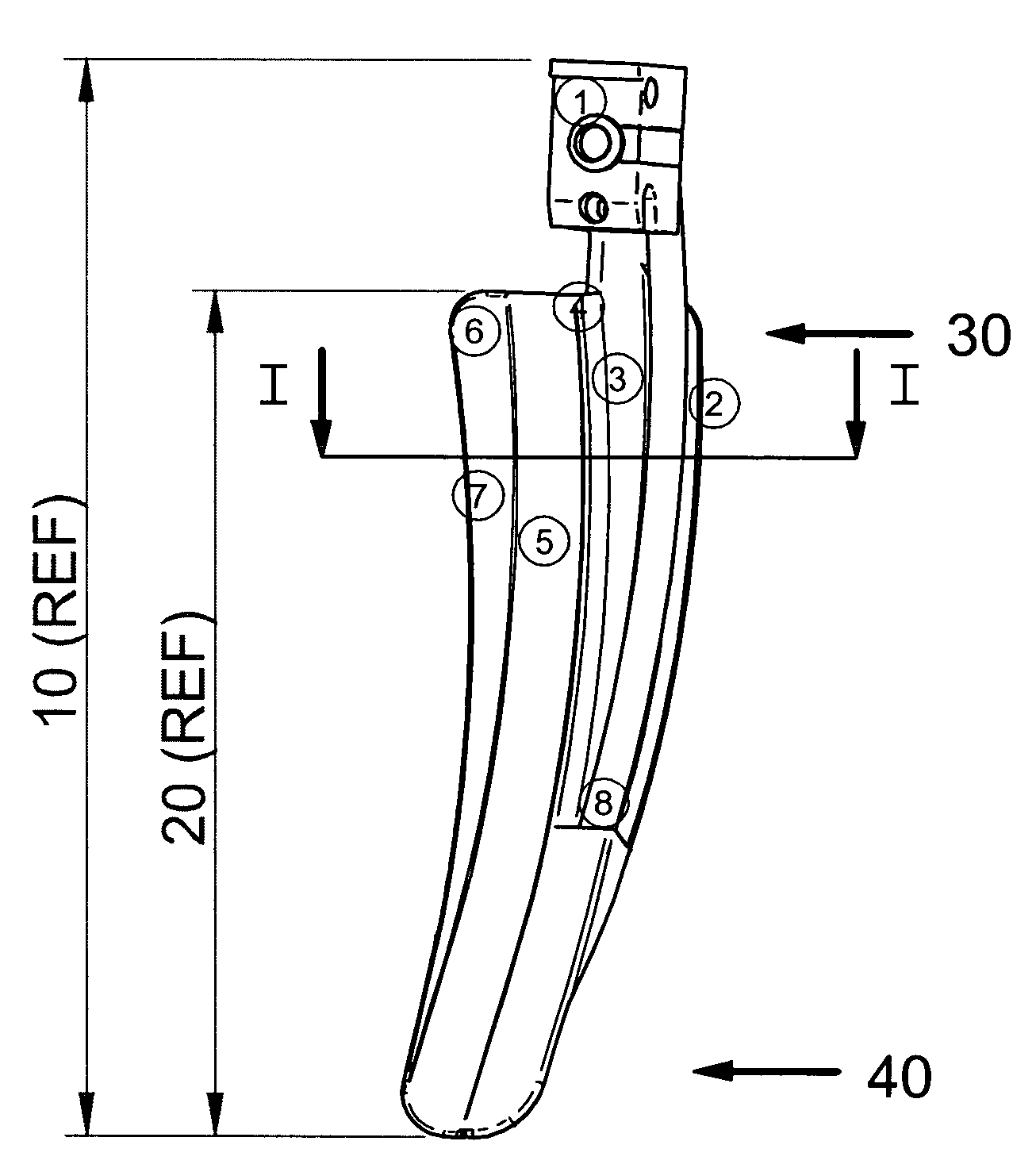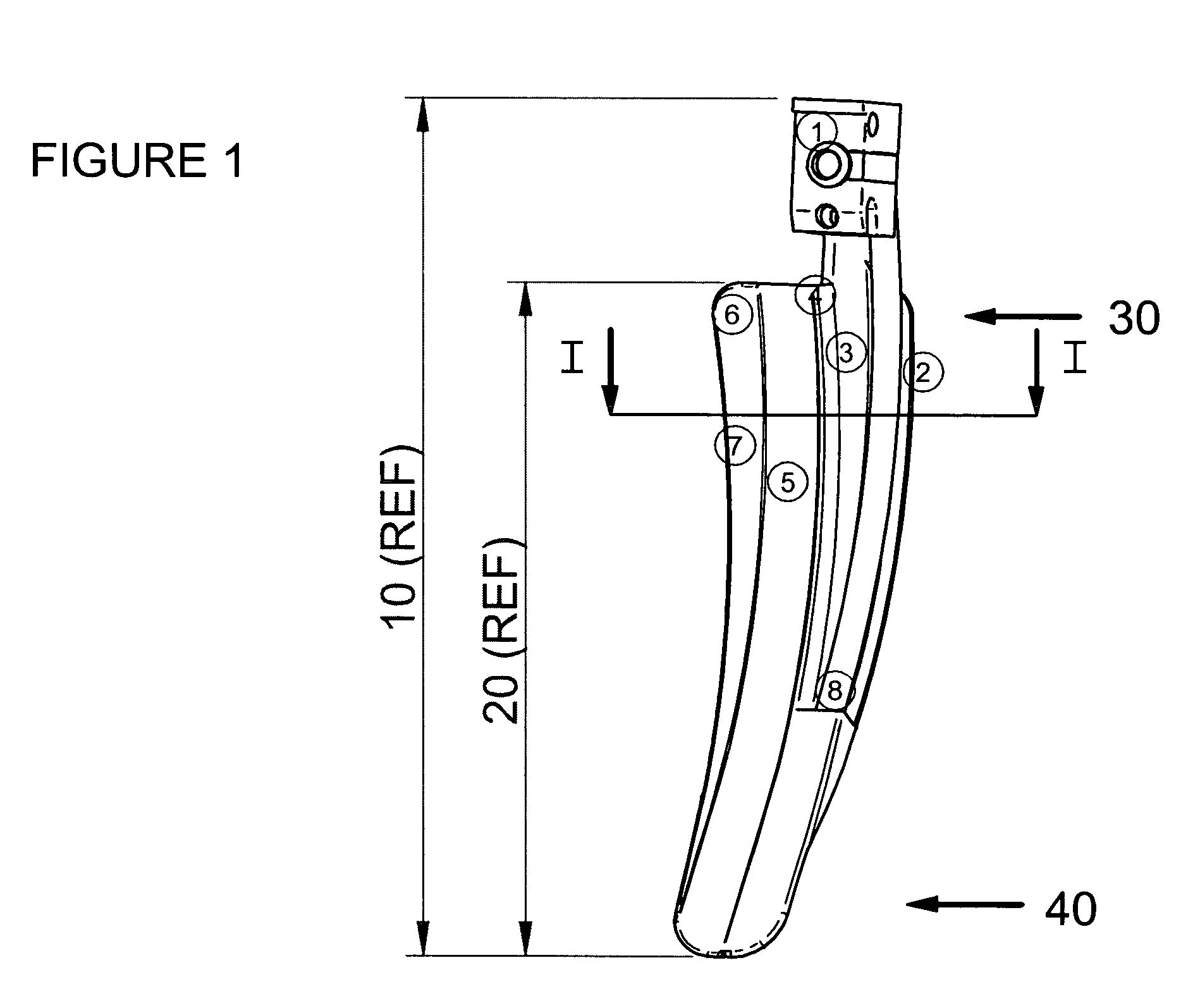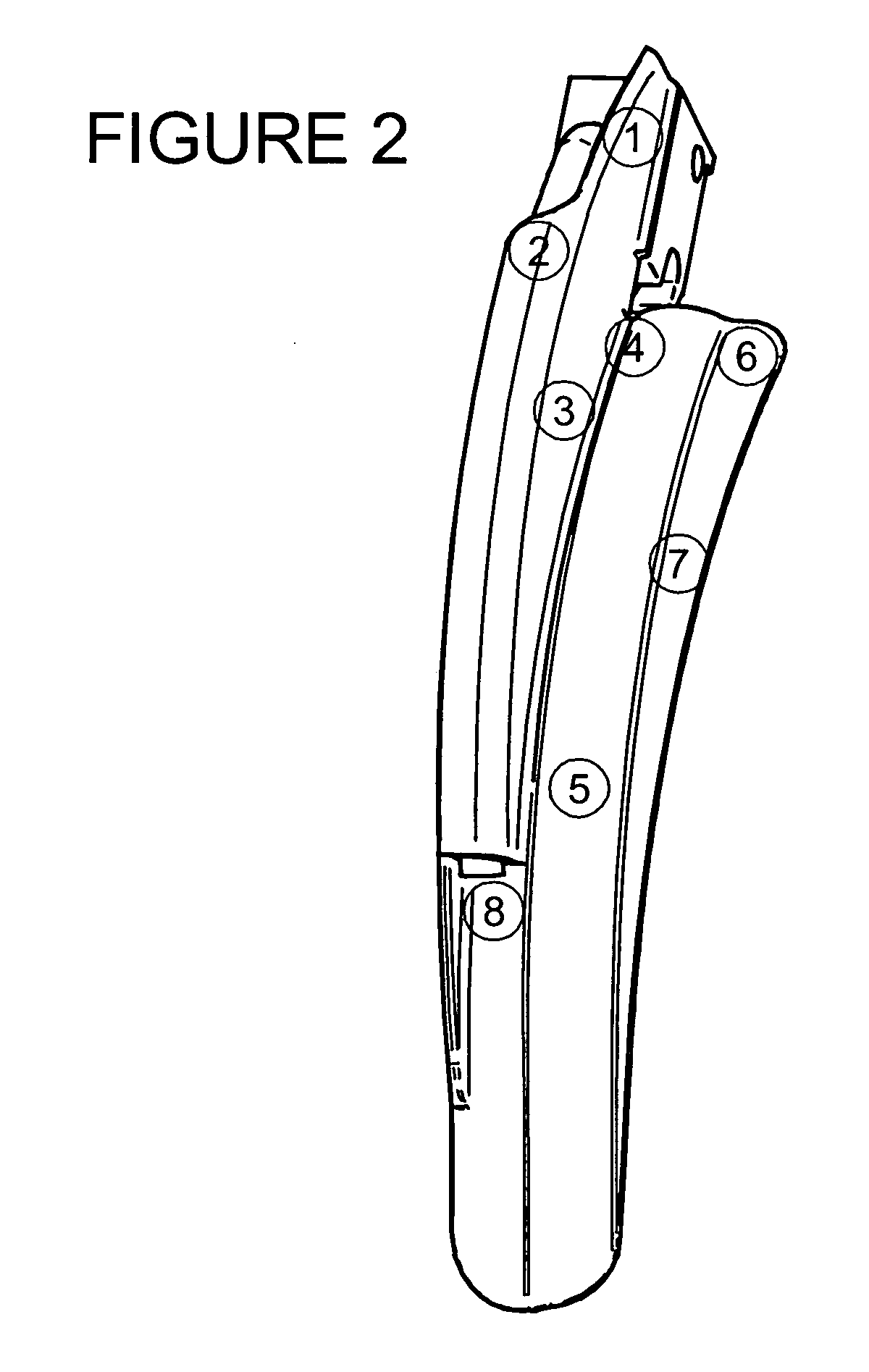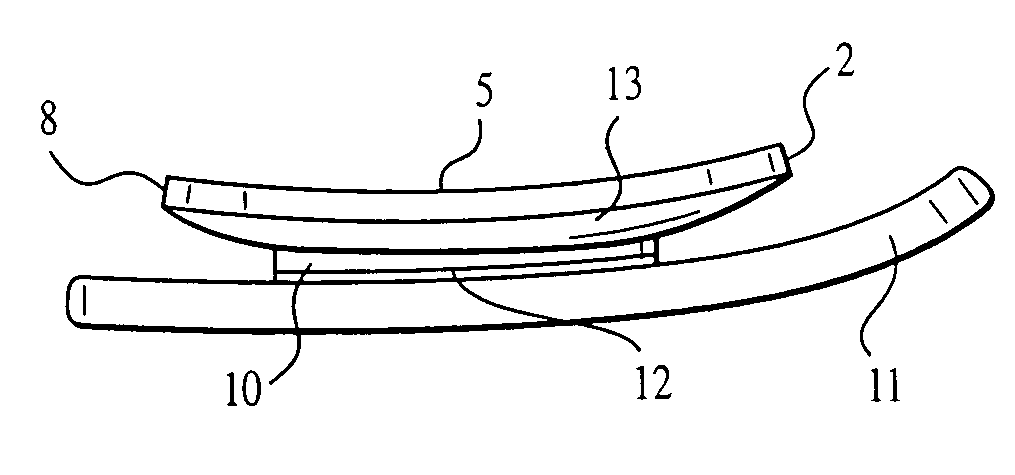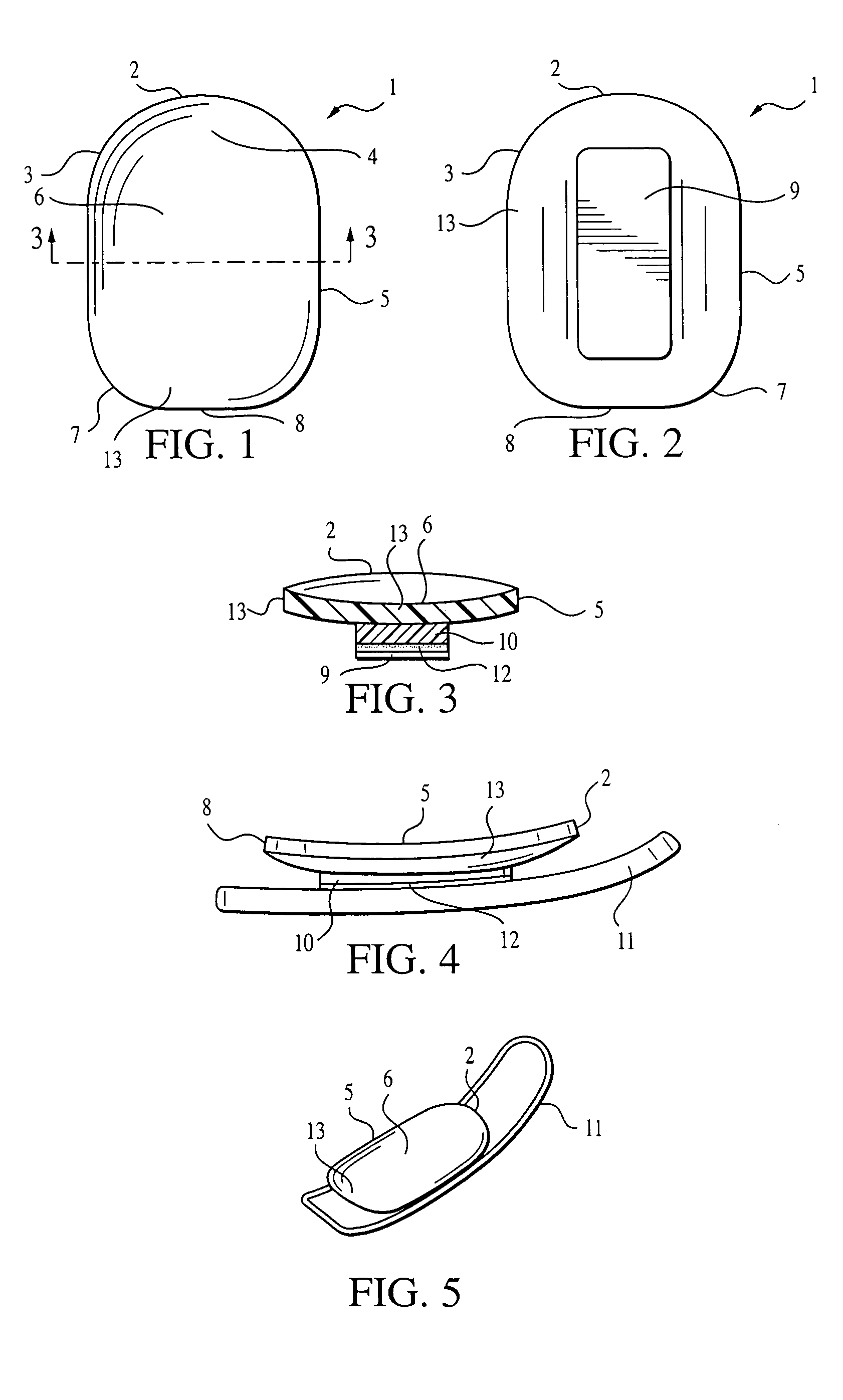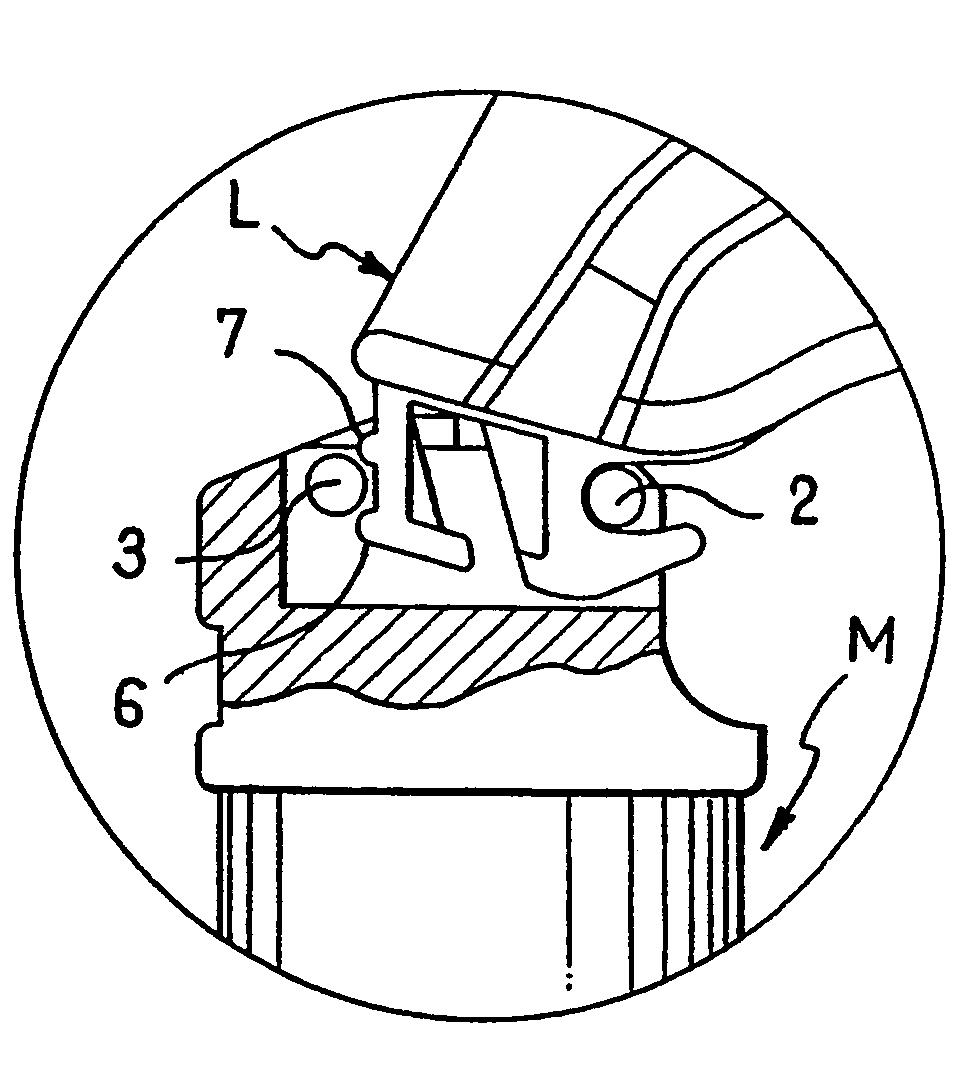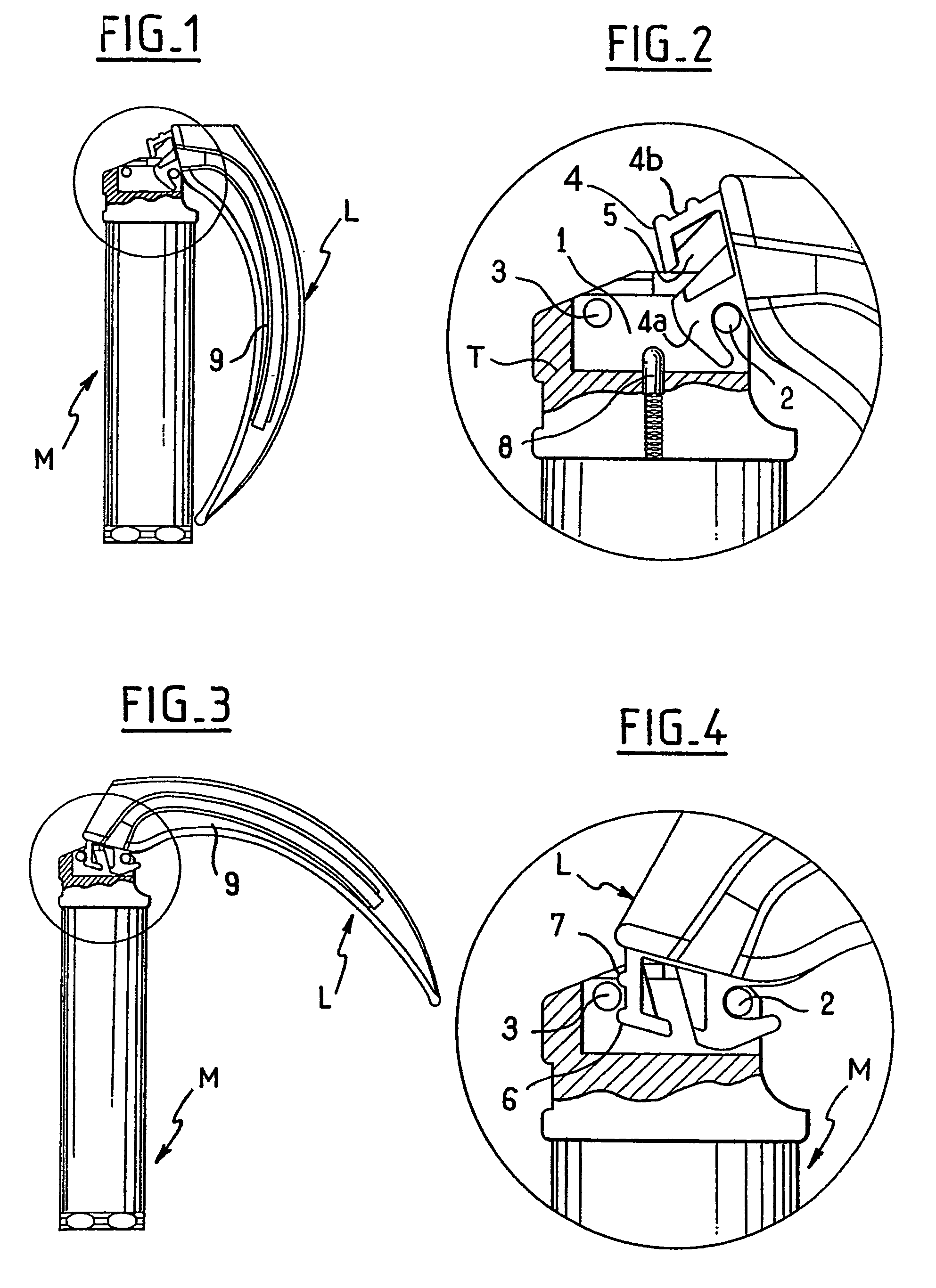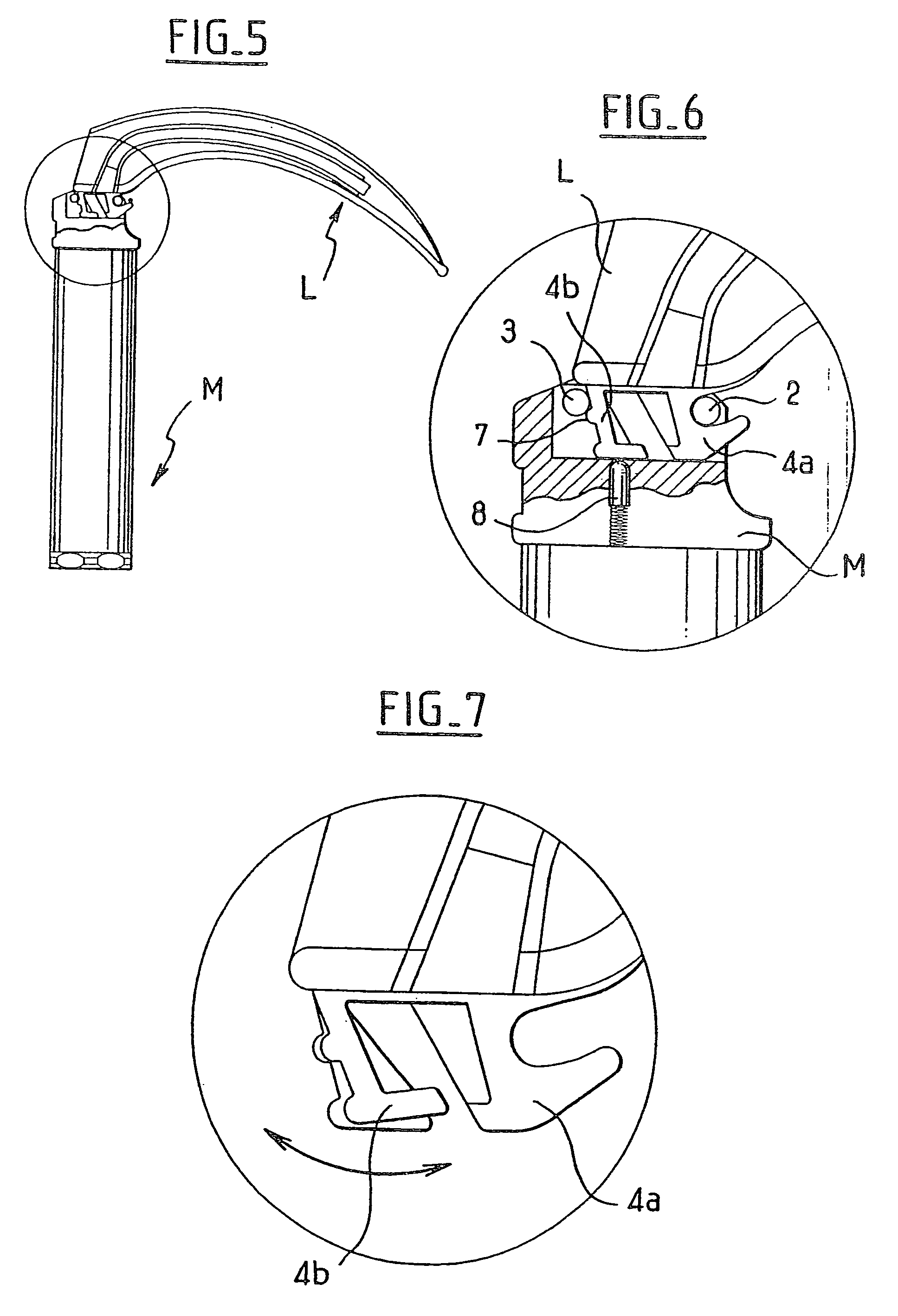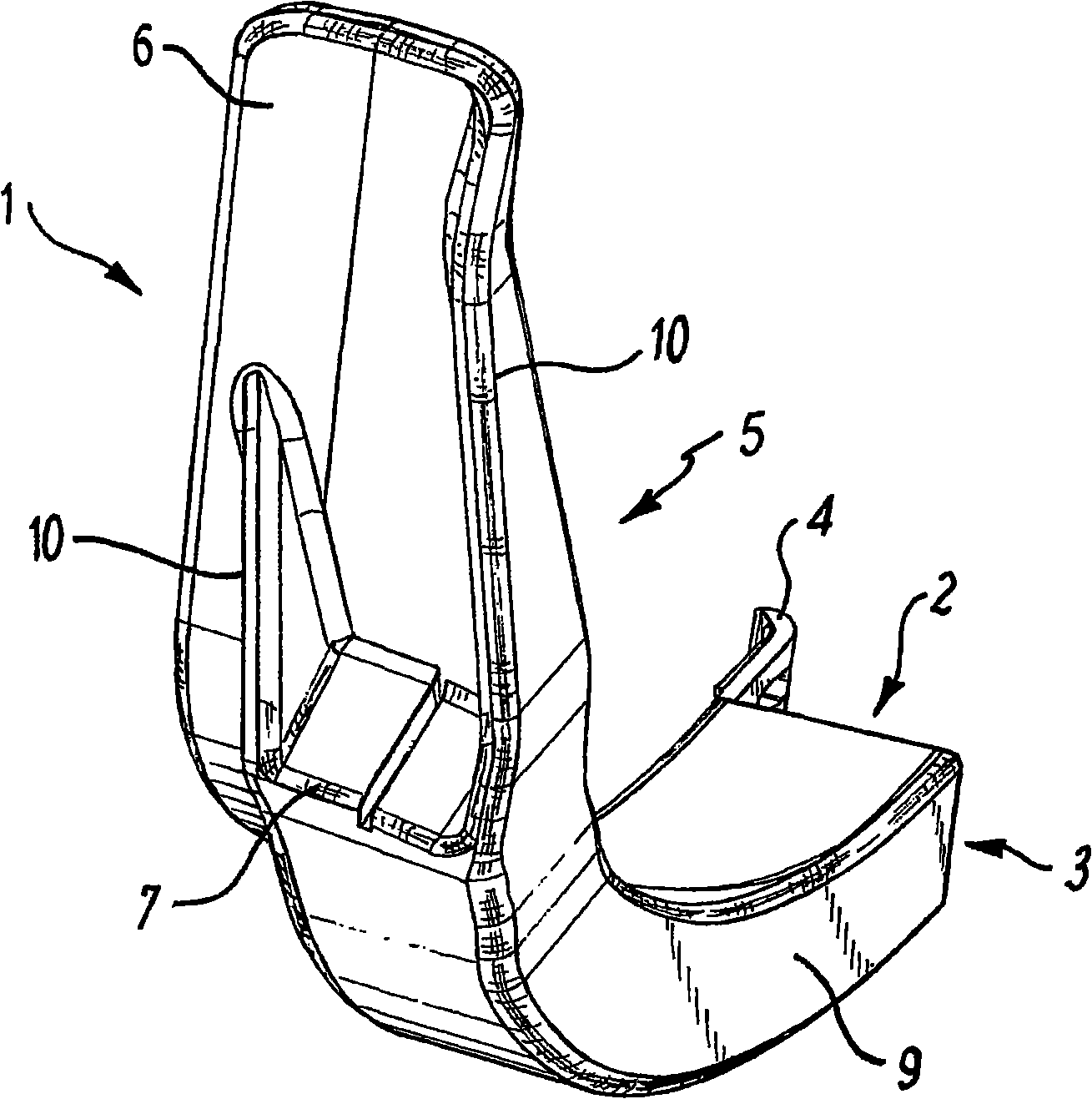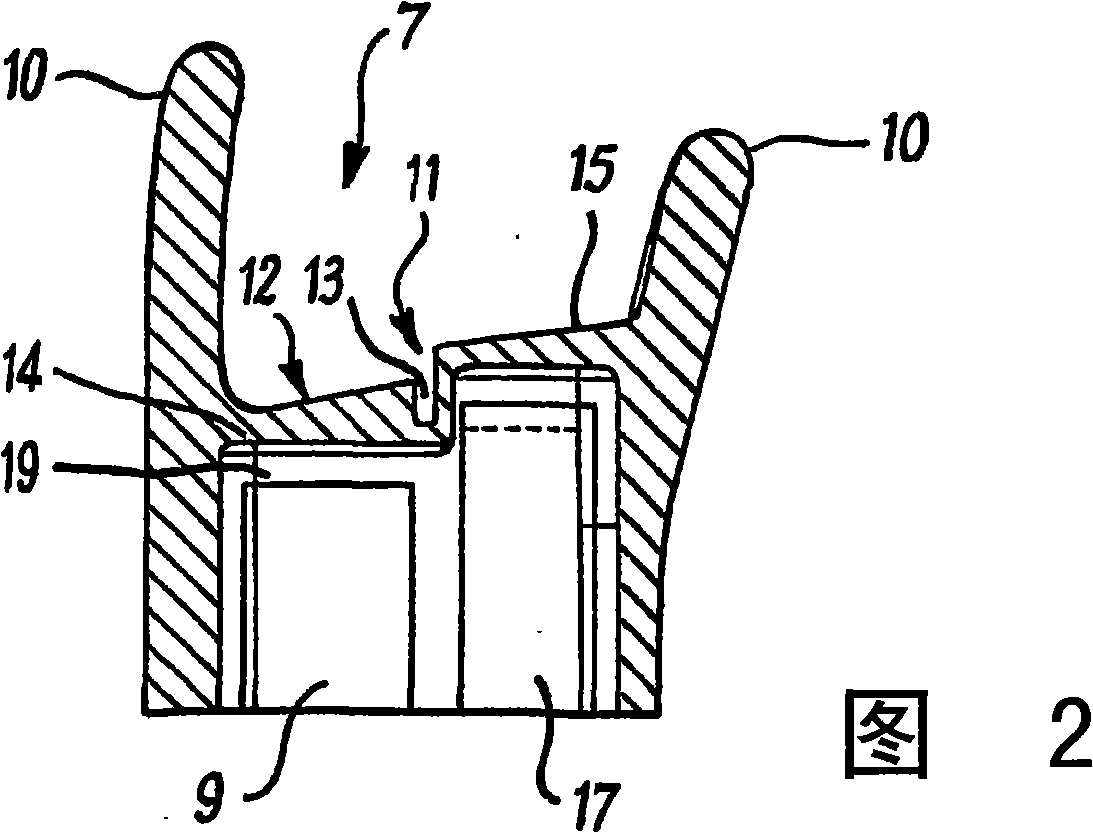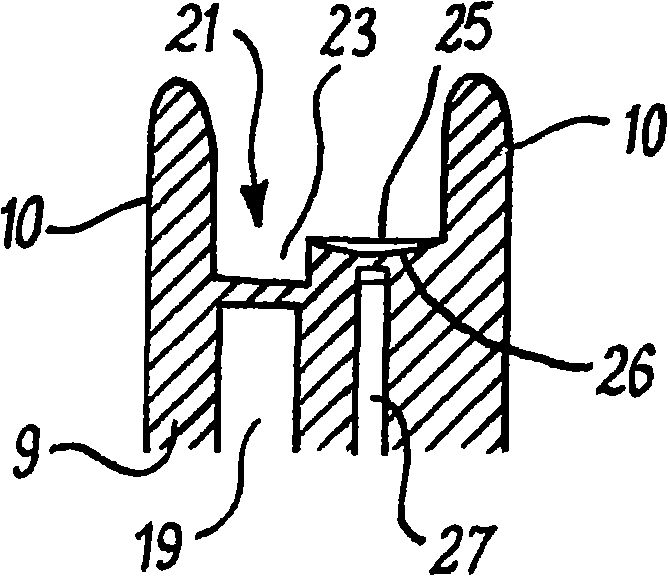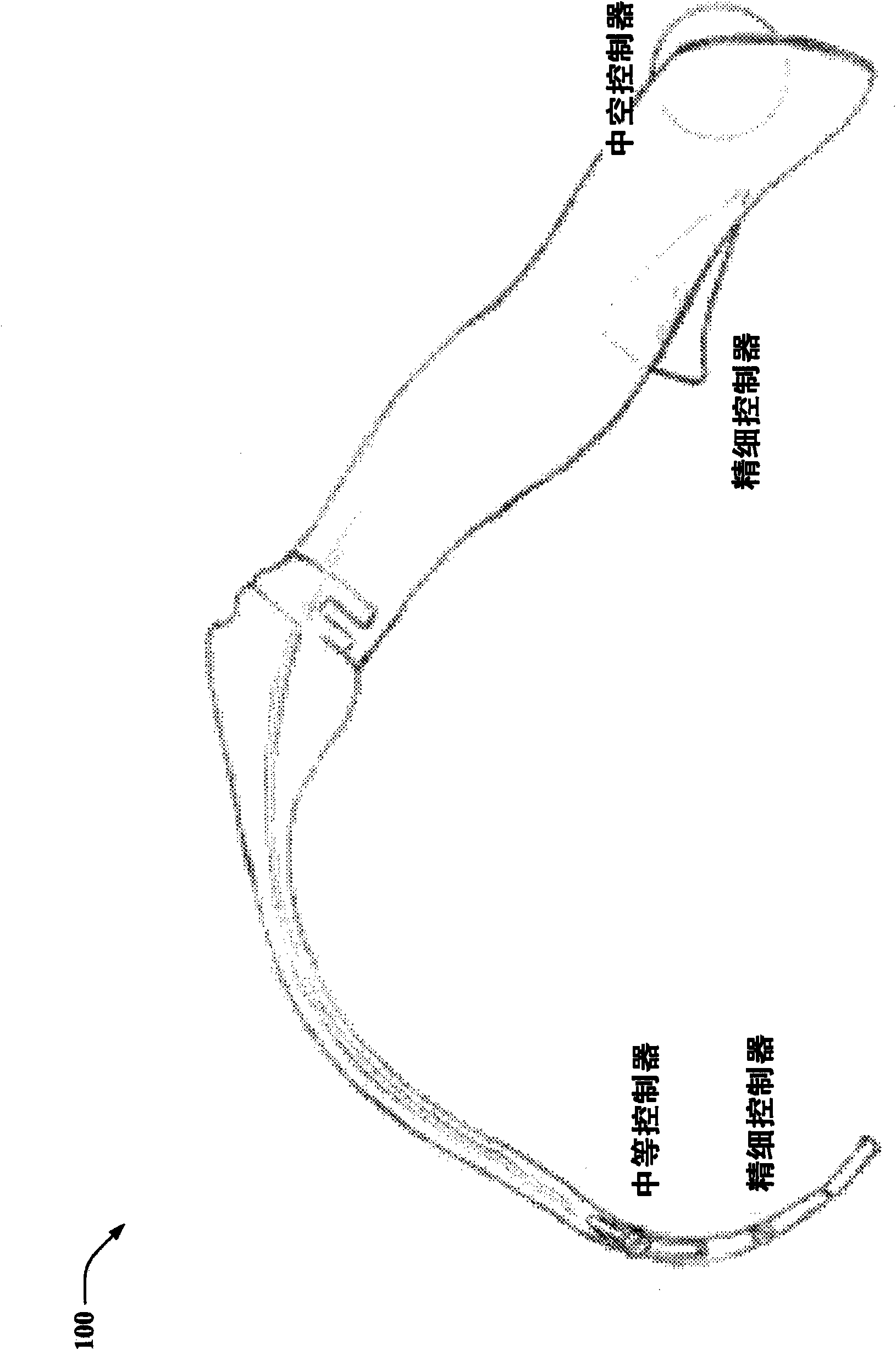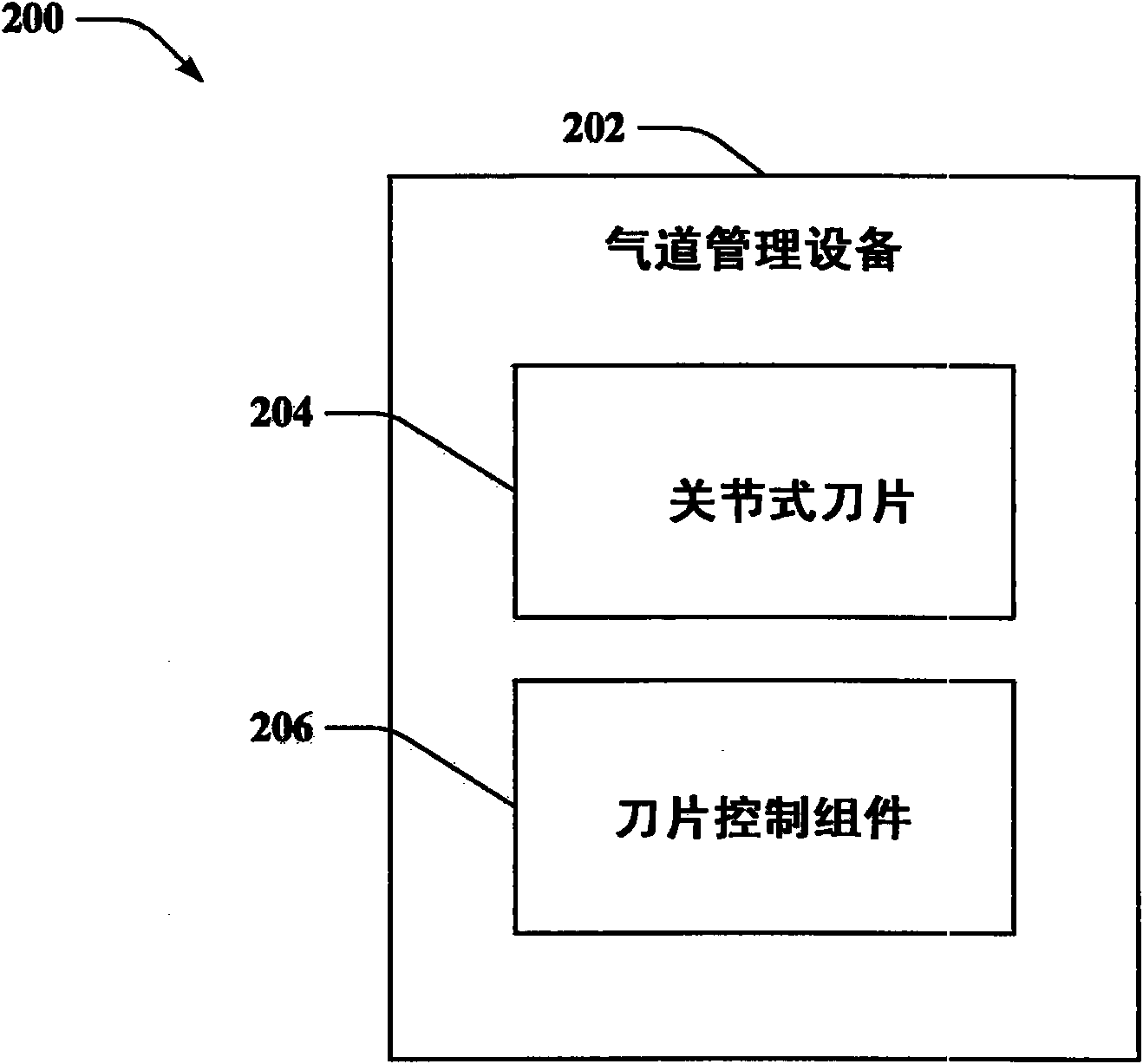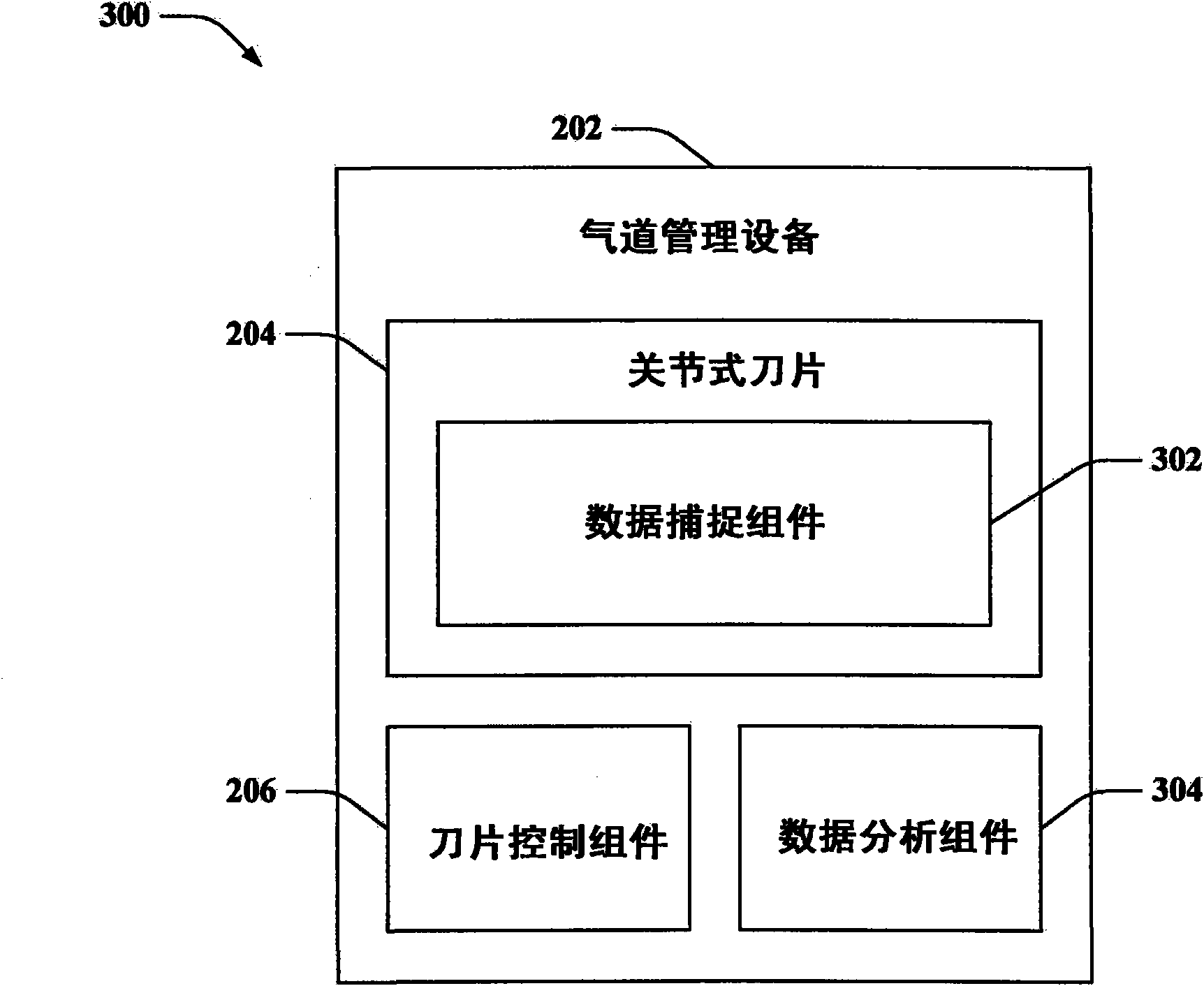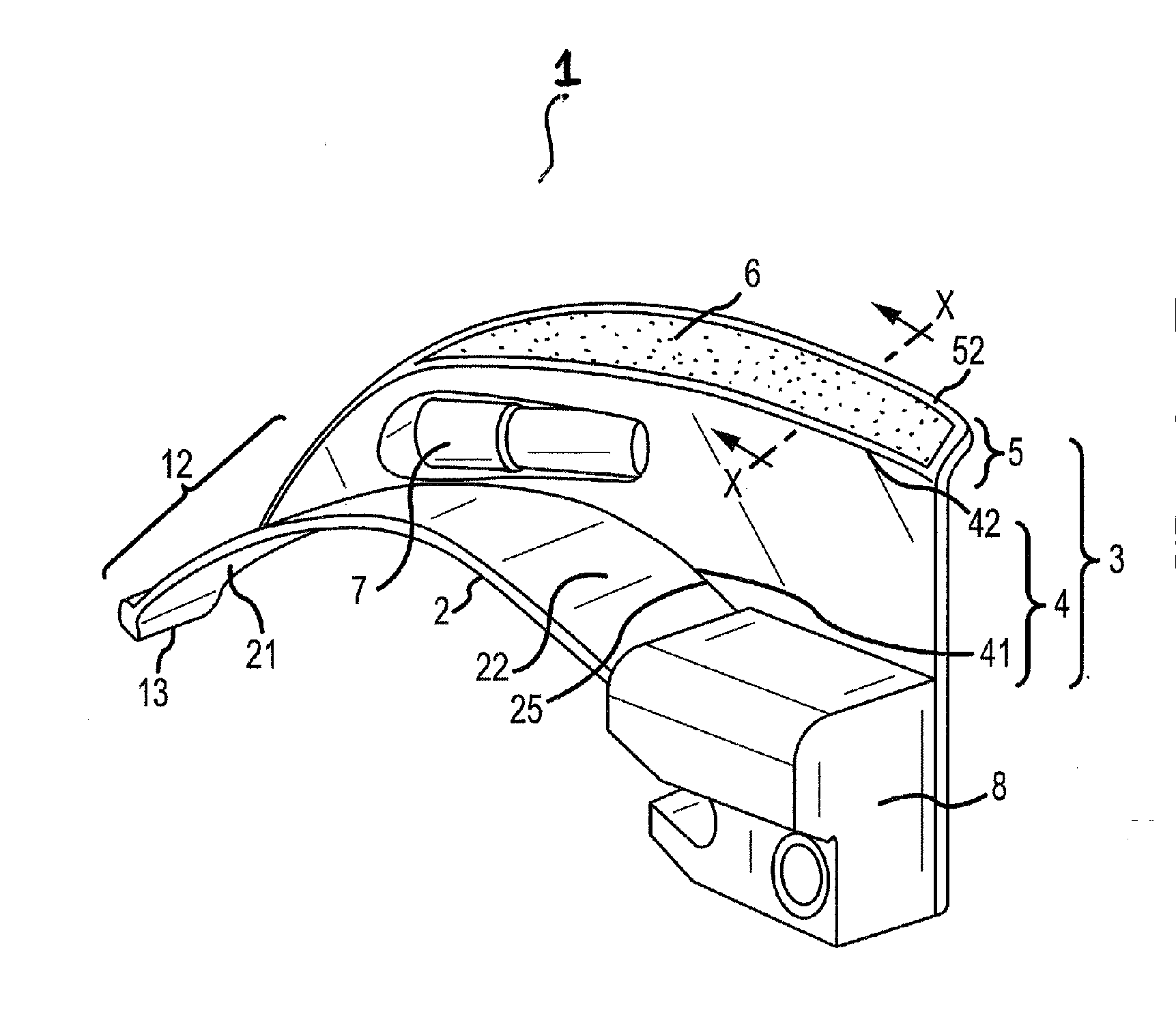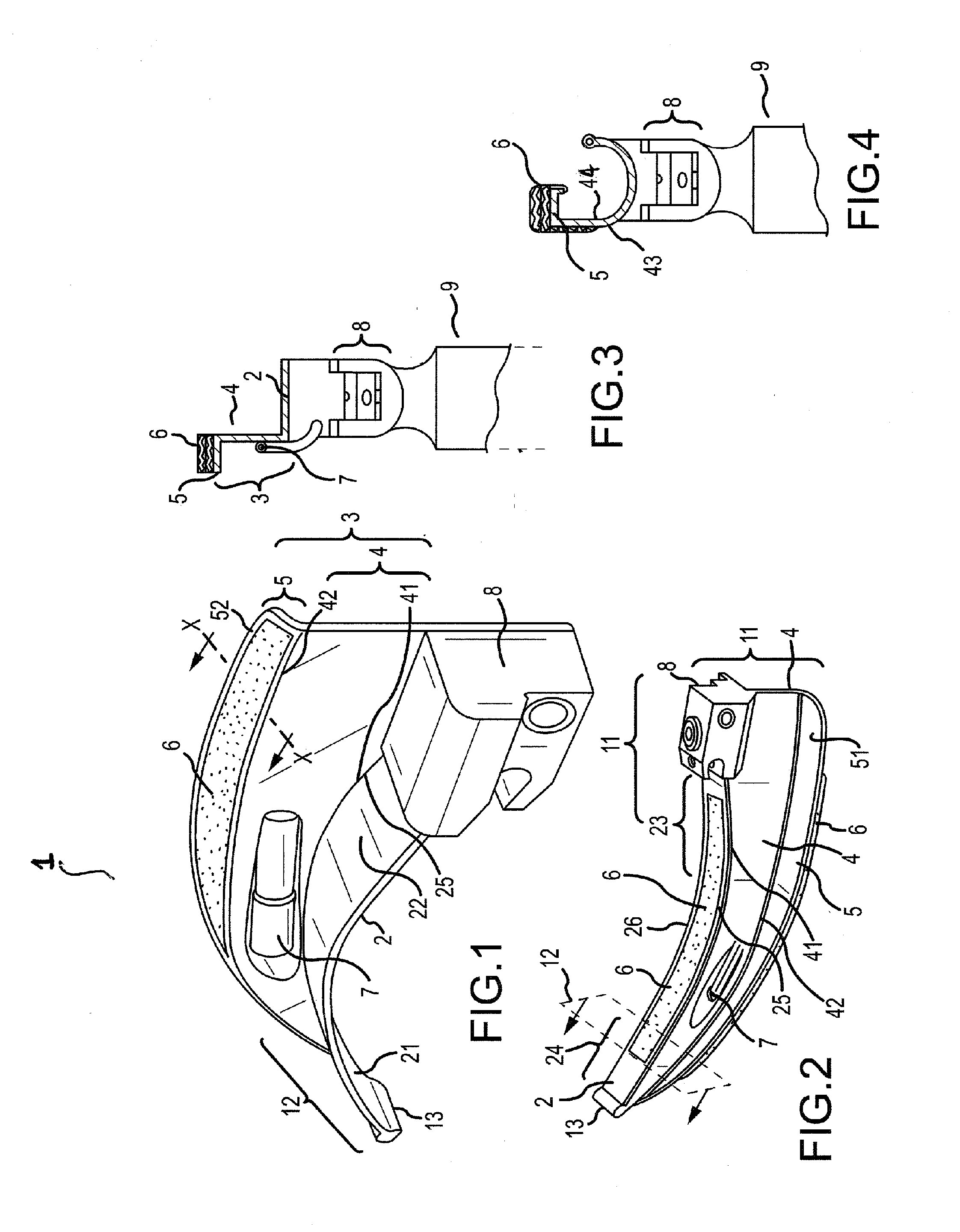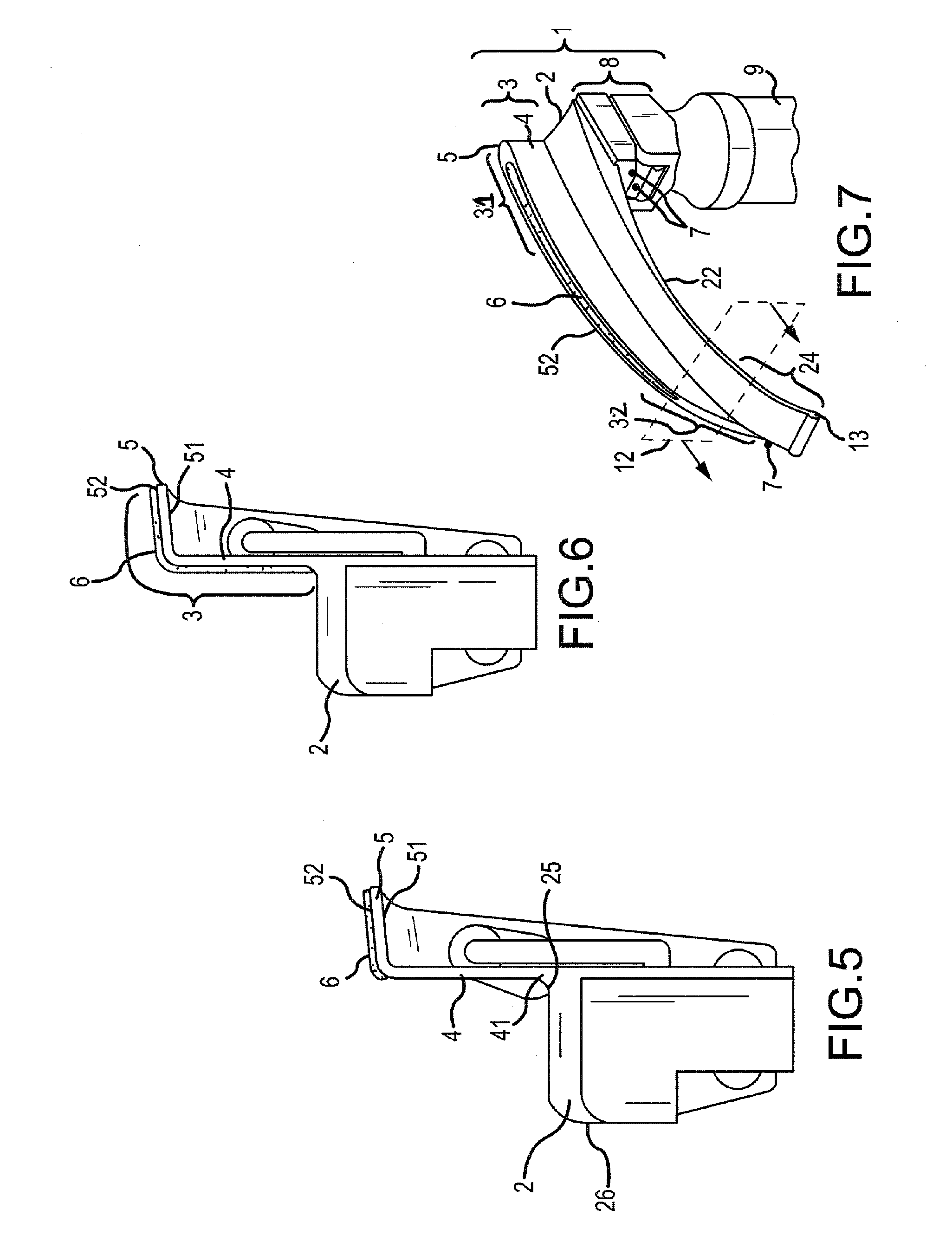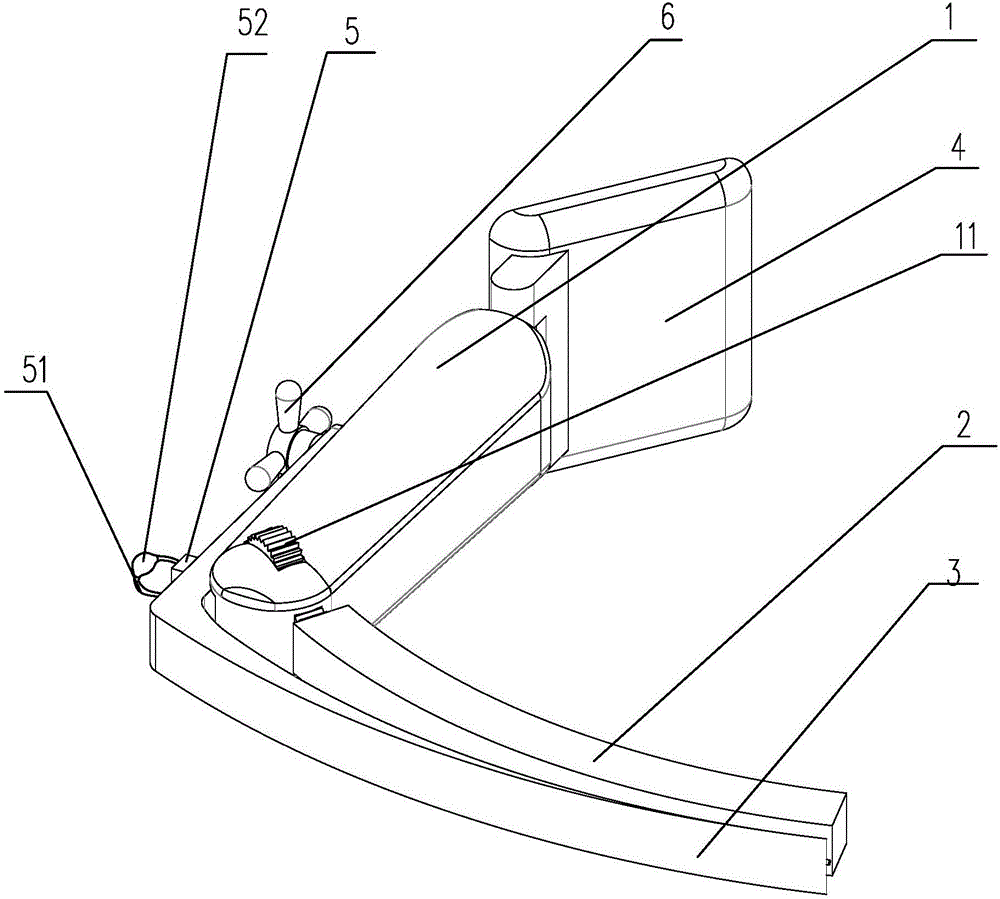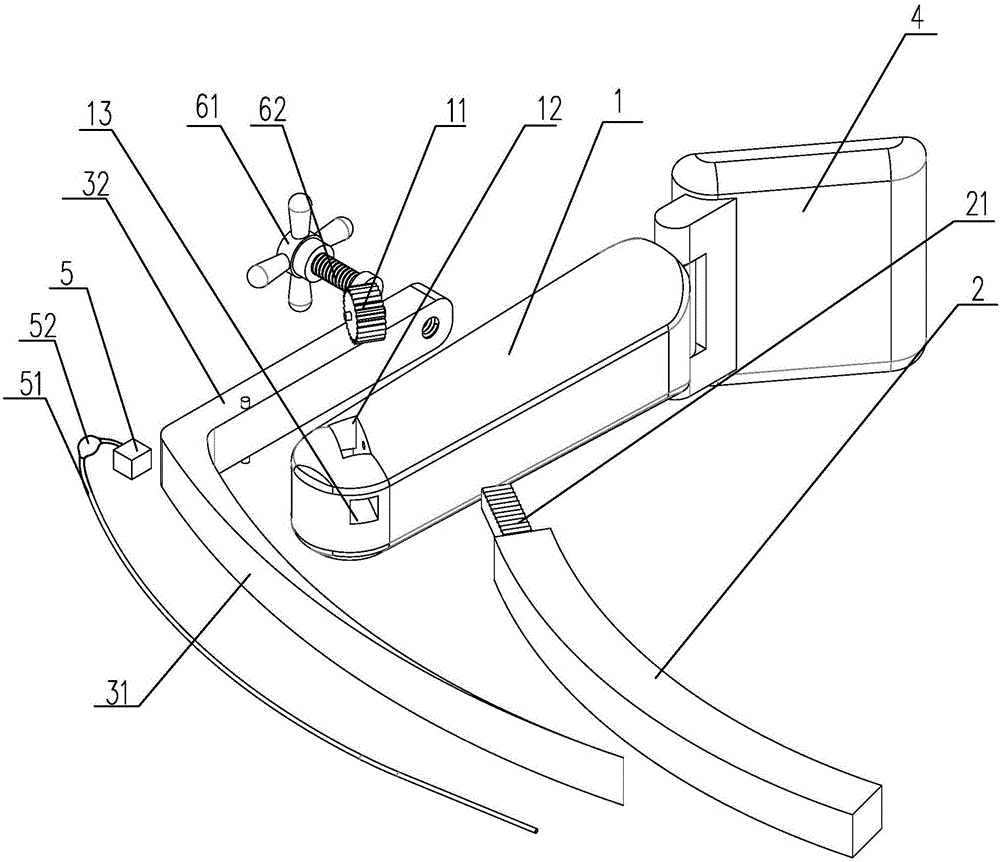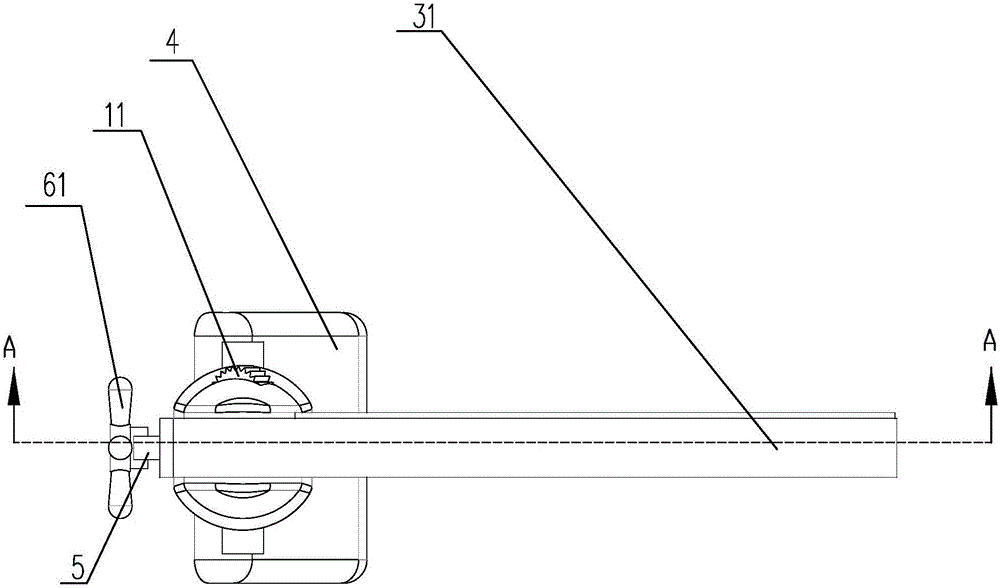Patents
Literature
Hiro is an intelligent assistant for R&D personnel, combined with Patent DNA, to facilitate innovative research.
94 results about "Laryngoscope blade" patented technology
Efficacy Topic
Property
Owner
Technical Advancement
Application Domain
Technology Topic
Technology Field Word
Patent Country/Region
Patent Type
Patent Status
Application Year
Inventor
Wireless video stylet with display mounted to laryngoscope blade and method for using the same
InactiveUS20090192350A1Avoiding and minimizingAvoid and minimize traumaBronchoscopesLaryngoscopesWireless videoDisplay device
A scope adapted for insertion and manipulation in a difficult pathway is disclosed. The scope comprises at least one module for manipulating the scope. The scope may further comprise an illumination source, an image sensor, a power source, and a viewing member for viewing images of a cavity or other anatomical member of a patient. In one embodiment the scope is intended to facilitate insertion of an intubating device, which comprises an elongated semi-rigid stylet including first and second ends and at least one inner lumen connected to a module. Additionally, a flexible tip is provided for manipulating one end of the scope and allowing greater flexibility when maneuvering a difficult pathway. A method for navigating a difficult pathway and for using the apparatus described herein is also disclosed.
Owner:MEJIA MAURICIO
Video adapter for laryngoscope
A portable, low power, low cost, video adapter for a common laryngoscope, having a slim self-illuminating CMOS camera, attachable with a disposable bracket to the laryngoscope blade and connected via flexible wire to the miniature battery powered color LCD monitor that is detachably mounted either on the wrist band or on top of laryngoscope handle.
Owner:LASER VADIM
Self-cleaning wireless video stylet with display mounted to laryngoscope blade and method for using the same
InactiveUS20100094090A1Avoiding and minimizing patient traumaAvoid and minimize traumaBronchoscopesLaryngoscopesWireless videoDisplay device
A scope adapted for insertion and manipulation in a difficult pathway is disclosed. The scope comprises at least one module for manipulating the scope. The scope may further comprise an illumination source, an image sensor, a power source, and a viewing member for viewing images of a cavity or other anatomical member of a patient. In one embodiment the scope is intended to facilitate insertion of an intubating device, which comprises an elongated semi-rigid stylet including first and second ends and at least one inner lumen connected to a module. Additionally, a flexible tip is provided for manipulating one end of the scope and allowing greater flexibility when maneuvering a difficult pathway. In another embodiment, fluids are provided through an interior portion of the scope, allowed to at least partially contact the lens located at the distal end of the scope, and subsequently cleanse or defog the lens for improving vision via the scope. A method for navigating a difficult pathway and for using the apparatus described herein is also disclosed.
Owner:MEJIA MAURICIO
Metal laryngoscope blade
Owner:TELEFLEX LIFE SCI PTE LTD
Disposable laryngoscope blades
InactiveUS7128710B1Suitable for useGood chemical resistanceBronchoscopesLaryngoscopesFiberEngineering
A laryngoscopes blade of the disposable variety for use with a Fiber Optic Green System Handle having a blade portion made from stainless steel and a heel portion made from thermoplastic resin.
Owner:SUNMED
Video Laryngoscope Systems
ActiveUS20160095506A1Enhancement in definitionBronchoscopesTracheal tubesVideo laryngoscopeLaryngoscope handle
Video laryngoscope system including a video laryngoscope having a laryngoscope handle and a laryngoscope blade. The video laryngoscope system includes an image capture module with at least two stationary imaging units spaced apart along the laryngoscope blade for providing real-time video streams of a patient's airway passage during an intubation and a controller for enabling a clinician performing the intubation to select one or more of the real-time video streams for real-time display on a display screen to assist intubation of a patient.
Owner:TELEFLEX LIFE SCI PTE LTD
Laryngoscope and Method of Use
ActiveUS20120330103A1Improve visualizationGood colorTracheal tubesBronchoscopesLaryngoscope handleUltraviolet lights
A laryngoscope device for use in the performance of direct laryngoscopy, the device including a laryngoscope blade portion connectable to a laryngoscope handle through a connector, the laryngoscope blade comprising an ultraviolet light, a white light and an imaging or viewing device at the same distance relative to the distal end of the laryngoscope blade.
Owner:SALTER LABS LLC
System and method of training the proper placement of airway adjuncts in a training manikin
A system and method of training the proper placement of an endotracheal tube in a training manikin's trachea using a live video camera located inside the manikin for simultaneous remote display of the manikin's trachea and surrounding area and the relative positioning of the laryngoscope blade and endotracheal tube. The system includes a training manikin, a micro video camera mounted adjacent the nasal cavity of the manikin, with the camera directed at the trachea, a monitor displaying the images being captured by the video camera, and electrical connection connecting the video camera to said monitor.
Owner:DESALVO ANTONINO
Laryngoscope
A laryngoscope 10 includes an elongate blade 20 for insertion into the patient, a handle 12 for manipulating the blade, and a connecting member 30 interconnecting the blade and the handle. The handle axis 14 is laterally spaced from a plane of a blade axis 22 such that the handle is exterior of the patient's mouth when manipulating the blade. In one embodiment, the connecting member 30 has a connecting member axis 34 angled at about 90° relative to the plane of the blade axis 22. The laryngoscope blade is removably connected to the handle, and is fixably secured to the blade.
Owner:HOWARD GREGORY L
Modified laryngoscope blade to reduce dental injuries during intubation
InactiveUS20030018239A1Reduce the possibilityImprove actionBronchoscopesLaryngoscopesNasal cavityNose
The present invention relates to the field of medical devices used in the procedures of orotracheal or nasotracheal intubation. Oral or nasal endotracheal intubation procedures are commonly employed to secure a controlled airway and to deliver inhalant oxygen, anesthetic gases, and other therapeutic agents into the trachea and lungs of human and veterinary patients. Such intubation procedures carry a significant risk of dental injury resulting from contact between the laryngoscope blade used for visualization during intubation. The present invention provides an apparatus to reduce dental injury including a modified laryngoscope blade and a disposable insert which is designed to be received and retained in a single step by the modified laryngoscope blade. The disposable insert may be quickly secured by the user, and reduces both direct pressure and shear forces on the maxillary incisor teeth when the laryngoscope blade is placed in a patient's mouth during intubation.
Owner:CARTLEDGE MEDICAL PRODS
Laryngoscope assembly with enhanced viewing capability
ActiveUS8512234B2Improve viewing effectConvenient ArrangementBronchoscopesLaryngoscopesLaryngoscope handleEngineering
A laryngoscope assembly with enhanced viewing capability including a laryngoscope handle having a permanently mounted laryngoscope optical system. The laryngoscope optical system has a view tube with a leading aperture lens for affording a field of view along a deflected line of sight viewing in an operative intubation position. The laryngoscope handle includes a laryngoscope optical system securing arrangement for mechanically securing the laryngoscope optical system in the operative intubation position. The laryngoscope assembly also includes an interchangeable laryngoscope blade including a trailing view tube sleeve for slidably mounting on the view tube and a leading spatula wherein the view tube sleeve has a leading transparent window for covering the aperture lens. The laryngoscope assembly further includes a blade securing arrangement for mechanically securing the laryngoscope blade on the laryngoscope handle in the operative intubation position.
Owner:TELEFLEX LIFE SCI PTE LTD
Laryngoscope blade
A laryngoscope blade is detachably connectable to a hook-on-type laryngoscope handle in conformity with International Standard ISO-7376-1 or ISO 7376-3. The blade comprises a rigid housing having a lower, tongue-engaging flange section extending along the length thereof, a proximal base end provided with hooks or fittings for engaging complementary handle hooks or fittings in compliance with ISO-7376-1 and ISO-7376-3, the proximal base being provided with a hook or flange of such length that the hook or flange comes into contact with the top of the handle such that the blade is prevented from rotating downwardly to such a degree that the distal end of the blade comes into contact with the side of the handle and enabling the blade to be elevated into an operating position to maintain conductivity for powering a light source for the blade.
Owner:CRANTON GEORGE D +1
Light source apparatus
InactiveUS20090187078A1Resistant to damageLong lastingBronchoscopesLaryngoscopesLaryngoscope handleEngineering
The present invention relates to a light source apparatus for a laryngoscope. The light source apparatus is remotely operated. In an embodiment, it comprises a magnetically operated reed switch. A co-operating magnet in the laryngoscope blade actuates the reed switch when the blade is brought into proximity with the light source apparatus mounted in the laryngoscope handle.
Owner:DUNLOP COLIN
Laryngoscope and Method of Use
InactiveUS20090318768A1Improve visualizationGood colorBronchoscopesTracheal tubesEndotracheal intubationEndotracheal tube
A laryngoscope for use in viewing the vocal cords of a patient in performance of an endotracheal intubation includes a handle and a laryngoscope blade connected to the upper end of the handle to lift the patient's tongue and mandible for viewing the vocal cords and aid in the insertion of an endotracheal tube. The handle is bent or curved along its length with the lower end portion bent or curved inwardly towards the blade, and finger gripping indents are formed on the inner surface of the handle, along with a blade stop adjacent the handle to restrict contact between the blade and handle. A black light source may be carried by the blade.
Owner:INTUBRITE
Modified laryngoscope blade to reduce dental injuries during intubation
The present invention relates to the field of medical devices used in the procedures of orotracheal or nasotracheal intubation. Oral or nasal endotracheal intubation procedures are commonly employed to secure a controlled airway and to deliver inhalant oxygen, anesthetic gases, and other therapeutic agents into the trachea and lungs of human and veterinary patients. Such intubation procedures carry a significant risk of dental injury resulting from contact between the laryngoscope blade used for visualization during intubation. The present invention provides an apparatus to reduce dental injury including a modified laryngoscope blade and a disposable insert which is designed to be received and retained in a single step by the modified laryngoscope blade. The disposable insert may be quickly secured by the user, and reduces both direct pressure and shear forces on the maxillary incisor teeth when the laryngoscope blade is placed in a patient's mouth during intubation.
Owner:CARTLEDGE MEDICAL PRODS
Laryngoscope blade
InactiveUSRE37861E1Improve visualizationEasy to controlBronchoscopesLaryngoscopesLaryngoscope handleEngineering
An improved laryngoscope blade for use with a conventional laryngoscope handle and conventional means for illumination. The improvements to the blade include a small reverse curve at the tip of the blade to better visualize the depth of insertion of the blade, include a greater width of the portion of the blade proximal to the handle to provide improved means for controlling the tongue, and include a more gradual curvature of the blade to better conform to the shape of the airway opening when the patient is properly positioned for laryngoscopy. The blade may also include a vertical wall which may be thickened to serve as a bite block, and raised areas to define grooves on the surface of the blade for insertion of an endotracheal tube and / or a suction catheter.
Owner:SCHNEIDER CARY N
Laryngoscope that indicates contact
A laryngoscope including a laryngoscope blade and a detector incorporated in or attached to the laryngoscope blade, the detector detecting contact. A method of using a laryngoscope including moving a patient's pharyngeal structure using a laryngoscope blade, wherein a detector is attached to the laryngoscope blade; contacting the patient's teeth with the detector; and indicating a contact between the detector and the teeth.
Owner:COOPER JOHN D
Laryngoscope blade
A laryngoscope blade comprising a blade portion, a base portion and an optic light pipe, the blade portion including a proximal end and a distal end provided with an optic window, the base portion including two base halves mounted to each other and to the proximal end of the blade portion, one of the base halves providing a resilient cantilever latch pin and the other of the base halves providing a rigid hook, the light pipe including a proximal end mounted between the two base halves and a distal end extending through the optic window.
Owner:VITAL SIGNS INC
Metal laryngoscope blade
A metal laryngoscope blade with a resiliently elastically deformable metal blade hook-on fitting for removable double snap engagement into an operative intubation position on a laryngoscope handle with a correspondingly sized handle hook-on fitting.
Owner:TELEFLEX LIFE SCI PTE LTD
Oxygenating laryngoscope
An improved laryngoscope blade is described wherein the blade includes a conduit for attaching detachable tubing for delivery of oxygen to the airway during laryngoscopy.
Owner:BENTT LAVERN ROXANNE
Battery pack and electrical device with demountable battery pack
A battery pack (10) for an electrical device (60) has a cover portion which forms part of the assembled electrical device (60) and a seal (78) for forming a waterproof seal between the battery pack (10) and the electrical device (10). Thus, every new battery pack can form a fresh seal with the electrical device (60), allowing effective waterproofing. A battery pack (10) for an electrical device (60) includes a memory storing a value indicative the remaining available rated capacity of the battery pack (10). The stored value is changed in use to reflect reducing capacity. The initial stored value is chosen so that there is a very high (e.g. >99.9%) confidence that the battery pack will provide at least the capacity indicated by the initial stored value. This reduces the chance of failure during emergency procedures. An override facility is provided. A laryngoscope (60) comprising a handle comprising a demountable battery pack (10) comprising one or more batteries (20) and an arm (49) operable to retain a demountable laryngoscope blade.
Owner:COVIDIEN AG
Laryngoscope and laryngoscope blades
InactiveUS20140296645A1Faster and moreIncrease arcBronchoscopesLaryngoscopesEngineeringLaryngoscope blade
A laryngoscope body for use with laryngoscope blades is presented having an elongate handle and a blade retaining member configured to retain a blade such that the blade extends away from the elongate handle; wherein the blade retaining member is fixable at a plurality of positions to allow a blade to be retained on the blade retaining member at a plurality of—angles relative to the elongate handle. There is also disclosed a kit of parts comprising a laryngoscope body and a plurality of blades, as well as a method of use for the said laryngoscope body with a suitable laryngoscope blade.
Owner:COVIDIEN AG
Laryngoscope blade
A blade for a laryngoscope having a handle, the blade having an elongated body having a central axis, and having a distal tip symmetric about the central axis; a downwardly convex arcuate central portion including a first flange and a second flange is disclosed herein. Each flange has a distal flange tip and a proximal base, the first flange tip being a mirror image of the second flange about the central axis. The outer edge of the base of the first flange is convex and the outer edge of the base of the second flange is concave with respect to the central axis. A light attachment area is provided along the central axis. The distal tip may have any one of a variety of shapes, including having outer rounded lobes, being generally rectangular, or having a spoon shape.
Owner:HERMAN DWIGHT
Laryngoscope blade
The present invention concerns improved laryngoscope blades, particularly for use in the intubation of patients, for example orotracheal and nasotracheal intubation, and which allow viewing of a portion of the mouth, the pharynx, and the larynx of a patient, and depress the tongue and the structures of the floor of the mouth in order to prevent the tongue of the patient from obstructing the view during examination.
Owner:ASHFAQUE MUHAMMAD
Tongue stabilizer for laryngoscope blade
A tongue stabilizer includes a tongue-engaging plate that is held on a laryngoscope blade by pressure sensitive adhesive, with a foam strip in-between to compensate for any irregularities between the tongue-engaging plate and the laryngoscope blade. The tongue-engaging plate is cup shape to cradle the tongue to prevent the tongue from interfering with the visibility and process of intubation. A protective strip can be used to cover the adhesive.
Owner:SUN WILLIAM Y
Laryngoscope blade and handle
InactiveUS6964637B2Less expensiveWithout compromising the cost of manufacturing the bladeBronchoscopesLaryngoscopesAbutmentEngineering
Owner:VYGON
Laryngoscope blade
A laryngoscope blade improves the transmission of light from the laryngoscope to enhance the amount of light reflected from an area of interest in a patient. The laryngoscope blade has a channel which extends at least partially though the blade and receives a light source. The channel has a substantially transparent end face which is situated towards the blade end and has an optical element adapted to reduce the ambient light signal from the light source in the channel.
Owner:AIRCRAFT MEDICAL LTD
Airway management
The claimed subject matter provides systems and / or methods that facilitate improving visualization associated with intubation. A dynamically articulating laryngoscope blade can be controlled to configure to normal anatomic variants and pathologic abnormalities to facilitate placing of an endotracheal tube into a patient's trachea. Further, cameras can be integrated into and / or mounted upon the dynamically articulating laryngoscope blade. The cameras can enable stereoscopic visualization of the laryngeal aperture allowing for depth perception. Moreover, the cameras can be moved independently of the blade allowing for optimal viewing of the laryngeal opening.
Owner:AVN MEDICAL TECH
Laryngoscope blade
InactiveUS20140228645A1Save effortSaving significant timeBronchoscopesLaryngoscopesLaryngoscope bladeMechanical engineering
In one embodiment, the present application discloses a laryngoscope blade assembly comprising a blade body and an elastomeric material configured on the blade body, wherein the elastomeric material is permanently adhered to the lower surface, the upper surface or both the lower and the upper surfaces.
Owner:POURSHAMS IDEAN AHMAD
Laryngoscope
InactiveCN106821291AHelps to observeEasy to shootBronchoscopesLaryngoscopesEngineeringMechanical engineering
The invention discloses a laryngoscope. The laryngoscope comprises a handle and a laryngoscope blade, wherein the handle and the laryngoscope blade form an L shape, a camera is arranged at the end part of the laryngoscope blade, a display which is used for displaying images photographed by the camera is arranged on the handle, a regulating mechanism which is used for regulating the depth of the laryngoscope blade in a throat is arranged between the handle and the laryngoscope blade and comprises a regulating gear and a gear rack, a regulating window and a gear rack accommodating groove are formed in the handle, the regulating gear is rotatably arranged in the regulating window, the gear rack accommodating groove communicates with the regulating window, one end of the gear rack is fixedly connected with the laryngoscope blade, the other end of the gear rack is arranged in the accommodating groove in a sliding manner, and the gear rack is engaged with the regulating gear. The laryngoscope is simple in structure, the position of the laryngoscope blade in the throat can be fine-adjusted up and down, and thus, the laryngoscope can more efficiently work at throats of patients.
Owner:WENZHOU PEOPLES HOSPITAL
Features
- R&D
- Intellectual Property
- Life Sciences
- Materials
- Tech Scout
Why Patsnap Eureka
- Unparalleled Data Quality
- Higher Quality Content
- 60% Fewer Hallucinations
Social media
Patsnap Eureka Blog
Learn More Browse by: Latest US Patents, China's latest patents, Technical Efficacy Thesaurus, Application Domain, Technology Topic, Popular Technical Reports.
© 2025 PatSnap. All rights reserved.Legal|Privacy policy|Modern Slavery Act Transparency Statement|Sitemap|About US| Contact US: help@patsnap.com
